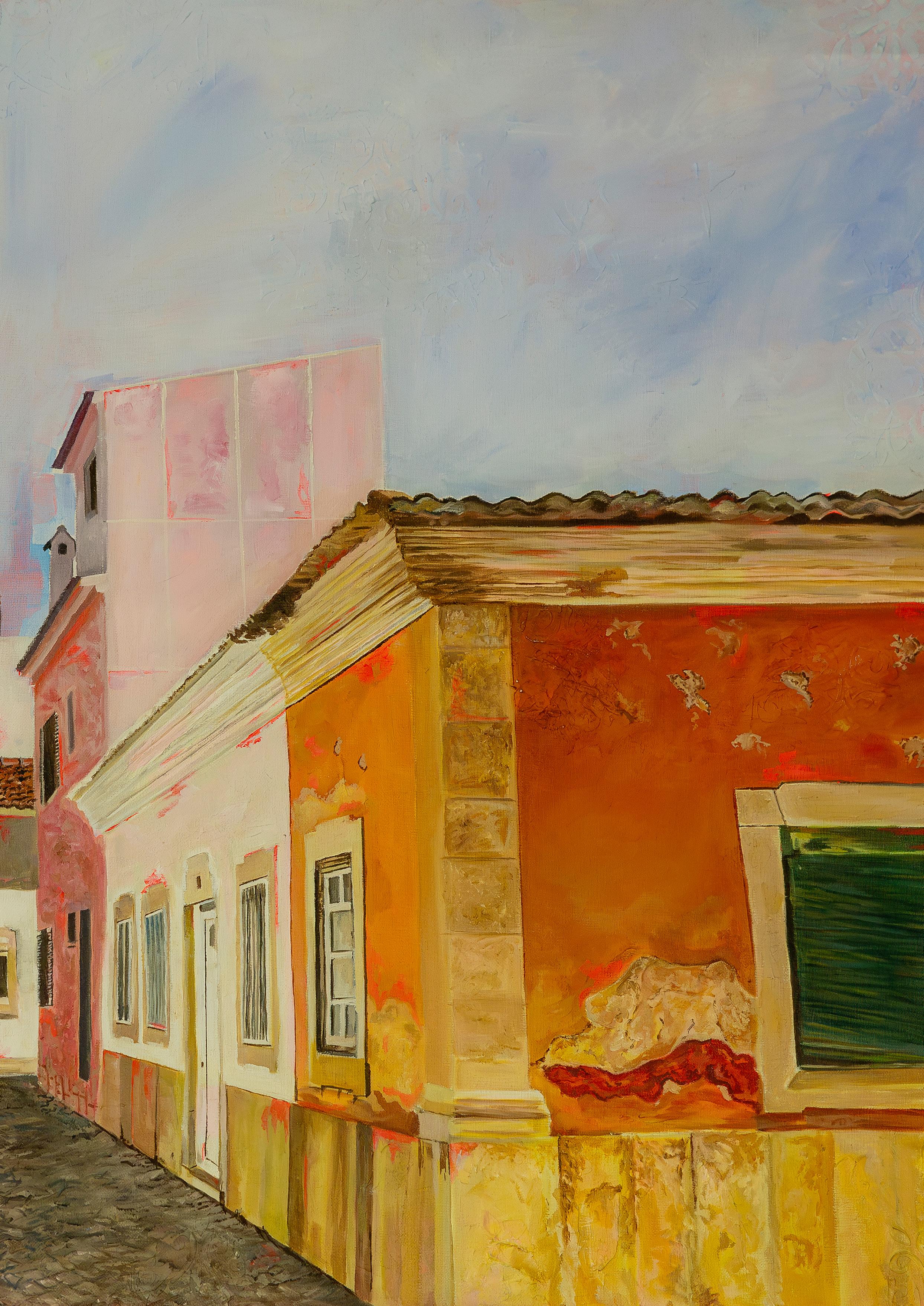
THE MAGAZINE OF THE KINGSLEY SCHOOL, ROYAL LEAMINGTON SPA






Having delved into this captivating chronicle of all that embodies Kingsley, I find myself reflecting on the journey of this past school year, filled with immense pride and gratitude for the remarkable individuals who shape our school into the extraordinary place it is. It’s no small feat to capture the spirit of Kingsley in print, yet the pages of 1884 certainly do justice to our vibrant community, offering a glimpse into the essence of life and work within and beyond our school walls.
As you turn the pages, you’ll encounter the rich tapestry of talents and interests that make Kingsley truly special. From the vibrant strokes of talented artists who infuse our world with colour to the captivating prose penned by our students and the inspiring feats of our sporting stars. Each individual, whether showcased in 1884 or not, adds their unique thread to our collective tapestry.
Within this issue you’ll discover insights into our dynamic curriculum, ranging from the innovative 4D Curriculum in our Prep School to the introduction of A-level Sociology in Sixth Form. Explore our partnership with 8billionideas, where real-world projects and experiential learning shape the minds of our students for lifelong success. Dive into the excitement of Science Week, where scientific exploration transcends the confines of the classroom.
Despite my relatively brief tenure at Kingsley, each moment has been brimming with excitement and discovery. We may be a small school, but our ambition knows no bounds, as evidenced by the myriad of opportunities showcased – be it our students’ adventurous Nordic Adventure or our participation in the Round Square conference in Kenya.
This issue also shines a spotlight on our thriving music provision, from our new Year 7 Instrumental Scheme to the harmonious melodies of the Foundation Symphony Orchestra. And of course, who could forget ‘Shrek the Musical’, a testament to talent, perseverance and the bonds of camaraderie forged through months of hard work and dedication!
This year we will be celebrating 140 years of Kingsley. On the alumni pages, we’re treated to a journey through time of our past birthday celebrations. We also learn all about alumna Molly, and how she literally has flown the Kingsley nest to the RAF, and law student and alumna Abi, whose brilliant paintings adorn not only the covers of this issue of 1884 but also our school walls.
When reflecting on the year, whether that be as a teacher, a student or a parent, one cannot help but feel proud to be part of such a dynamic, focused and creative community. I’m reminded of this beautiful quote that exemplifies Kingsley and our community at this time of reflection, celebration and future opportunity:
“Like branches on a tree, our lives may grow in different directions, yet our roots remain as one. All the flowers of all the tomorrows, are in the seeds of today.
Learn from yesterday, live for today, hope for tomorrow.” (Anonymous)
Thank you for being a part of our journey thus far and of our bright future.
Dr Sarah Howling
44 The Battle for True Self
An A-level Photography investigation
46 Bonjour Tristesse Une dissertation en français
48 What is Sociology?
A recent addition to our A-level offering
50 A-level Fine Art
52 The Dream Team
Our Sixth Form Leadership Team reflects on a busy year
38 Supporting Our Community Volunteering, Santa Dashing and more!
40 GCSE Fine Art 42 LEARN. TO FLY Capturing all that is special about
54 Studying Abroad
Why more and more people are studying abroad post-18
56 Equestrian
The latest updates
58 Flying High
An interview with Prep skiers, Isabelle and Grace
60 A Love of Sport
Meet Year 9 students Amy, Angelina, Amelia and Lottie
62 Talented Athlete Programme Supporting our most committed and talented student-athletes
64 Emily’s Musical Journey Emily, Year 5
66 The Year 7 Instrumental Scheme
Introducing our exciting new scheme
68 Foundation Symphony Orchestra
Bringing together the Foundation’s most talented orchestral musicians
70 Nativity the Musical Lottie and Buddy take to the Bridge House stage
72 Shrek the Musical
A Senior School production
74 Happy Birthday to Us! Reflecting on anniversaries of the past
78 Molly Flies the Kingsley Nest
Alumna Molly joins the RAF
82 On the cover
Welcome Back, Abi!
Talented artist and law student Abi returns to Kingsley
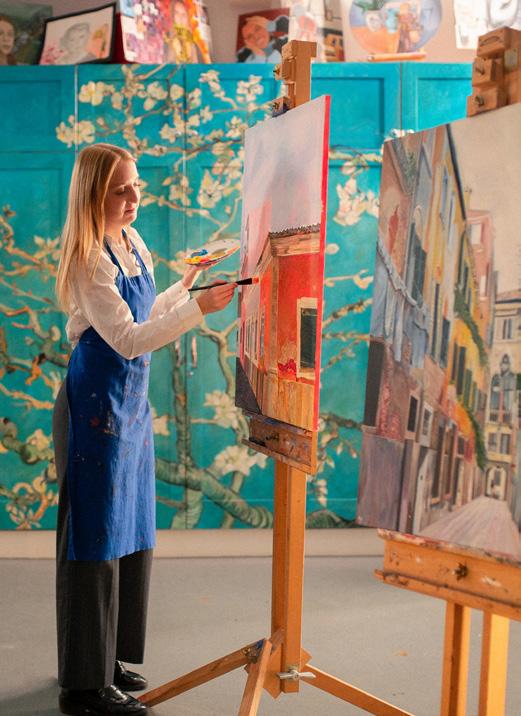
86 Kingsley Memories
Alumni share some favourite memories of their school days
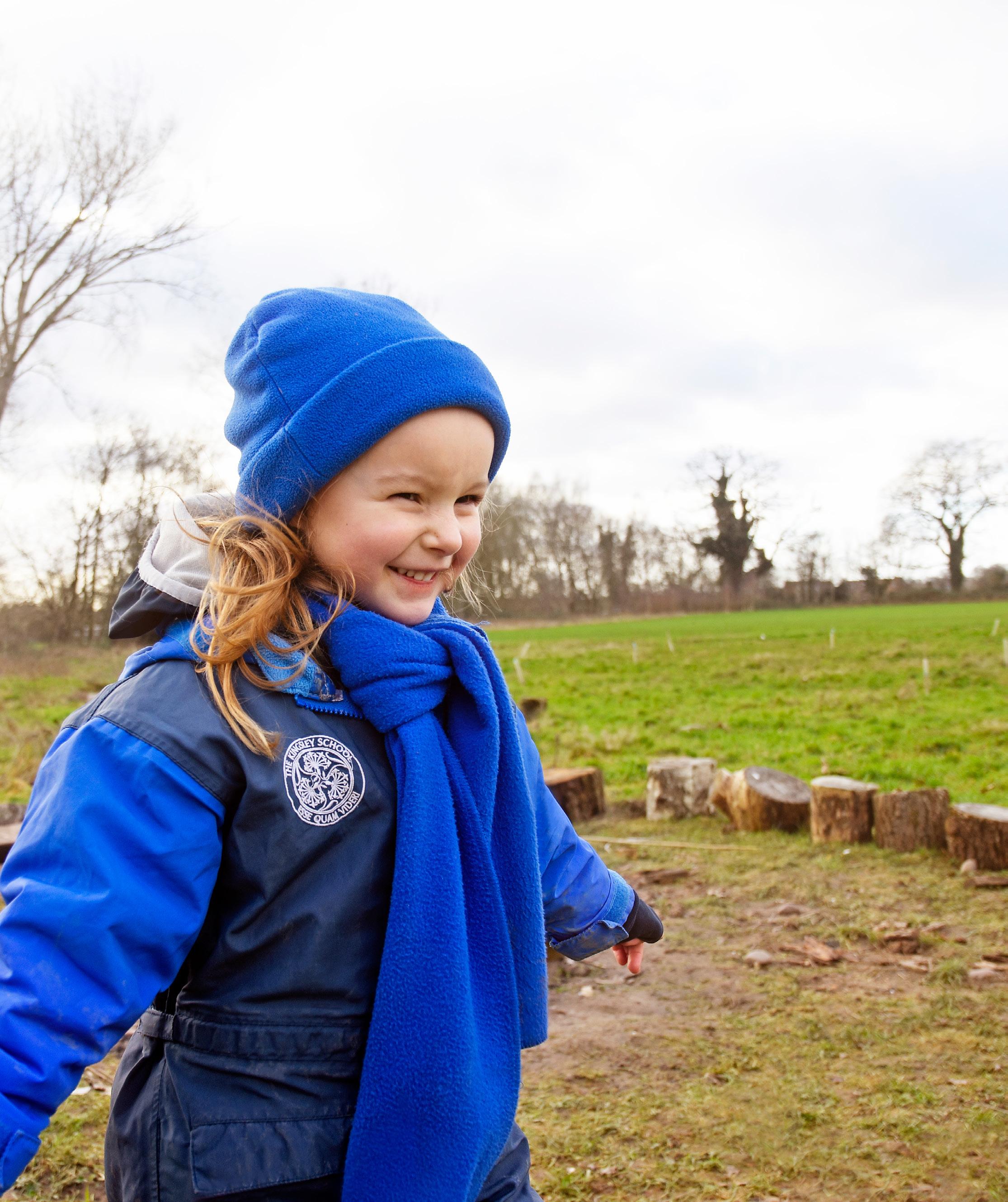
“Children in the EYFS are fiercely independent and highly skilled in leading their own learning.”
ISI, February 2023
We were delighted to read the quote opposite in our most recent ISI Inspection report. What a fantastic accolade! If our youngest pupils – at just three, four and five years of age – are ‘fiercely independent’ then this surely provides the perfect launchpad for their journey through the Prep School and beyond.
It goes without saying that children become increasingly independent as they develop life skills, a process that is closely linked to the pedagogy of active learning. Our Little Aviators Pre-school provides a carefully tailored environment in which pupils begin to build these skills through stories, role play, discussions, situation analysis and problem solving. By the time they reach Reception, they are actively engaged in their own development.
Life skills can loosely be grouped into three categories, which complement and reinforce one another:
As our EYFS pupils engage, play and grow with their classmates, they develop a range of interpersonal skills. They learn to listen, pay attention, share toys and ideas, negotiate, work together as a team, and express their feelings. These skills form the foundation of their character development, enabling them to build stronger relationships and deeper friendships, and develop empathy and compassion. Being part of a throughschool means that our EYFS children interact with pupils of all ages. Our older girls and boys are fabulous role models and it is heartwarming to see them chatting and laughing with younger pupils during break and lunchtimes.
Our EYFS Curriculum is designed to give pupils countless opportunities to take on roles, engage in open-ended play, build models and structures, and explore resources independently. This kind of experimentation helps children to develop their critical thinking skills. Equally important are physical sports and games. Pupils are encouraged to challenge themselves in their weekly PE and swimming lessons, taught by specialist staff who have the expertise to help pupils

reach their full potential. EYFS pupils also spend a whole day each week at our dedicated Forest School site, where they have the freedom to explore and take measured risks. Instead of fearing failure, they quickly learn that mistakes are an essential part of the learning process, and enjoy using their problem solving skills and creativity to adapt what they do and reach their goals.
Children feel a huge array of emotions, just as adults do – excitement, happiness, joy, anger, fear and anxiety, amongst others. By teaching coping skills, we can help them recognise and take control of these emotions, calm themselves and, ultimately, feel happier. Our EYFS pupils start each day by self-registering and choosing an emotion to add to their name card. Their teachers play an important role, taking the time to acknowledge their emotions and initiate healthy conversations. If a child is feeling upset, frustrated or angry, why are they feeling that way? What might help them feel better? Do their classmates have any suggestions? Small class sizes really facilitate these discussions; more time can be devoted to addressing individual needs, and the atmosphere is a supportive one in which pupils feel comfortable sharing their thoughts and feelings.
With a strong foundation laid in the early years, our youngest learners are equipped with the skills and confidence to navigate their educational journeys with enthusiasm and determination. As they engage in active learning experiences that foster social, cognitive and emotional development, they are well on their way to becoming resilient individuals capable of facing life’s challenges. The Prep School’s collaborative environment, supported by caring teachers and peers of all ages, cultivates a sense of belonging and empowerment, ensuring that each child’s unique talents and abilities are nurtured to their fullest potential.
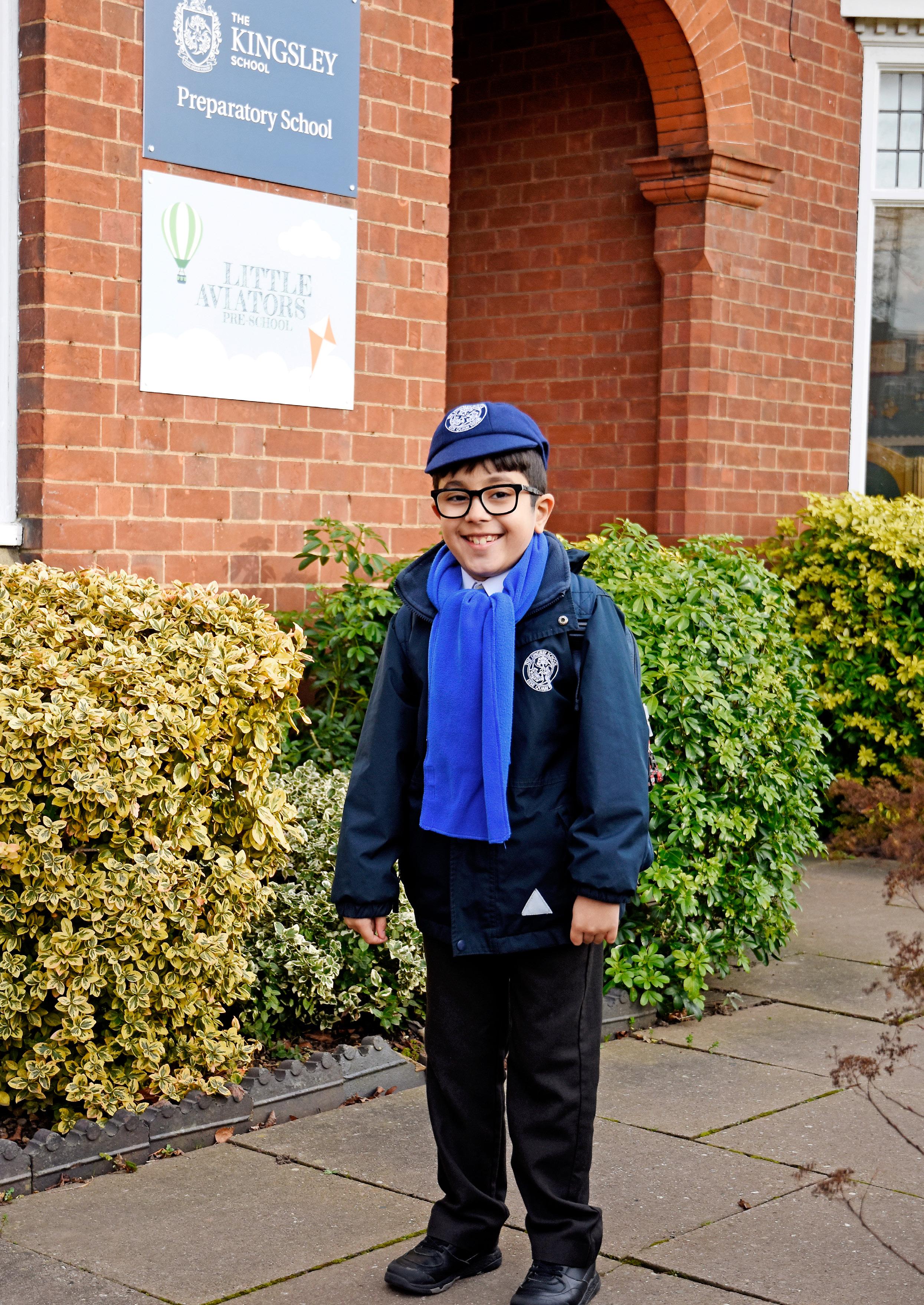
In January, we were invited to spend a day with Year 4 pupil Ashwin and his class. We were very excited and it didn’t disappoint! When you have a spare 10 minutes, grab a drink and a comfy chair, scan the QR code and watch the video. In the meantime, here are some of the highlights...
National Winnie-the-Pooh Day
To mark National Winnie-the-Pooh Day, Mrs Phillips, Head of Prep, delivered a heartwarming assembly about friendship. After sharing one of her favourite Winnie-thePooh stories, she asked pupils which of the characters they could relate to, and which were most like their friends. There were several self-confessed Tiggers in the room and, not surprisingly, lots of Owls!
Number Crunching
In maths, Ashwin was learning to multiply and divide by seven. Mrs Holmes taught the class some very clever methods, using their two and five times tables to help them answer the questions on their worksheets.
LAMDA
Ashwin attended his weekly LAMDA (London Academy of Music and Dramatic Art) lesson with specialist teacher, Mrs Vallance, and two of his classmates. They were studying ‘The Folk Who Live in Backward Town’ – a very funny poem by Mary Ann Hoberman. They began by reading the poem aloud, focusing on projecting their voices and adding lots of expression. Once they had mastered their lines, they discussed their ideas for acting them out and gave a highly entertaining performance. Bravo!
Crescendo!
Working in a small group, Ashwin had great fun performing crescendos and decrescendos. He was very good at controlling his drum playing, going from loud to quiet and then quiet to LOUD! Mrs O’Reilly also played a piece of film music and asked the class to listen out for crescendos, decrescendos and repetition.
Winter Poems
Time for some creative writing, but first a walk around Christchurch Gardens to find inspiration for their winter poems. As Ashwin ran his hand through some long, brown grasses, he remarked: “They’re not dead, they’re just hibernating.” He also commented on the trees that had lost their leaves and some snowdrops. On returning to the classroom, classmate Rosie wrote: ‘It was around 11 o’clock and I saw clouds, they were in a flock. The trees stayed firm in the breeze.’ What a great start to your poem, Rosie!
For science, the class headed over to the Senior School to learn all about how water changes state. Using a Bunsen burner, their science teacher, Miss Knight-Adams, melted some ice and heated the water until it evaporated. Ashwin was very interested in the experiment and followed Miss Knight-Adams’ safety instructions carefully. He wrote about the experiment and drew a scientific diagram in his book.
After a delicious lunch, Year 3 and 4 pupils travelled to Forest School on the minibus. Their topic for the term is ‘Caring for Nature’. Forest School Lead, Mrs Norris, explained that, during winter, animals and other creatures can struggle to find food and shelter. Ashwin and his friends decided to build a shelter for mice and rabbits. They made the structure out of sticks, using techniques they had learned in previous sessions (such as square lashing), and lined their shelter with grass. It looked very cosy by the time they had finished!
Back at school, Ashwin enjoyed enrichment – an opportunity to spend time with pupils from other year groups, learn new things, and have lots of fun in the process. Ashwin’s chosen club, ‘Deconstructors’, took place in the Prep Innovation Station. Equipped with spanners and screwdrivers, the children set to work taking apart old DVD players and other electrical items to see what they could find inside. The room was a hive of activity, and Mrs Hayward and Mrs Phillips shared some interesting facts about the different components and their functions. The pupils were excited to take some of the components home to show their families!
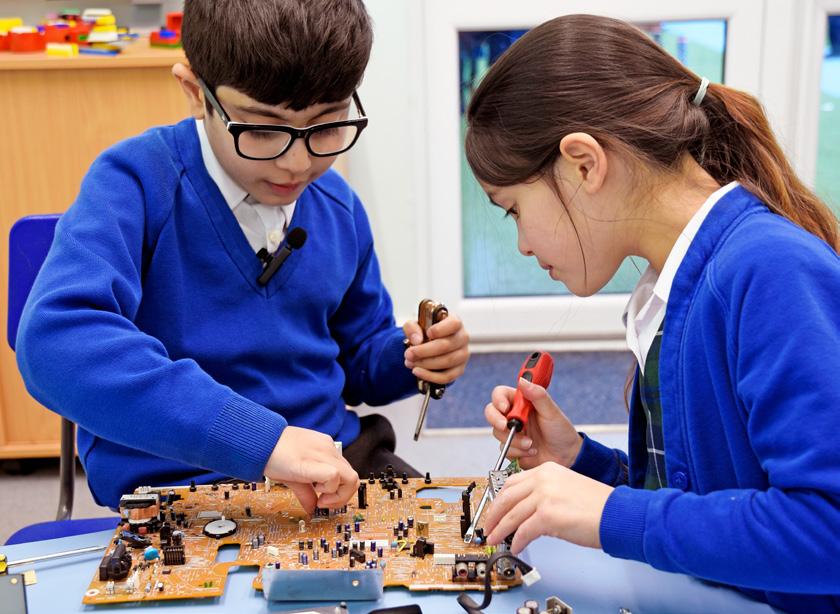

“Okay everybody, in we go!” yelled Rose. Rose was a chestnut mare girl and she was also the leader of the herd. As everyone galloped in, I did a steady trot. Sometimes my friends say I should be a riding pony, but I’m actually only half-pony so I don’t understand why they would say that.
I halted right before the forest and looked at the vista before me. “That’s huge,” I whispered. I thought that I might just canter across the lush, green fields and started to turn back when I heard, “Don’t be a scaredy-pony! I’ll go in with you!” It was my best friend, Shelby, who had trotted alongside me without me even noticing. With some hesitation, we walked slowly into the forest together.
Suddenly, a dark green roof seemed to envelop our heads as we entered the leafy domain. Even though my heart was racing, everything seemed fine and we started to chat: “By the way, you are looking really smart today, that shirt really suits you. Where did you get it from?” asked Shelby. I didn’t get chance to reply because we heard something or someone talking. “That must be them,” whispered Shelby.
We cantered in together, feeling really anxious. Then, directly in front of us, we saw a head – not a human or animal head, but a strange bear-like head. “Everyone leave!” Rose cried. She sounded very frightened. I heard a loud and angry “ROAR!” I frantically galloped away, but Shelby was calling me back as she thought it was a game. While Shelby galloped further into the forest, I trotted in the other direction. Then, I heard screams and I saw that Shelby, Rose and my little sister had been trapped by the bearlike creature. It was now growling ferociously.
I galloped for dear life and finally got out of the forest. I needed help, but what could I do when the emergency services were on strike? Surely someone must answer if I call 999? I grabbed the telephone and a strange sounding operator asked which service I needed. I replied that I needed the police. There was what seemed like an everlasting pause, then I heard some strange whirring sounds and the voice boomed, “This is the Iron Man, saviour of Earth, speaking. Tell me what your problem is and I will help you…”
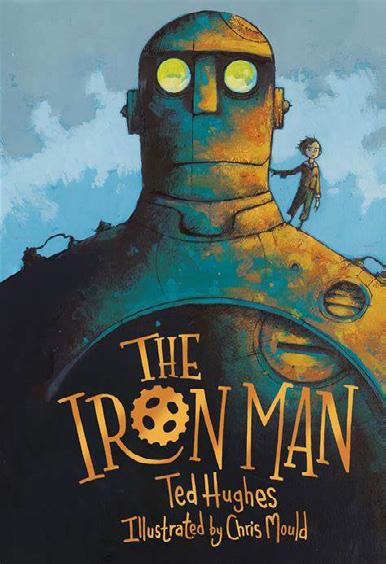
Year 4 pupils have enjoyed taking inspiration for their creative writing from their class text, ‘The Iron Man’ by Ted Hughes. They were asked to write about the Iron Man’s next adventure, developing a new character who either challenges him or needs his help. Pupils also had lots of fun putting together menus for an Iron Man Café, adapting some of their favourite dishes into metal-based courses. Belle’s menu on the opposite page is brilliantly imaginative, although we hear it’s received mixed reviews on Tripadvisor!



Following extensive research and planning, we were thrilled to launch our new 4D Curriculum in the Prep School this year
Designed to prepare pupils for future success, the new 4D Curriculum is built around the key skills that will stand them in excellent stead during their school years and beyond. It embraces a wide range of social and environmental themes, and has been carefully constructed to encourage an early awareness of diversity, inclusivity and sustainability. It also reflects the central values (or IDEALS) of Round Square: Internationalism, Democracy, Environmentalism, Adventure, Leadership and Service. We are proud to be part of this vibrant network of like-minded schools, which supports young people in over 50 countries to become well-rounded and well-informed global citizens.
Our 4D Curriculum topics, each lasting a term, run across the whole of the Prep School, allowing for the sharing of experiences and assemblies. Pupils enjoy projects based on real-life scenarios, making links between subjects and themes, and building their understanding of the world. To launch their topic for the spring term – ‘Into the Unknown’ – pupils enjoyed an immersive planetarium experience, taking an epic ride through space in search of answers to some of their biggest questions. Does life exist on Mars or in other galaxies? Exactly how big are stars? What will NASA do when it next visits the moon? The experience left pupils buzzing and eager to dive into their new topic.
The school has recently established a partnership with the award-winning ‘8billionideas’ – a fast-growing start-up, whose enthusiastic team deliver hands-on workshops and challenge packages that empower pupils to develop their own skills. In January, pupils took part in an inspirational workshop, developing their digital fluency, team-working and entrepreneurial skills. They also gained an excellent insight into the journey from innovative idea to final product.
The Prep School’s extensive Enrichment Programme complements and extends the curriculum. Pupils can choose from many different activities: first aid, horse riding, yoga, debating and STEAM club, to name just a few. Forest School sessions offer plenty of freedom and opportunities for 4D learning too. Our passionate and highly experienced Forest School Leader has devised a varied and enriching programme of activities for children in Little Aviators all the way through to those in Year 6. The benefits of Forest School are numerous; having access to an outdoor environment that promotes independence, self-esteem, creativity and confidence is an essential element of the provision in the Prep School. Research has shown that outdoor learning positively impacts children’s social skills, language, motivation and concentration, as well as developing their physical capabilities and connection to nature.
Sport is highly valued at Kingsley, with Prep teams entering and performing well in local and national competitions. From an early age, pupils are encouraged to try a wide variety of disciplines, leading to a genuine love of sport and success in netball, rounders, tennis, skiing, martial arts, gymnastics and rugby. Read more about Prep skiers Grace and Isabelle on page 58. Kingsley also has a long and successful history of competing in equestrian events, with an excellent riding squad and pupils as young as eight competing at a senior level (more on page 56). The expansion of sporting facilities across the Warwick Schools Foundation will enable us to increase our offering to include sports such as cricket and golf, which are seeing a surge in popularity amongst both boys and girls.
Alongside one-to-one tuition, our young musicians have multiple opportunities to practise and perform with others in string ensembles, orchestras and choirs. Read more about Prep flautist and pianist Emily on page 64. Gifted musicians are invited to play alongside their counterparts from the other Foundation schools in the Warwick Schools Foundation Orchestra. It is a joy and a pleasure to be part of a Foundation that is so inclusive, dynamic and open to change. At Kingsley, and throughout the wider Foundation, there is a firm understanding that pupil experience is top of the agenda. In order to provide the best preparation for future success, there must be wide-ranging opportunities, innovation, the flexibility to achieve the best outcome for each individual pupil, and a resolution from staff to consistently uphold and achieve excellence in all these areas.
The inspectors from ISI were quick to pick up on the strength and benefits of our commitment to a multifaceted and future-focused approach to learning, commenting: “Pupils’ communication skills throughout the Preparatory School are outstanding. Pupils describe their school as a family; their inclusivity and tolerance towards others is excellent. All groups of pupils have highly developed knowledge, skills and understanding.”
The launch of our 4D Curriculum marks an exciting new chapter for the Prep School, positioning our pupils for future success with a robust foundation built on essential skills and values, alongside academic success. Against an ever-changing backdrop, we remain committed to shaping confident, capable and compassionate individuals who are prepared to make a positive impact on the world.
Dear Sir/Madam,
I hope you find this letter in good time. My name is Sofia and I am a pupil in Year 5 at The Kingsley Prep School. I am writing to you because Year 5 have some amazing ideas that we believe could help the UK Space Agency discover our closest neighbour, Mars.
Firstly, I would like to propose a fantastic idea that could help discover more of our mysterious planet, Mars. Our uninhabited neighbour is still largely unknown to humankind. By us working together, we could inspire future scientists and engineers, like me, to make extraordinary discoveries.
Now let me share my ideas for a discovery rover and space suit. The Mars rover I have in mind is designed to be unique. It will be exposed to the wind so it will have claws that anchor it to the ground to keep the samples safe. In addition to this, there will be a camera on the head of the rover that takes thermal images. The Red Planet has been seen to have small amounts of water. The rover could come across puddles and get stuck, so to prevent that happening it should be able to float.
I also have a fantastic idea for a revolutionary space suit that could improve the safety of an astronaut exploring Mars. In the unforeseen circumstance of a tear, it would be a useful idea to have an under-layer that would fix the tear. I also think that the technology could be better so that communication is easier to understand.
I am excited to hear your thoughts for my proposals and thank you for reading this because I think it could help the UK Space Agency make extraordinary discoveries.
Yours sincerely,
Sofia
As part of their 4D Curriculum topic, ‘Into the Unknown’, Year 5 pupils have been learning about space. The colourful pastel drawing above, by Hattie E, is inspired by the work of Peter Thorpe, an American illustrator and designer who produces striking pictures of rockets and outer space. Sofia J has been busy writing to the UK Space Agency to share her ideas for exploring Mars. Her revolutionary space suit and Mars rover both sound very promising – she has clearly been doing her research!
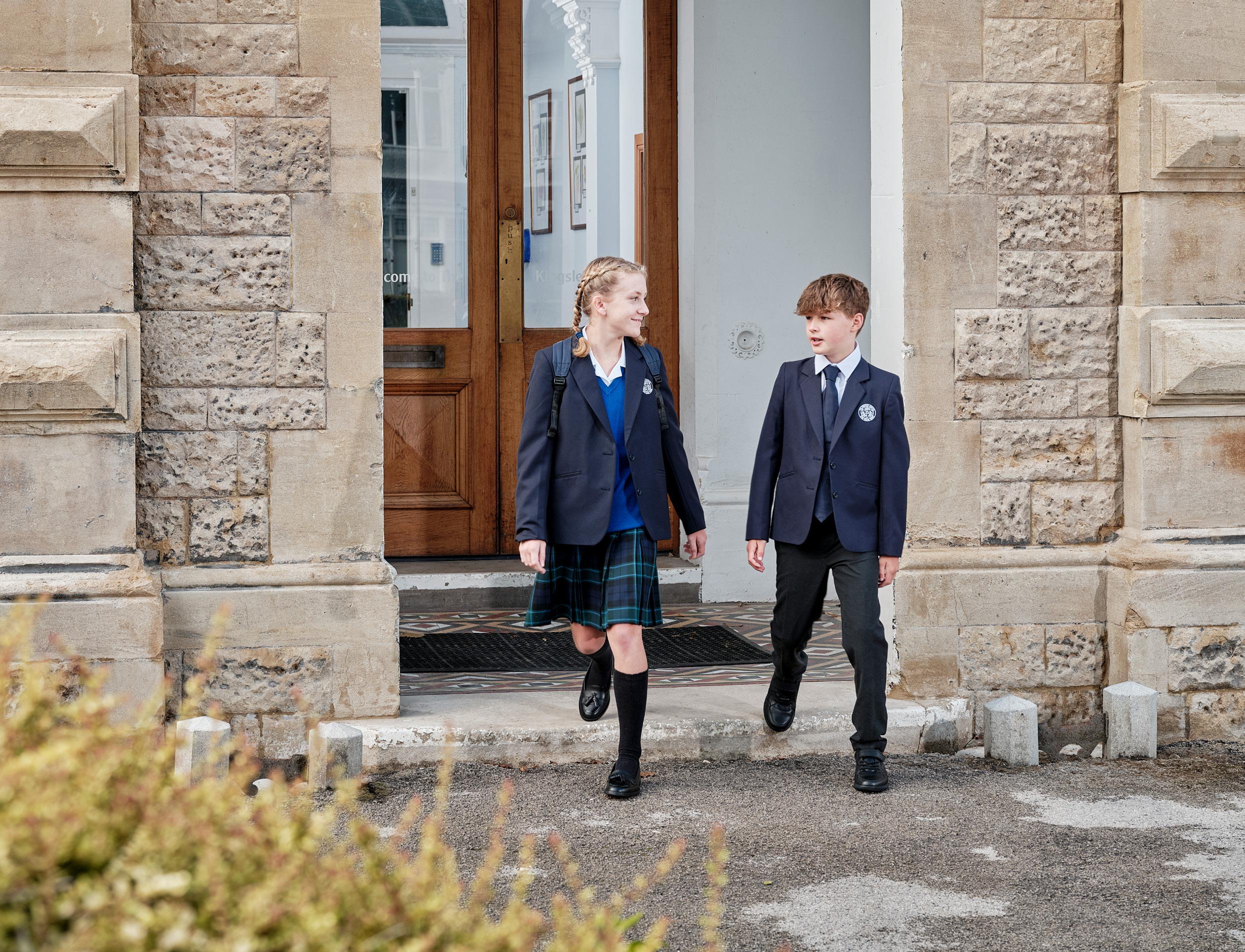
Our values are universal, and as important for boys as they are for girls.
In September, we announced our exciting plans to extend co-education into the Senior School and Sixth Form
Since its foundation, our co-educational Prep School has educated, nurtured and inspired many generations of boys. From September 2025, boys will be welcomed into the Senior School and Sixth Form, initially into Years 7 and 12. The Senior School will be fully co-educational by September 2029, and the Sixth Form by September 2026, making Kingsley the only selective, fully coeducational independent school in the Warwick Schools Foundation family.
So what will a fully co-educational Kingsley look like? Well, first and foremost, our unique ethos and values will remain the same, and will continue to set Kingsley apart. Our values are universal, and as important for boys as they are for girls. It goes without saying that all children, regardless of their gender, benefit from being educated in an environment where they are treated as individuals – an environment that fosters their own interests, supports their personal growth, and recognises and celebrates their unique talents. What’s sometimes less widely recognised, but we know is important to current and prospective families, are the results our students achieve in their public examinations; individually, these are exceptional, and collectively, our students’ achievements outshine those of many other independent schools, including locally. Through extending Kingsley’s offering to boys as well as girls, all pupils will benefit from a Kingsley education and from being part of the wider Foundation.
In preparation for September 2025, we have established a Student Transition Group made up of individuals from Years 6 to 12 who meet regularly to discuss ideas and key considerations. Topics that have been covered so far include rules and routines, uniform, lessons and the curriculum, facilities and pastoral care. Our students have shared valuable insights and lots of fabulous ideas for ensuring a smooth transition into Senior School and Sixth Form for both boys and girls. These have been shared with the rest of the student community during whole school assemblies, and incorporated into our wider strategic plan.
We have also established a Staff Transition Team, led by Mrs Morgan – a highly experienced member of our Senior Leadership Team. Dr Smith (Equality, Diversity and Inclusion Lead) has been working closely with the team on the considerations required to ensure equality in education, Mrs Warrillow (Head of Physical Education) on plans for extending our sports provision, Mrs Hughes O’Sullivan (PSHE Lead) on the legal and moral considerations for teaching Personal, Social, Health and Economic education in a co-educational setting, and Mr Bucknall (Deputy Head Academic) on curriculum
modelling. Other staff members will be invited to join meetings over the coming weeks and months to share their insights and expertise.
Many of the staff at Kingsley have significant experience of teaching in co-educational settings, and all teachers gain co-educational experience as part of their training. But more than this, even, is our Foundation’s unparalleled experience in educating boys through Warwick School, which gives us a unique insight into ensuring both boys and girls flourish – academically, pastorally and through our co-curricular programmes.
Lots of work is going on to forge and cement our excellent local partnerships, including with primary feeder schools. Pupils have enjoyed sporting events hosted at Kingsley, such as tag rugby, and we hope to extend these so that our facilities can be enjoyed by more people in the community. We are planning some exciting events to mark the school’s 140th birthday. Further details coming soon!
At the start of the academic year, we also announced our ambitious development plans, which will support us in expanding our co-curricular programmes for all of our students. Following a space audit, and in consultation with students, staff and parents, plans are well underway to redevelop the garden and Learning Resource Centre in Senior School. We are delighted to be working with global education design consultancy Noble + Eaton, who have an outstanding reputation for creating thriving spaces for forward-looking schools and their students. Physical works are due to start in the summer, with further developments planned to the hall and gym. In September, we also unveiled ambitious investment plans for our 17-acre sports fields. Phase one of the works – the refurbishment of the existing netball and tennis courts, and the marking out of grass pitches for football, rugby and cricket – is now complete. Subsequent phases will see the extension of the courts, the upgrading of the pavilion and parking facilities, and a new astroturf.
In January, we welcomed our new Headteacher, Dr Howling, who is as proud as we are of our wonderful school. As we work together towards ensuring we are a successful co-educational through-school, we also know that this will not be the defining feature of Kingsley. Creating a safe and inspiring space for all, and an educational, social and personal experience that produces happy, confident young adults, well equipped for the challenges of tomorrow, continues to be our top priority.
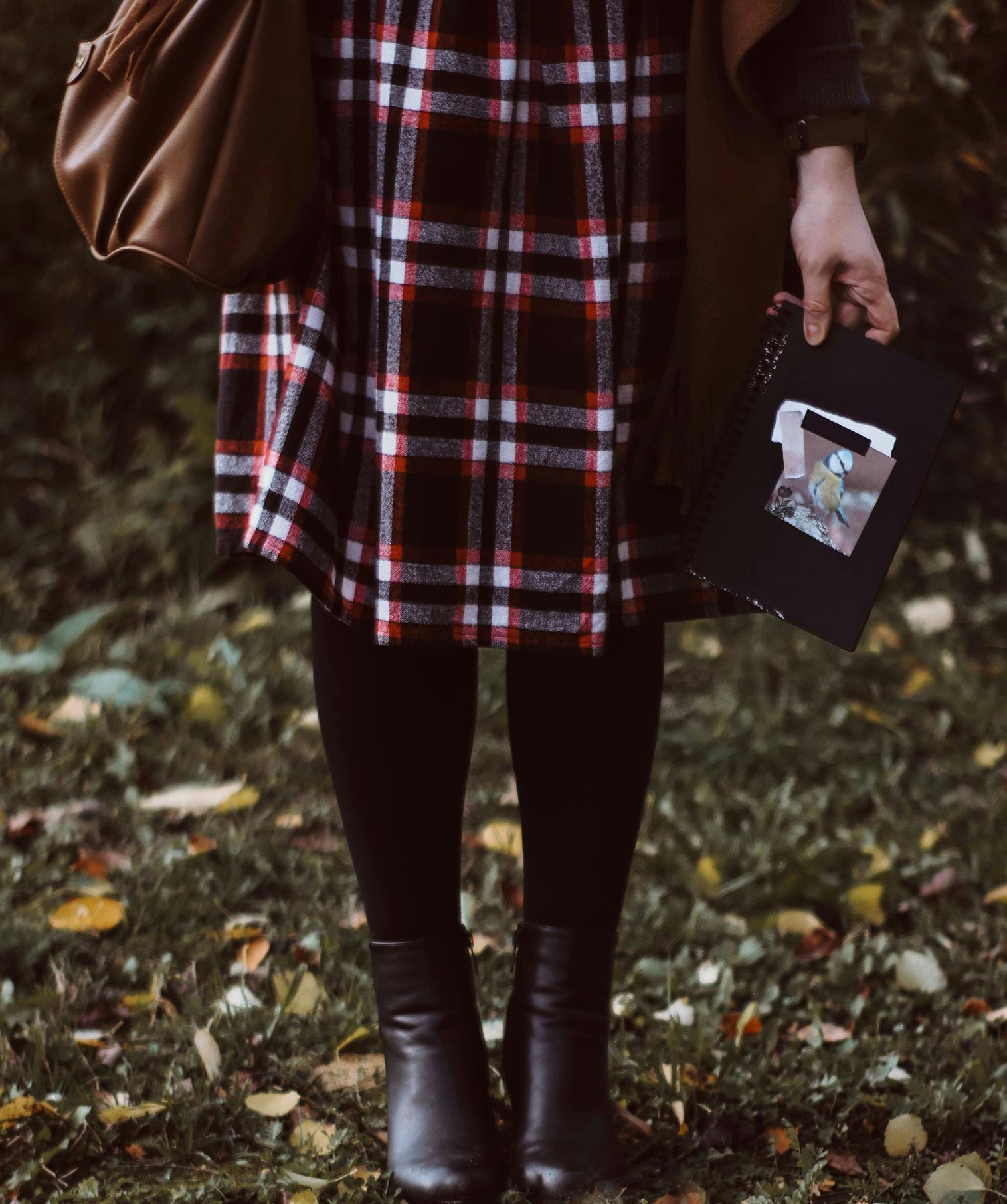
Colourful leaves formed a blanket for the landscape. Harvested fields extended, full of golden crops.
It was a melancholic autumn. There was a crunching sound underfoot as the children ran through the leaves. Their innocent laughter floated in the air with the autumn wind. The happiness of the families enjoying the autumn leaves together contrasted to the lonely, quiet soul in the distance.
A young man named Asher embarked on a journey to find comfort from nature and respite from his mother’s recent passing. He came to a breathtaking valley with a heavy heart. It was quaint, bucolic and picturesque, providing a serene escape for Asher.
The valley in autumn was like a picture scene unfolding. Colourful leaves formed a blanket for the landscape. Harvested fields extended, full of golden crops. The leaves changed colour, the migrating birds passed overhead, and flowering ivy added a touch of dreamy ambiance. Falling seeds drifted with the wind and the fungi peeked out, an autumnal picture in front of the eye.
As Asher strolled around the valley on the brisk morning, he noticed an enchanting young woman named Hazel; she had beautiful walnut hair and was sat on a bench beneath a maple tree. She held both sides of her book in her hands, and seemed completely lost in the story, occasionally making a crisp laugh. The breeze blew gently through her hair. Her mere presence had a profound effect on Asher.
As Asher and Hazel crossed paths, a strong sense of connection drew them to each other, just like a beautiful tale of love at first sight. Their love grew stronger with each passing day, like a chemical reaction they couldn’t refuse. They took a romantic stroll hand-in-hand, sharing their interests under the maple tree. They whispered their secrets into each other’s ears as leaves fell around them. At night they enjoyed the starry sky and snuggled close to each other. Love bloomed in their hearts.
One day, Asher accidentally knocked over Hazel’s bag, causing its contents to spill on the floor. When he bent down to pick up her belongings, he noticed something unusual – a photograph of himself and his mother, tucked between the pages of Hazel’s notebook. He was curious about how Hazel had got this photo. Curiosity
led Asher to look inside the notebook. As he delved deeper, he discovered the notebook contained all the details of his mother’s car accident, including the fact that Hazel was on the scene that day.
He shivered when he realised the truth. Hazel had been the one behind the wheel that day, driving under the influence of alcohol, and fled the scene out of fear and guilt. Asher was overwhelmed by mixed emotions –shock, confusion, betrayal, and profound distress. He realised that Hazel had known the truth all along, but she had kept it hidden from him and deceived him. She had made him think she was trustworthy and a person he could rely on, but it was a complete illusion.
With a heavy heart and mixed feelings, Asher confronted Hazel, his voice quivering and the photograph and notebook in his shaking hand. Tears welled up in Hazel’s eyes as she saw all the evidence in Asher’s hand. He asked her why she had kept the truth from him, and let him indulge in beautiful dreams.
Now, standing before Asher, Hazel was ready to face the consequences of her actions. She confessed her truth, admitting that she had come to his village to find his forgiveness. She knew her actions were unforgivable and wounded him deeply, but she could no longer live with the weight of her guilt. She knew, no matter what she did, that she could not make it up to him.
At this moment, Asher was torn between the love he had and the devastating truth. He made a difficult choice; he told Hazel that he couldn’t carry on their relationship and needed to spend time away from her. The trust between them had been shattered and the way to forgiveness was uncertain.
Asher walked away, leaving behind the photograph and the notebook, and the girl who had once seemed like a beautiful dream. It was a melancholic autumn, full of the wrong notes in the music, full of chaotic sounds and getting heavier.
During the spring term, our Year 7 and 8 Book Group took part in the 2024 Warwickshire Secondary Book Award, run by the Warwickshire Schools Library Service (WSLS). This is an annual event, and Kingsley students usually enjoy getting involved. The experienced library team at WSLS carefully selects a shortlist of six books, and students read them and vote for their favourites. The winner is decided solely by the students, which is what makes this award so much fun to be part of.
Schools from across Warwickshire take part and are invited to the Final Award Ceremony. This year, reading groups from 15 schools gathered, and three of the shortlisted authors were there in person to talk about their writing and answer our questions. Nathanael Lessore entertained us with funny stories from his youth, SF Said expanded our minds with talk of alternate realities, and Anthony McGowan discussed how the animal stories he loved as a child have influenced him to include animals in much of his own writing. We waited eagerly to hear who had won, and were delighted to cheer for Lily Bailey’s ‘When I See Blue’, which was one of our favourites, though we also greatly enjoyed ‘The Lighthouse’. We were excited to clap for Poppy, who won the student art competition!
The Warwickshire Secondary Book Award always delivers a good variety of style and subject on the shortlist, encouraging us all to read something we otherwise wouldn’t have. Discovering you enjoy a book you didn’t expect to is, of course, part of the joy of any good book group.




When Ben and his family move to London, he has to get used to a new city and a new school. At school, Ben tries to make himself invisible so that people don’t notice him. Then he meets a girl called April who is very nice to him. Ben’s mum takes him to a counsellor who thinks he has OCD because he has to do everything in 4s, or in multiples of 4. April and his mum help him with his OCD. When April mysteriously disappears from a school disco, it’s up to Ben to try and find her. I loved this book because I learned a lot about OCD. I knew it existed, but I didn’t know a lot about it.
Thea W (Year 7)





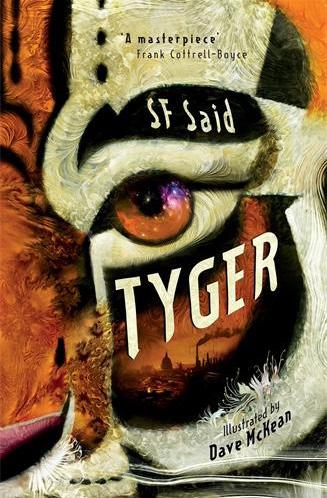








ALEX BELL
This book is about a teenage boy who loves to rap with his best friend, Shanks. When his live stream goes wrong, everything begins to fall apart, until he meets a new friend who helps him achieve his dream as a famous rapper. I really enjoyed this book because it was very funny and made me laugh. I would definitely recommend it to people who like stories about friendship. The book also has cool raps in it which made it exciting to read!
Niamh W (Year 8)
KWAME ALEXANDER
‘The Door of No Return’ is set in 1860 in West Africa, Upper Kwanta. The book is a verse novel. An eleven-year-old boy called Kofi Offin lives on the banks of Upper Kwanta. He loves the water, his family, the fireside tales of his grandfather, a girl called Anna, and swimming. But when a sudden death occurs during a festival between rival villages, Kofi ends up in danger. He goes on a terrifying journey, away from everything he loves. I really like this book because it follows the scary but interesting journey of a young boy’s life in West Africa.

Emily P (Year 8)

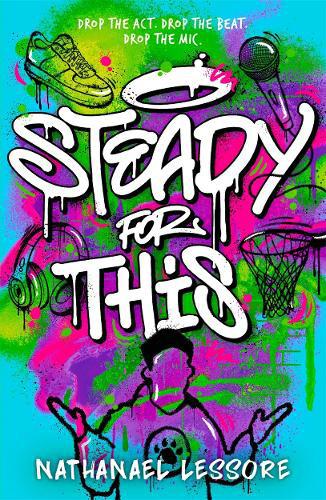



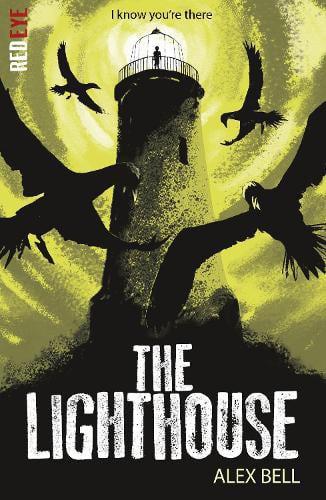
‘The Lighthouse’ is about two sisters who visit their father and his new wife and son on a mysterious island in the middle of nowhere. Of course, strange things start to happen that lead the main characters to discover the hidden story of the tiny island. This book is worth reading because it is both exciting and scary, and the characters are interesting. The ending is the best and leaves you wanting to know more. I would give this book 4/5.
Poppy T (Year 8)


TYGER
SF SAID







‘Tyger’ is about a foreign boy called Adam on the streets of London who meets a creature called Tyger. It is spelt this way because, well, let’s say this Tyger’s not normal! It’s an adventurous yet heartwarming story that keeps your eyes glued to the page. I would definitely recommend it to people who enjoy fantasy and action storylines. I personally think the ending is good, but there is room for improvement as it isn’t satisfying enough. But overall, this book is a great piece of writing.

Meera P (Year 8)






ANTHONY MCGOWAN


This book is about two wolfdogs, Misha and Bratan. The story begins with them and their mother and proceeds to them growing up when they have to live alone in the wild and keep away from predators. I really like this book because it has a sad and heartfelt storyline. I would recommend it to anyone of any age who is interested in a partially sad, but also adventurous and happy, story. I know that not everybody will enjoy the same book, but I would personally say try it and make up your mind at the end – you never know if it’s a good book until you’ve finished it!

Isla P (Year 8)

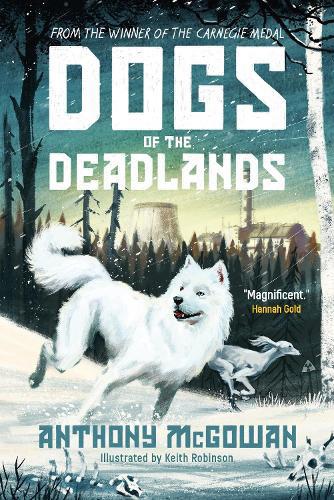





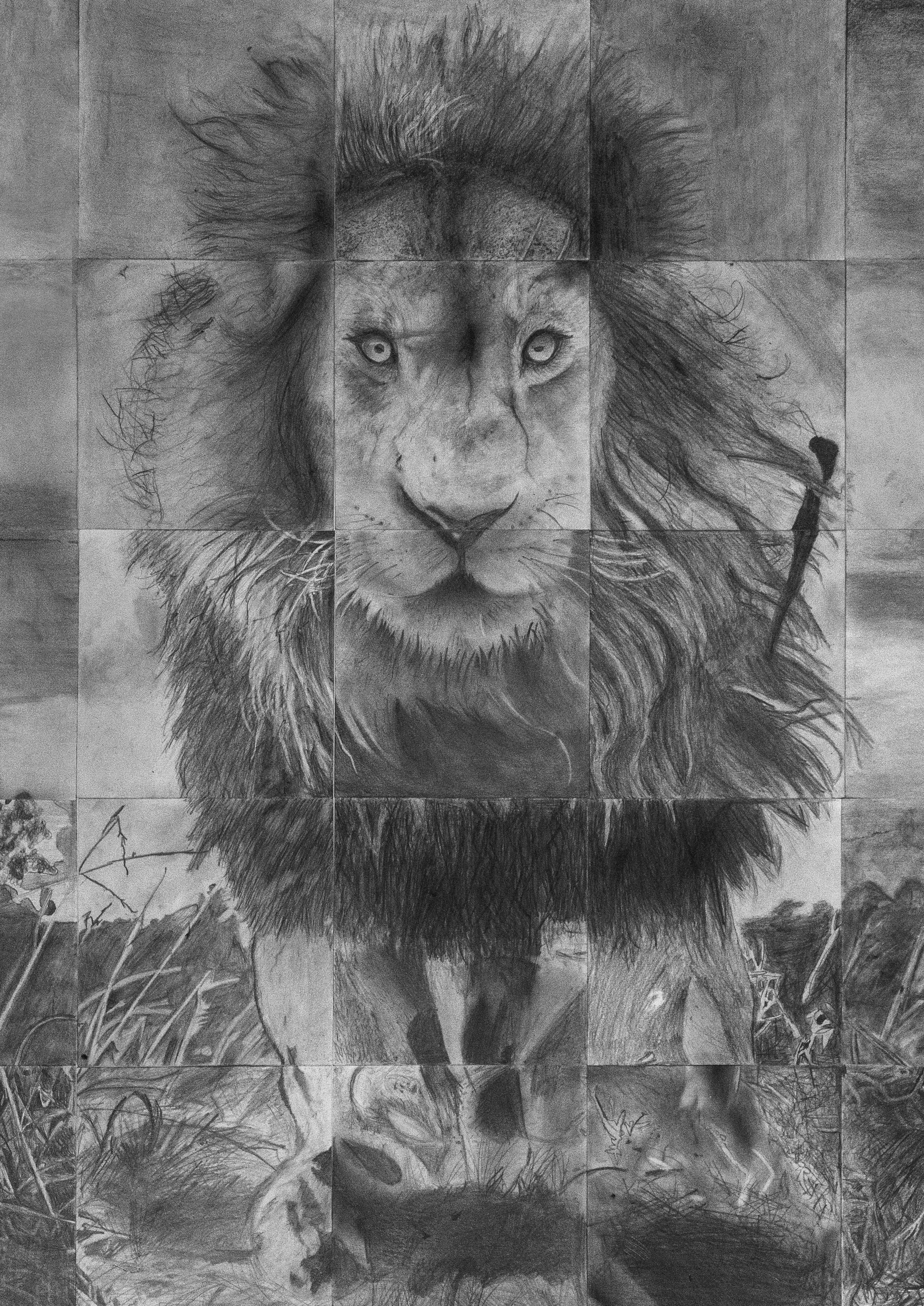
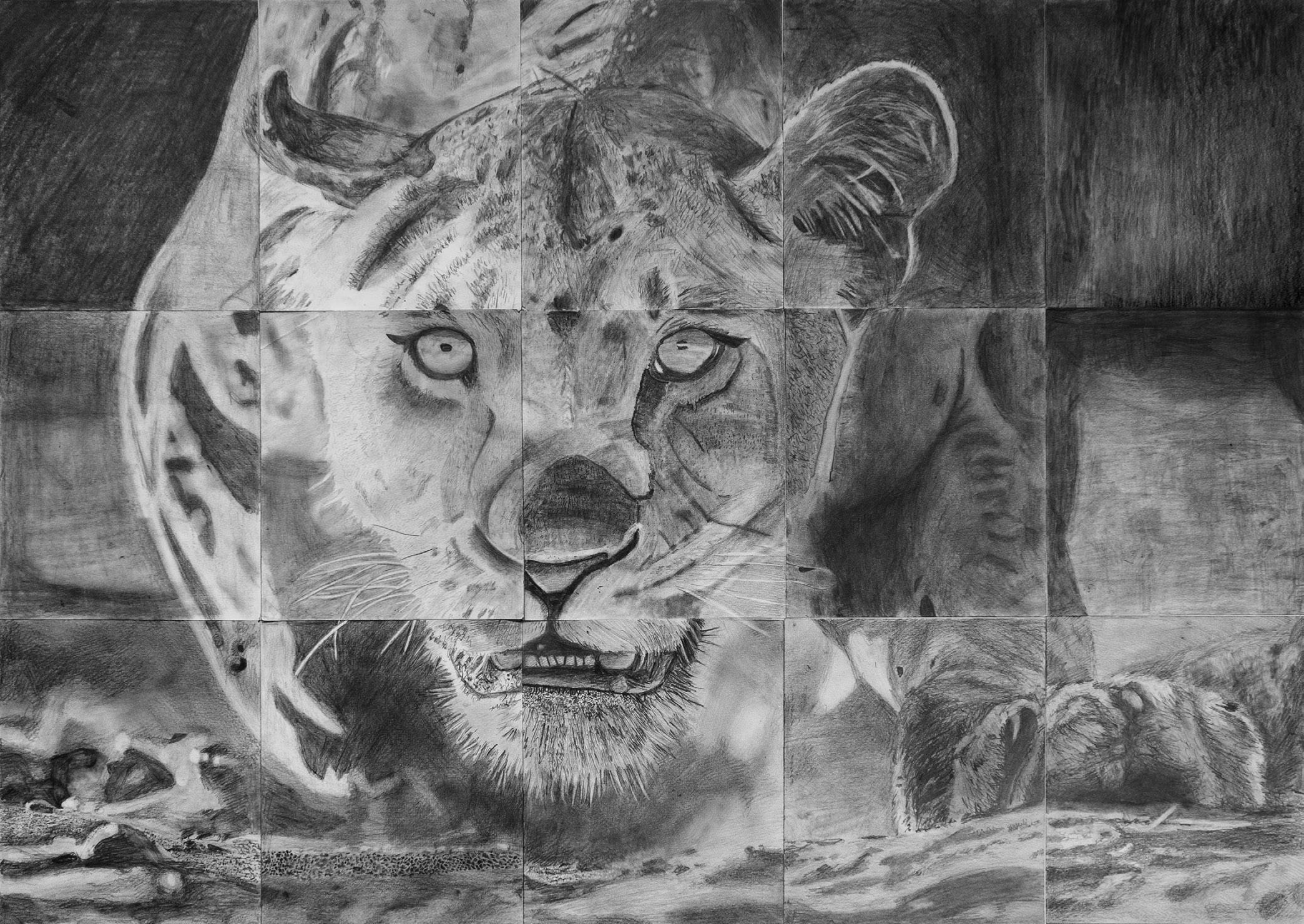
Year 7 students were set the challenge of working in their forms to produce a group drawing. This was after studying the use of tone and experimenting with drawing various objects. The project really put their skills to the test; they were encouraged to observe and replicate variations of lights and darks, avoiding the temptation to simplify their drawings. Whilst they worked on their sections independently, they came together to share tips and, most importantly, to ensure the different sections of the drawing aligned. They were very proud of the finished pieces and learned a valuable lesson – that you can achieve great things when you work together as a team! The lion is by Y7ES and the lioness is by Y7RF.
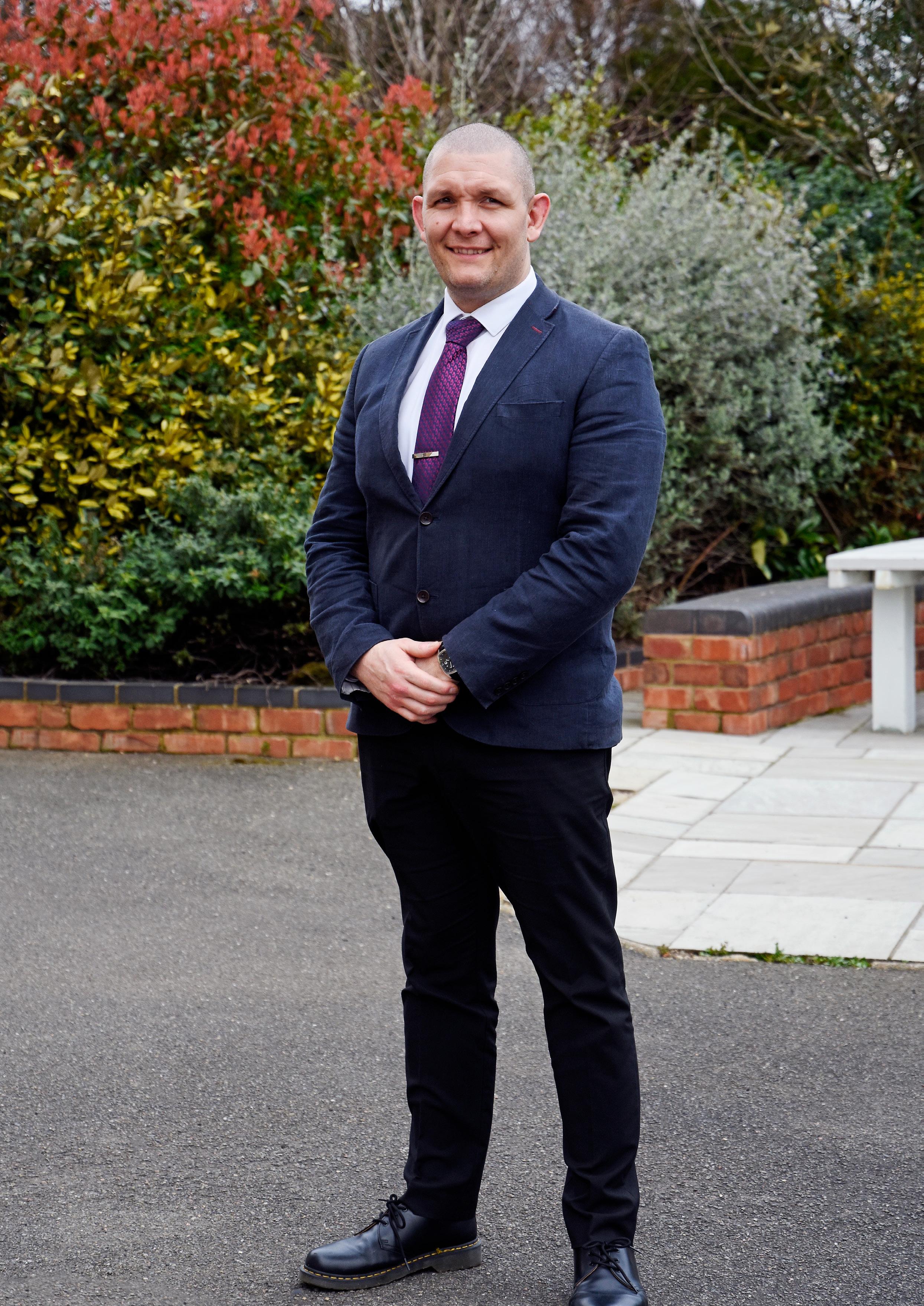
What is your role at Kingsley?
As Deputy Head (Academic), I’m responsible for making sure the school day runs smoothly, and that all students are supported in their learning and reach their academic potential. I also organise the co-curricular side of the school and teach history.
What qualifications do you have?
I have a BA (Hons) in Modern History, an MA in International Relations and a Post Graduate Certificate in Education with Qualified Teacher Status. I have also completed courses in Academic Management and I’m an RFU Level 3 qualified rugby coach.
When and why did you decide to become a teacher?
I decided to become a teacher in 2011. I was nearing the end of a 10-year career playing rugby and knew I had a lot to give back to young people learning the game. I also knew the transition from playing to coaching was a natural one; playing a team sport is all about communicating, discussing ideas and helping others to succeed, all of which are important in teaching. Initially, much of my timetable was dedicated to teaching rugby, but the emphasis gradually shifted to teaching history and politics, which are subjects I’m passionate about.
What were your initial impressions when you visited Kingsley for the first time?
That this is a very special place to learn, and a unique place to work. Kingsley’s ethos really shines through. It’s a community that looks after and supports one another, but also challenges individuals to be the best versions of themselves. It’s great to be part of this every day.
How would you describe Kingsley in three words? Inspiring, supportive, community.
What aspects of your role do you most enjoy?
I enjoy seeing the positive impact of learning at Kingsley. This might be witnessing a lightbulb moment in the classroom, or a sporting, drama or music performance. Our recent off-timetable work with 8billionideas has been truly inspirational as well. The future is safe in the hands of our young people who think outside of the box to solve problems. It is also amazing to see students grow and develop over time, sometimes in the short time of a trip. Students who attended the Round Square Conference in Kenya learned so much about themselves in just a week. Or it might be over a longer period of time, as students move from Key Stage 3 to their GCSEs, and then into Sixth Form and beyond.
What do you enjoy doing in your spare time?
Spending time with my family. We have a VW camper van and enjoy exploring new places, which might involve open water swimming, stand-up paddle boarding or hiking. I enjoy reading, whether that’s learning something new about teaching or history, or reading a thriller about an intriguing murder or conspiracy. I’m an avid podcast listener, but it’s important to be selective with these! I enjoy good quality podcasts about news and current affairs, history and rugby. I also like to cook and keep fit.
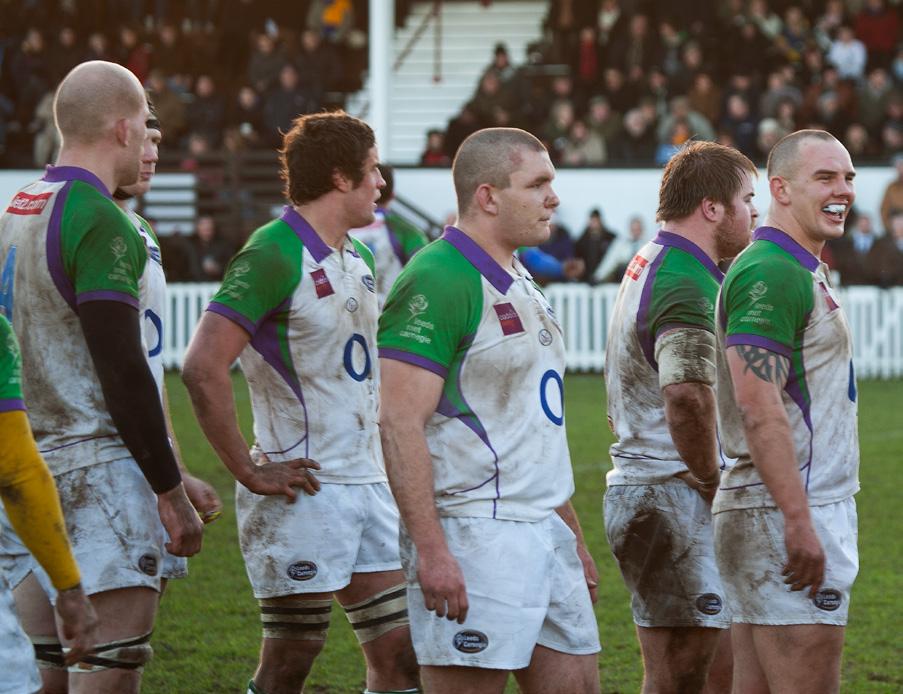
What items are on your bucket list?
I’d like to walk the Inca trail to Machu Picchu, and explore areas associated with the Aztec and Inca empires. I learned a lot about pre-Columbian and Spanish-American history at university, but I haven’t had the opportunity to explore the region and see the foundations of a civilisation that was so different to ours.
What’s your favourite food?
I like lots of different foods. I especially enjoy slowcooked meats; my favourites are a succulent brisket of beef, or a slow-cooked shoulder of pork, pulled and covered in barbecue sauce!
Do you have a favourite book or film?
‘The New Jim Crow’ by Michelle Alexander changed the way I think about US history and politics. The book is about how certain US states used mass-incarceration to achieve the same results that formal segregation laws had prior to 1960s Civil Rights legislation. It’s an eye-opening book which very convincingly argues that legislation on its own, without education, cannot change people’s prejudices. I enjoy reading books by Harlen Coben, David Baldacci and Andy McNab. It’s difficult to pick a favourite from these!
My favourite movie is ‘Gladiator’ with Russell Crowe. It’s a great story about democracy and how we must always fight to preserve it. In some ways, it reflects what’s happening in the modern world, with threats to democracy from those wishing to gain power and use it for their own ends. As Marcus Aurelius said in the movie, “There was once a dream that was Rome. You could only whisper it. Anything more than a whisper and it would vanish... it was so fragile.” Ridley Scott at his best!
On TV, I really enjoyed ‘Band of Brothers’ and ‘The Pacific’ – two HBO mini-series about key theatres of war in WW2. I’m looking forward to the school holidays so that I can watch ‘Masters of the Air’, the latest instalment in this franchise. And if all of that sounds too heavy, I’m not averse to watching something from the Marvel Cinematic Universe. There’s a lot I could say about how popular culture reflects politics and history, but to some (my children) this ruins the fun!

“The 8billionideas workshop helped me understand the concept of a sustainable city and why it’s so important to express your own creativity in projects.”
HarleenG, Year 9
In February, Year 9 and 10 students spent a day with the team from 8billionideas, taking part in an exciting enterprise workshop entitled ‘City Changers’. Over the past century, cities across the globe have become increasingly populated – a trend that’s set to continue into the future – leading to their rapid expansion and a whole host of issues around housing, transport, waste, energy, tourism and inequality.
The workshop began with a case study. Students learned about Dubai, where, in 2012, Sheikh Mohammed bin Rashid Al Maktoum, prime minister of the UAE and ruler of Dubai, announced a green growth strategy to ‘maintain a sustainable environment to support long-term economic growth’. Since then, numerous initiatives have been implemented to reduce Dubai’s environmental impact. As well as embracing renewable energy sources, sustainable water management strategies have been put in place, including desalination and wastewater recycling. There has been significant investment in green spaces, enhancing the urban environment and promoting a healthier lifestyle for residents. The UAE is also leading the way on the biodiversity front. For example, locally sourced clay has been successfully used in desert reclamation projects to stabilise sand dunes, prevent erosion and promote vegetation growth. The clay helps to retain moisture and nutrients, creating a more conducive environment for plant life to thrive. How clever is that?!
Feeling inspired, the students set to work in groups, making their own plans for sustainable cities. They were asked to focus on a small area or community, rather than an entire city, and on solving one particular problem, such as housing or energy. The school hall and gym were awash with mind-maps, with loads of great ideas being shared and written down. The groups were then asked to develop their initial ideas into more detailed designs. They were also encouraged to think about branding; could they come up with a catchy name, slogan and logo for their eco-community? The 8billionideas team introduced students to the concept of prototyping, an important step in the design process that gives entrepreneurs a sense of how their products will work, the materials they will use, and any changes that might be required. Students began by creating lo-fi prototypes – sketches of their solutions to help them visualise how their eco-communities would look and function. Before moving on to their hi-fi prototypes (more detailed, 3D models), they were asked to discuss and identify areas of their designs they could improve.
After a busy morning of collaborating, planning and problem solving, it was time to get started with building their final prototypes. A huge thank you to all of the parents who raided their sheds, garages and recycling bins to supply their children with modelling materials –we have never seen so many cardboard boxes, empty milk cartons, food packets and old newspapers in one room! Watching the piles of rubbish evolve into the most spectacular prototypes was a real feast for the eyes. In fact, it would have made a brilliant time-lapse video (next time, maybe!). The students added labels to their creations to annotate and expand on their key features. Each of the prototypes was entirely unique, and collectively they made one very large and impressive sustainable city. Our Marketing Team has been set the challenge of photographing the prototypes and finding a way for them to reach Sheikh Mohammed – we hope he finds them useful!
With prototypes and branding in place, the students researched changemakers who could take their ideas forward and make them a reality. Year 9 students Megan J, Isabella S, Evie J and Georgia S (pictured opposite) decided to write to their local MP with their ideas for managing overcrowding in cities. These included housing everyone in well-built apartments (which would also improve equality) and installing a cable car system to tackle congestion and reduce emissions. They also suggested planting shrubs on the roofs of the apartment blocks; not only would this enhance the aesthetics of the city, but it would also improve air quality and attract wildlife. At the end of the day, each group presented their ideas and received feedback from the 8billionideas team – a brilliant opportunity to practise their public speaking skills.
8billionideas is an award-winning education provider, whose mission is to give every young person the skills to change the world. Kingsley’s partnership with 8billionideas began at the start of the academic year, giving students of all ages – across Prep, Senior School and Sixth Form – the opportunity to engage in exciting events, focus days and community outreach programmes. Year 9 pupil Harleen G, who took part in the City Changers workshop, commented: “The 8billionideas workshop helped me understand the concept of a sustainable city and why it’s so important to express your own creativity in projects.” Kleis L (also Year 9) said she really enjoyed the workshop, commenting that it improved her team-working, problem solving and public speaking skills.


British Science Week is one of our favourite weeks of the year. Organised by the British Science Association, it aims to inspire people of all ages, including the next generation of scientists, to engage with the wonders of science and appreciate its significance in our daily lives. The theme for 2024 was ‘Time’, providing plenty of inspiration for a fun week of practical lessons in school, encouraging our Key Stage 3 scientists to get hands-on with their learning.
The chemistry lab was buzzing as students tackled a series of puzzles in Mrs Bains’ escape room challenge, racing to crack the codes within the set time. In one of the challenges, they had to mix an indicator with acids and alkalis, and also observe precipitation reactions when two aqueous solutions are mixed to form a solid substance (known as a precipitate). This reaction typically involves the exchange of ions between the two solutions, resulting in the formation of an insoluble product. Each of the reactions resulted in a different colour, which correlated with a number to produce a four-digit code. In another challenge, students were presented with a tray of slate and a toolkit of potentially useful (or, in some cases, useless!) items. Their clue was ‘the answer repels a liquid called dihydrogen oxide’. Our clever scientists were quick to work out that ‘dihydrogen oxide’ was actually another name for water. When they sprayed the slate with the water in their toolkit, it revealed the hidden code. The winning team from each class was awarded a prize in assembly.
In physics, students were transported to the mountains of Nepal, where farmers face the difficult job of getting their tomato crops to market in the valleys, with no vehicular or road access. Students worked in groups to engineer time-saving solutions to make the journey safer and more profitable. Using recycled items, they came up with some amazing zip wire/cable car type designs. The best used the weight of the tomatoes to gently transport them down the mountain, whilst lifting an empty basket for re-filling. The ‘Tomato Challenge’ is based on Practical Action’s project work in Mana, in western Nepal, where nearly half the population live below the poverty line, and many individuals are from marginalised ethnic groups. Travelling to market to sell produce involves a dangerous journey, carrying heavy loads down treacherous mountain paths on foot. Practical Action’s amazing work has seen the installation of five new gravity ropeways. The charity has implemented a range of other initiatives to help people gain independence and strength, including improving water supplies and crop growing, establishing local cooperatives and providing training.
Students enjoyed looking at simple organisms under the microscopes in their biology lessons. After a quick refresher course from Dr Robertson, they looked at pondweed and were astonished to see the chloroplasts moving around in the cells, and to realise that even small parts were alive! The Science Department’s fungi had resolutely refused to grow, but students were able to look at the spore print of a mushroom, and then the spores themselves. It’s fascinating to think that, out of the millions of tiny cells, only one or two will spread and grow to form new soil fungi and mushrooms. Students looked at another type of fungi, yeast cells, and observed them growing buds and forming new cells. Lastly, they studied some algae, comparing the very simple strands of cells with the more complex arrangements seen in the pondweed.
Beyond the classroom, students enjoyed a lunchtime treasure hunt, starting at the Science Prep Room and taking them all over the Senior School. The treasure hunt tested their knowledge of a range of scientific inventions and discoveries, as well as things they had learned about in lessons. Can you name one of Thomas Edison’s inventions? Why does a helium balloon float? Which allotropic element connects graphite with a diamond? Although the treasure hunt was designed for students in Years 7 to 9, some of those in other years enjoyed having a go too! For homework, students were tasked with producing a poster for entry into the British Science Association’s poster competition. They were asked to think creatively about the theme of ‘Time’, considering how science has changed our world over time, and looking at topics such as lifecycles and evolution.
In Prep, Science Coordinator Miss Knight-Adams led a special assembly and launched the Prep School Science Competition, inviting pupils to carry out their own ‘Time’ themed investigations at home. As part of their new ‘Marvellous Mixtures’ topic, Year 5 enjoyed a science lesson in the Senior School laboratory, testing solids to see whether they dissolve in water. Years 1 and 2 had a fascinating trip to Birmingham Thinktank and, to tie in with their 4D Curriculum topic, pupils made rockets which they had great fun launching during Forest School. Before finishing for the Easter holidays, pupils of all ages engaged in an ‘egg-citing’ afternoon of science. They learned how to make eggs float, using salt to change the density of the water, and enjoyed melting chocolate, as well completing the ‘Egg Drop Challenge’.

The Empire was an important hub for education, helping to shape reading, writing and literacy.
The Mughal Empire was one of the strongest in the world, lasting over 200 years and changing the course of history. It began when Babur, a central Asian prince and warrior, travelled into India and took control of the north. Only when faced with the British Raj did the Empire begin to crumble. The Mughals had great power, but they also had great respect for the people they ruled over. They were Muslims, but widely known for being extremely tolerant and accepting of other faiths. They appointed Hindu people into high positions, held religious debates, and built Hindu temples. The Empire reached it’s ‘golden age’ when Akbar, the third emperor, ruled – from 1556 to 1605. In this time, it expanded massively to cover almost all of what we know as India today. I think it is safe to say that India was one of the most powerful places in the world. Having many libraries and books, the Empire was an important hub for education, helping to shape writing, reading and literacy. It also changed the way architecture is seen today. Enforcing taxes and equal rights between religions, India became a gateway to the modern world.
Why did Babur decide to travel south into India?
While there isn’t enough evidence to fully back this up, some people believe he was invited by Indian princes because of his skill in fighting. These princes were looking to overthrow their leader and most likely knew he would be helpful in doing so.
Who do you think did the most for the Empire? Personally, I think Akbar was the emperor to benefit the Empire the most. He expanded it and made it a better place, introducing equal rights for worshipers of different religions and changing the way taxes were paid. These were admirable things to have done in those days.
What do you think the Empire’s greatest influence has been on the rest of the world?
I think the Mughals’ architecture has made the biggest imprint on the rest of the world. The Taj Mahal and the Red Fort are still marvelled at today. It is clear that the Mughals were very talented builders.
Why was being religiously tolerant such an important part of the foundation of the Mughal Empire?
Truthfully, I think the emperors wanted respect from the people they ruled over. Treating them well helped to keep them under control and devoted to the Empire. If the Mughals had been intolerant of the Hindu people, it could have caused massive problems.
What was the Mughals’ initial reaction to the East India Company?
At first, the Mughals were quite happy to have the East India Company. It meant that both them, and the people of India, could make money selling to and taxing British traders. As the East India Company was just a company, the Mughals didn’t see it as a threat to the Empire.
If the Empire was so strong for so long, how did it deteriorate so quickly?
Within the first 180 years, the Empire only had six emperors. In the next 21 years, it went through seven emperors. After the death of Aurangzeb, known as the last great Mughal emperor, the Empire went into fast decline. The British were very sly, building company ‘warehouses’ that were actually forts. The support they gave the rebelling princes allowed the regional princes and the British to eventually take control of India.
During the time of the Mughal Empire, people seemed to be well taken care of. What happened to Indian people when the Empire ended?
The British were nothing like the Mughals. There were mass starvations that killed millions of native people. Florence Nightingale stated that the British did not care for their wellbeing or health, and that they were simply there to profit from them.
What impact did the Empire have on the British, both in India and in Britain?
India had lots of cultural impacts on the British, many of them still noticeable today. Indian cotton became incredibly trendy in Britain. The Empire was a massive source of information, with books and scriptures, many in multiple languages. Spices were brought back to Britain, which are still widely used in modern cooking.
“Dogs are really fun to draw and have such interesting expressions!”
Maria H, Year 8
Year 8 artist Maria H has developed quite a talent for drawing four-legged friends!


Our Wellbeing Counsellor, Phillipa, was over the moon when Maria presented her with a portrait of her much-loved therapy dog, Scooby. It was such a nice surprise and the likeness to Scooby was incredible!
Maria has enjoyed drawing for as long as she can remember and art is one of her favourite subjects in school. “I have become much better at art since joining Kingsley,” she says, “and I like trying things in lessons that I wouldn’t have tried at home.”
Maria is the proud owner of two guinea pigs, ‘Bill’ and ‘Ben’. Her first drawing of a dog was inspired by her dog-loving younger brother. “Dogs are really fun to draw and have such interesting expressions,” says Maria. Maria’s artistic talents don’t stop at dogs – her cat portraits are equally impressive.
Maria works from photos or pictures she finds online. “I start by deciding what size the drawing will be,” she explains, “and then I create the outline. Next I draw and colour the eyes. I find it very relaxing.”
Once Maria has finished the nose and mouth, she works on the fur. She says the secret to drawing realistic fur is “layering different colours and textures, and making sure the strokes are in the correct direction”.
When asked if she has any new projects in the pipeline, Maria says a few people would like her to draw their dogs. It sounds as though she’s going to be busy!
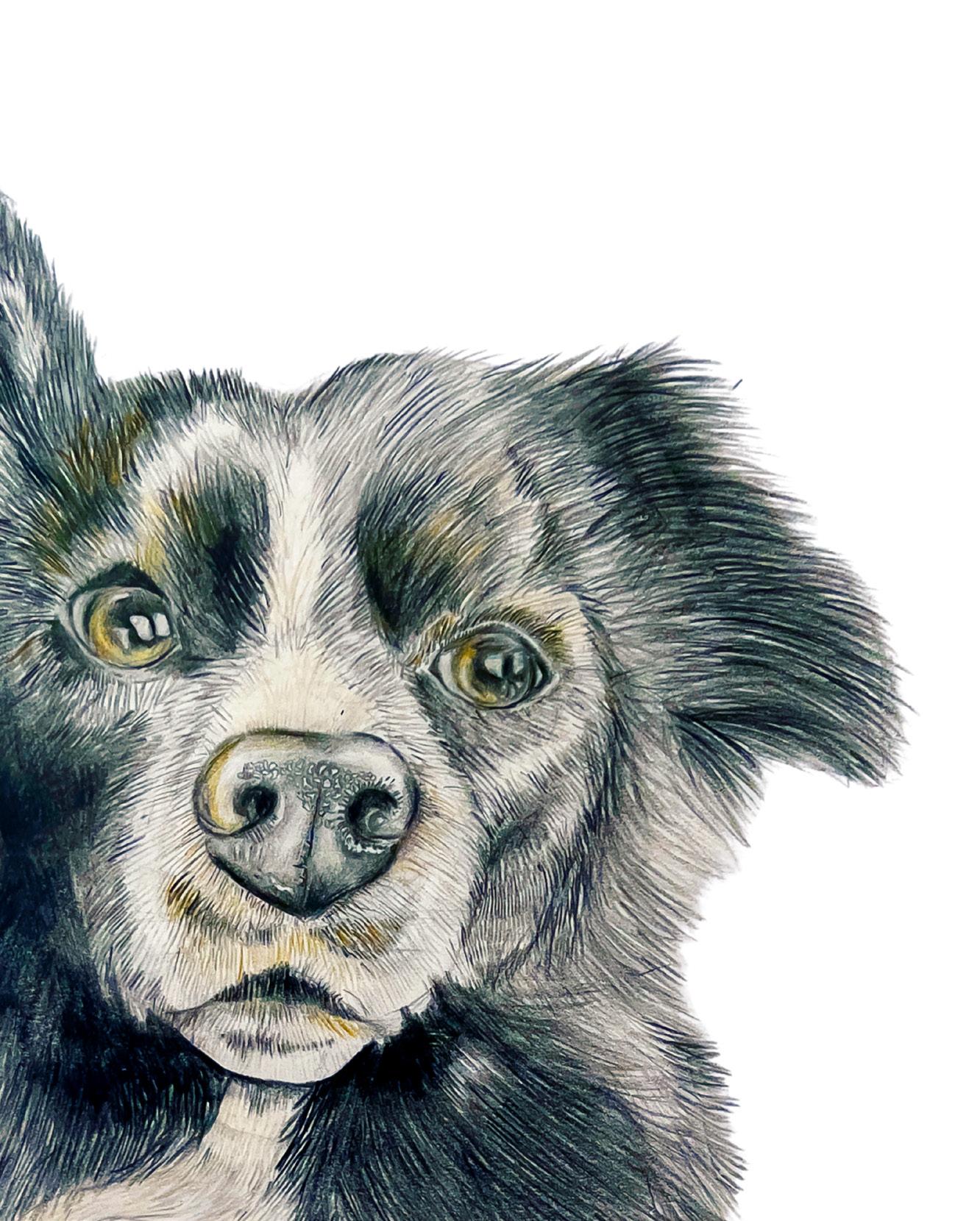
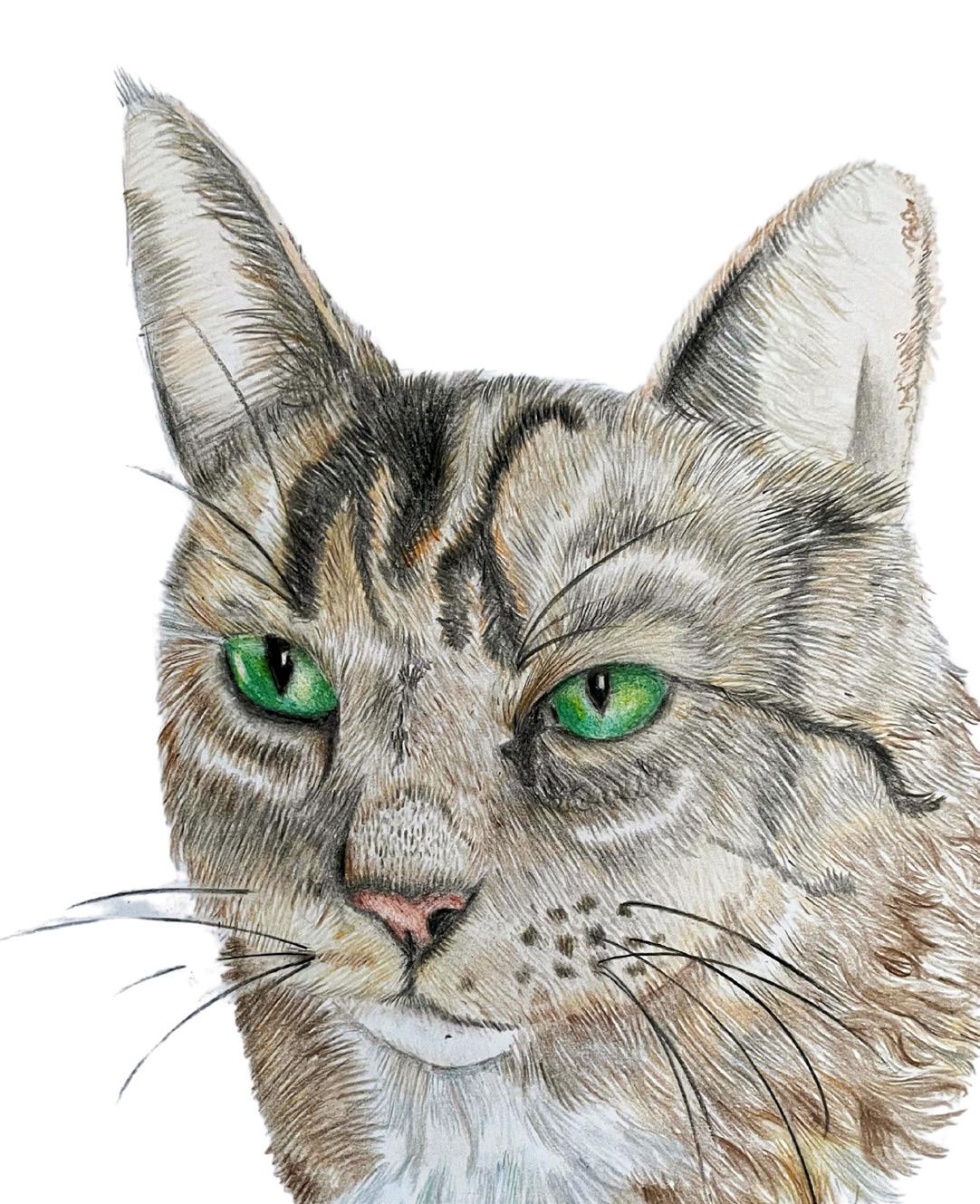
In October half-term, 29 students and four members of staff embarked on an exciting adventure
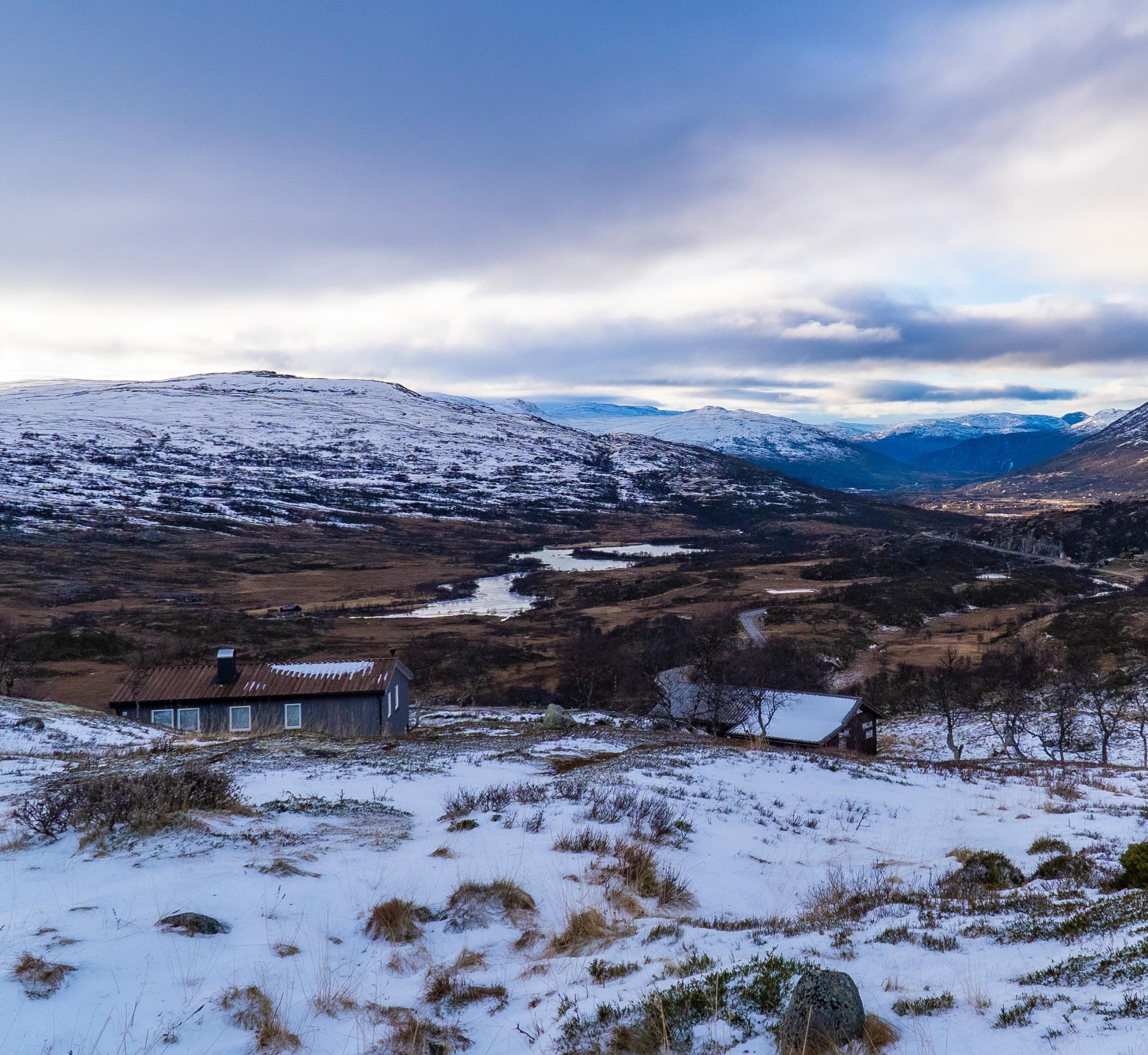

BELOW: Year 10 students Amber and Erin M during the hike down Mount Fløyen
LEFT: Hardangervidda National Park (Photos by Mr Lax)
The five-day trip offered Year 9 and 10 students the chance to take in Norway’s breathtaking scenery and enjoy the fabulous food and culture. For those studying GCSE Geography, it was also an opportunity to see and learn more about some of the features of the natural landscape they had studied in class.
On the first day, the group visited Bergen. Nestled on Norway’s western coast, and surrounded by majestic fjords and steep mountains, the city boasts natural beauty and rich cultural heritage. Bergen is also known for its vibrant arts scene, with numerous galleries, museums and theatres. The historic Bryggen Wharf, a UNESCO World Heritage site, showcases colourful Hanseatic-era buildings with bags of medieval charm.
The group walked to the start of the Fløibanen Funicular Railway and took a train ride up Mount Fløyen. The panoramic view from the top (320 metres above sea level) was amazing. The hike back down was accompanied by some very friendly mountain goats (pictured below), and a delicious meal was waiting for everyone back at the hotel that evening!
Just a short coach ride from the hotel was Norway’s most iconic waterfall, Vøringsfossen. Located in the heart of the Hardangervidda National Park, the water plunges down the steep cliffs of the Måbø Valley. The viewing platform gave fantastic views of the main drop into the canyon below. In Hardangervidda, everyone was fascinated to learn about the relationship between Norway’s nature, climate and environment, before enjoying some fun in the snow.


The Folgefonna glacier plays a crucial role in the region’s hydrology.

The following day, students and staff went on a guided hike in the Bondhus Valley to see the Bondhus glacier, an offshoot of the Folgefonna glacier. Covering an area of around 200 square kilometres, Folgefonna is the third largest glacier in mainland Norway. Beyond its scenic allure, it plays a crucial role in the region’s hydrology, feeding several rivers with meltwater. Students enjoyed learning about glaciology, local history and the geology of the valley. They took a break from hiking to do some caving, exploring the intricate passages and unique geological formations underground.
Another highlight of the trip was the ‘Norway in a Nutshell’ tour, taking in some of the best views in southern Norway. The group explored the gorges and waterfalls of the Flåm Railway, experienced the steep hairpin bends of Stalheimskleiva, and admired the picturesque mountain scenery on a relaxing fjord cruise. Lots of pictures were taken during the trip, but there may have been a new record set on this day!
OPPOSITE PAGE: Walking tour of Bergen
RIGHT: Amelie H, Freya O, Helena G, Isla G-M, Phoebe C and Rebecca S at Norway’s most iconic waterfall, Vøringsfossen
BELOW: Gudvangen fjord cruise
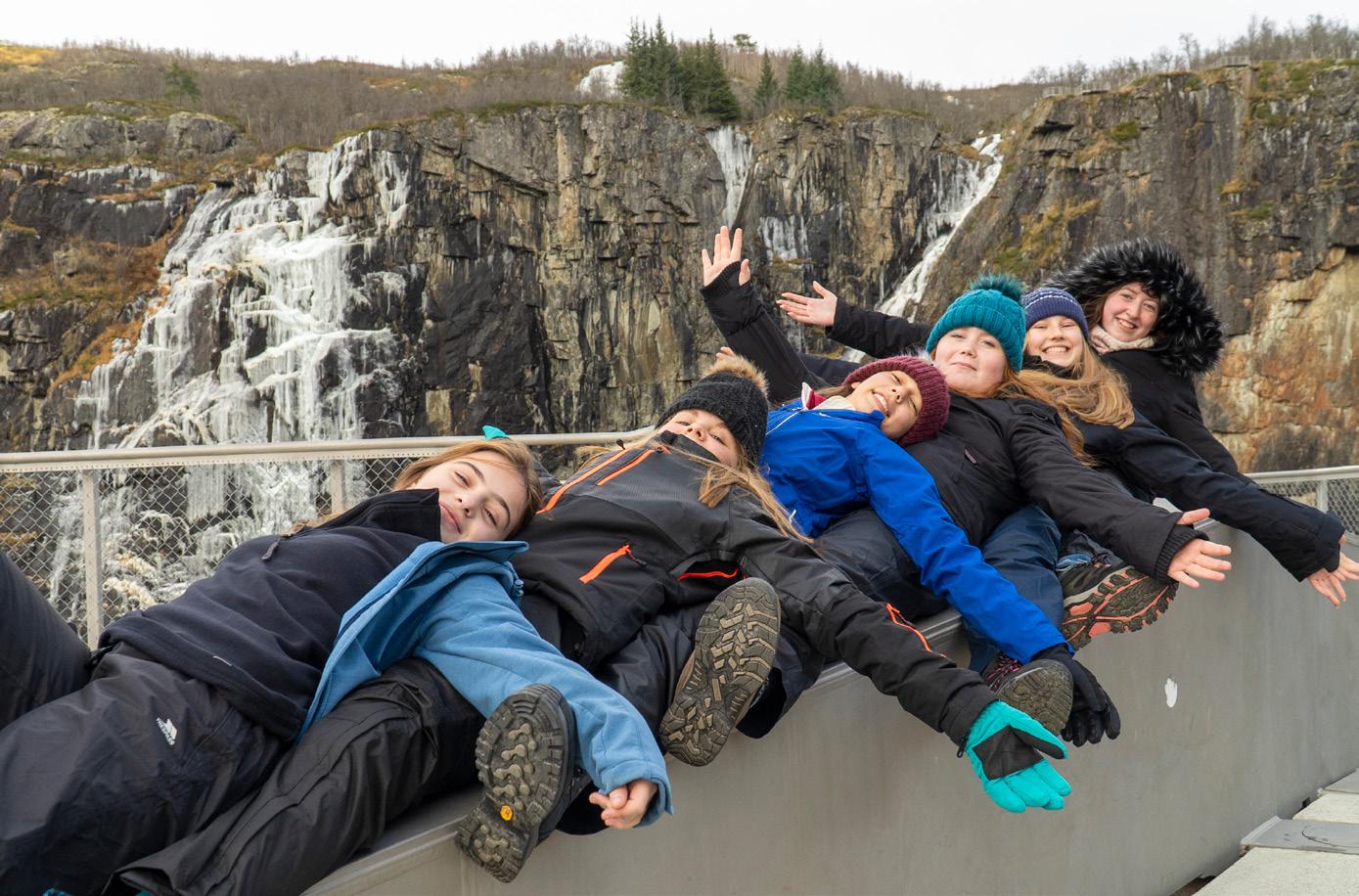
On the final day, there was a visit to Steinsdalsfossen. This prominent waterfall, set against a backdrop of lush greenery and rocky terrain, is a favourite among nature enthusiasts and photographers. A passageway carved into the rock allows visitors to walk behind the waterfall; experiencing the cascading water from this unique perspective was spectacular.
During the journey home, there was time to reflect on the trip. “After leaving Norway, I realised how much I had learned,” says Year 10 student Helena. “I really enjoyed experiencing a different way of life. The trip made me reflect on life as a whole and how nature can be so vast and so beautiful.”


“The trip made me reflect on life as a whole and how nature can be so vast and so beautiful.”
Helena G, Year 10Scan me to watch a video
Students and staff travelled to the Round Square International Conference in Nairobi, Kenya


“Helping out at the school in Nairobi was eye-opening and life-changing.”

Accompanied by Mr Bucknall and Mrs Bruchez, the trip was an incredible opportunity for Year 11 to 13 students Neave P, Maddie G, Amy C, Megan S and Mimi M to spend time with 1,200 delegates from other Round Square schools, sharing experiences and cultures, and contributing to the global dialogue on education. Themed ‘The New Africa’, the conference included engaging keynote speeches and panel discussions, shining a spotlight on African innovators who are shaping the future.
Delegates received a warm Kenyan ‘karibu’ (welcome) from host school Brookhouse International, with traditional food, singing, dancing and camel rides! Flags were displayed from the countries of all 120 schools attending the conference. Margaret Kenyatta, former First Lady of the Republic of Kenya, delivered the welcoming address, and students heard from a number of inspirational speakers. One talked about her work protecting Kenyan forests, inspired by Wangari Maathai, the first female African Nobel Prize winner, who founded the Green Belt Movement in 1977 to plant trees across Kenya and alleviate poverty. She spoke of the impact of ‘lots of people doing all that they can’ to overcome the world’s greatest problems – an inspirational message for the next generation. Delegates also heard from Round Square alumni who are making their mark on the world, from developing robotics to help stroke sufferers, to conservation work to protect Kenya’s native lions.
Round Square schools share and uphold a set of values, known as the Round Square IDEALS: Internationalism, Democracy, Environmentalism, Adventure, Leadership and Service. These are drawn from the theories of educationalist Kurt Hahn, and underpin Round Square’s Discovery Framework, which supports schools in developing holistic programmes that build character and life skills. The conference focused on three of the six IDEALS: Service, Adventure and Democracy.
On Service Day, delegates engaged in community outreach programmes, working with local organisations to help underprivileged schools renovate their buildings. They sanded and painted walls, collected water, laid cement floors, and helped with landscaping and planting. Our students found the day very rewarding. Mimi reflects: “Helping out at the school in Nairobi was eye-opening and life-changing. We played games with the children and helped plant trees. It was such a lovely community and brought everyone together. It’s inspired me to do my own volunteering work in the future.”
One of the many highlights of the conference was Adventure Day, which took delegates to the beautiful Nairobi National Park. Located at the edge of Kenya’s bustling capital, the park offers a unique wildlife experience where the skyline meets the savannah. Delegates enjoyed two game drives to observe the diverse species – including giraffes, rhinos, zebras and lions – and learned about conservation work. In the evening, they were entertained by Maasai dancers before heading to their tents for a night under the stars. Maddie says: “It felt surreal to see so many incredible animals that I would normally see in pictures. Watching as the giraffes tried to keep up with our Jeep was fabulous!”
On Democracy Day, delegates spent the day at Brookhouse School focusing on what democracy means and how it can be furthered around the world. They heard from experts and took part in various activities and small group discussions (known as ‘baraza’ – a Kiswahili word meaning a ‘public meeting’). In the evening, they were hosted by Kenyan families, giving them the chance to experience how they live and enjoy genuine African hospitality.
At the end of the busy week, delegates left the conference with a wealth of new experiences and some amazing new friendships. Kingsley students and staff have previously attended Round Square International Conferences in Canada, Belfast and India. We’re currently planning our attendance at the September 2024 conference in Colombia. The theme for the conference is ‘Blooming from the Past’ and it promises to be just as unforgettable.

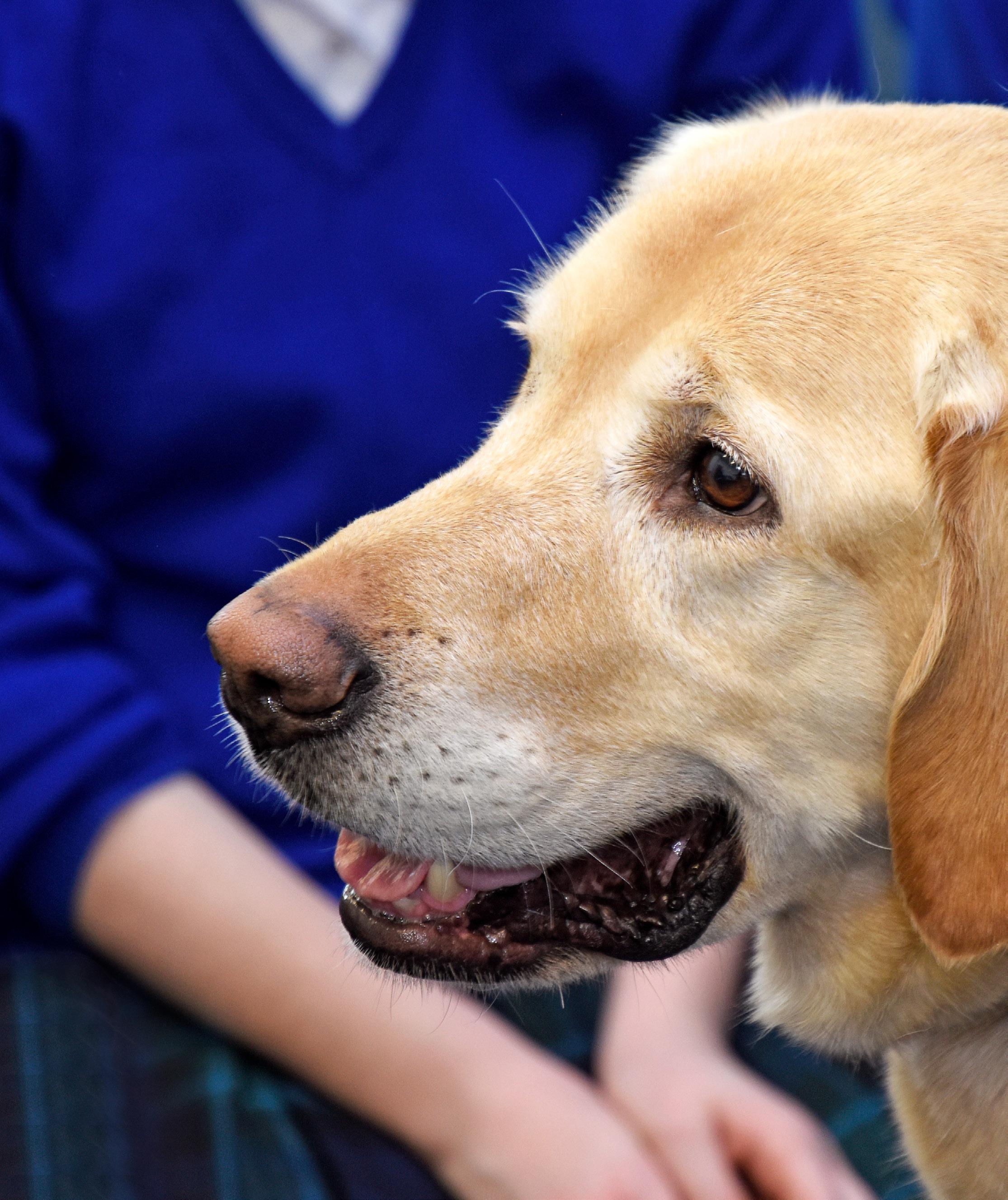
One of the six Round Square IDEALS we focus on is ‘Service’, asking ourselves what we can do for others
Aerin went all-out to raise funds
This year we have been busy raising money for Leukaemia UK. Students and staff have come up with some brilliant ways to support the charity, which is very close to our hearts. In addition to the funds raised through cake sales, dress-down days, and collections at concerts and other events, our annual Rose Ball raised an impressive £1,300. The school hall was transformed into an elegant film-themed venue, and guests included students from Years 11 to 13, as well as staff and alumni. The ball was organised entirely by our Sixth Form Leadership Team, who put together a wonderful evening of food, entertainment and dancing.
We love a Harvest Festival celebration here at Kingsley!
The Prep School’s annual service at Holy Trinity Church was a delight, with pupils sharing harvest songs and poems, and donating food to the Trussell Trust. The charity supports the food banks in our local area and further afield, ensuring supplies go to those who need them most. A huge thank you to everyone who joined us at the church and donated items.
Our Year 12 students have enjoyed volunteering for Kissing it Better (a charity that works to end the isolation of old age by bringing the generations together), visiting Priors House Care Home and the Leamington Rehabilitation Hospital once a fortnight. Spending time on the stroke and dementia wards talking to patients, doing quizzes, and sharing pictures to help with memory recall has been especially rewarding. Our lovely Sixth Formers also sang carols and chatted to residents at Gainsborough Hall Care Home in December. The residents enjoyed their visit so much that they have invited them back.
The Sixth Form Leadership Team organised and ran an impressive second-hand clothes sale at our Christmas Fayre. As well as donating all of the proceeds to Oxfam, they encouraged students and staff to give clothing a new lease of life, raising awareness of ‘fast fashion’ and its damaging impact on the environment.
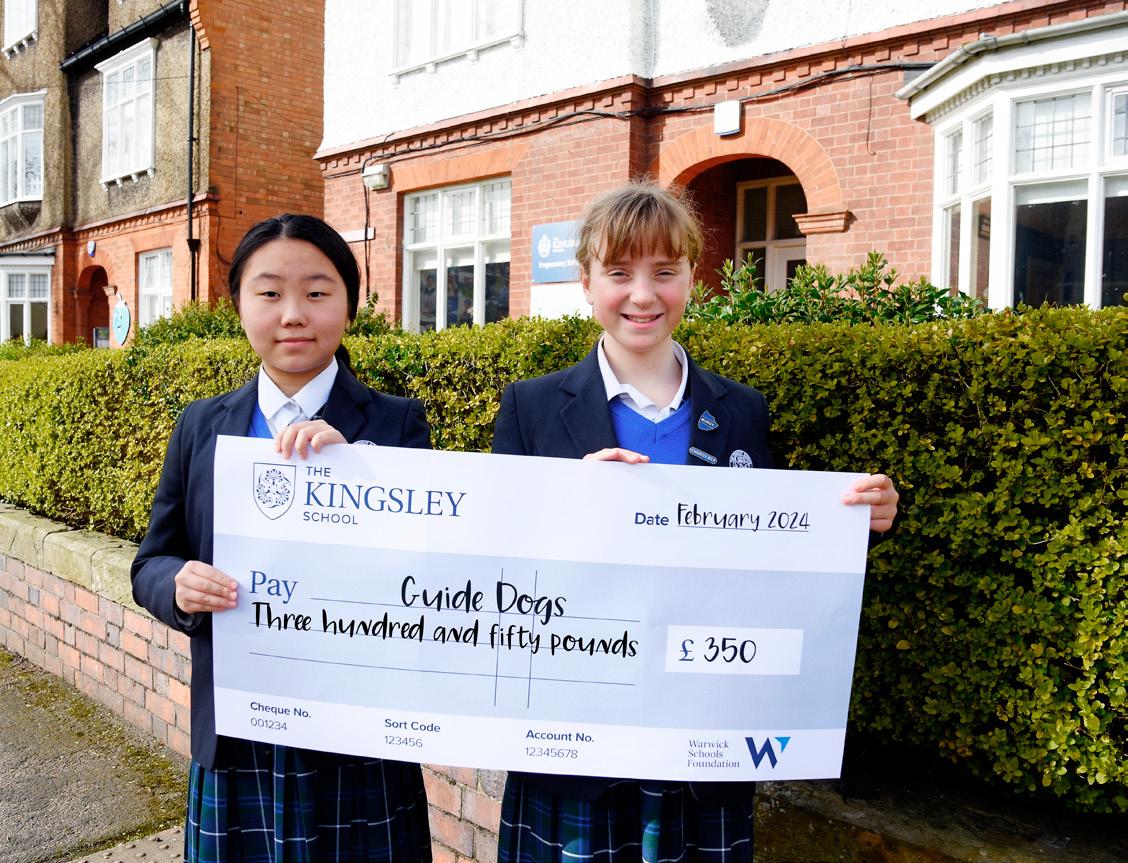
Our fabulous PE Department organised our very first Santa Dash to raise money for Sport in Mind. Despite the terrible weather (it rained… a lot!), students and staff put on their festive gear and walked, ran and sang their way around Christchurch Gardens. Scan the QR code to see them in action. Our thanks to the parents, grandparents and siblings who turned out in the rain to cheer them on!
For many years, we have supported Leamington-based charity Helping Hands. Form groups filled shoeboxes with gifts for the homeless and vulnerable, and did a brilliant job of wrapping them all. They were delivered to the Helping Hands headquarters in time for Christmas.
Our four-legged friends from Leamington Guide Dogs joined the Prep School for an assembly. Pupils loved meeting them and hearing about the charity’s work. Our amazing Year 6 Charity Prefects, Issy and Aerin, went all-out to raise funds to support the training and care of the guide dogs. Amongst other things, they set up a stall selling dog treats, accessories and selfies with visiting guide dogs Buzz and Frankie, raising a whopping £350!
Students completing The Duke of Edinburgh’s Award participate in voluntary work, giving up at least an hour each week. Some have chosen to focus on ecology projects or working with animals; others volunteer in charity shops or as coaches, supporting younger pupils to improve their sporting or dancing skills. Students learn that giving to others can be hugely rewarding and, in return, they develop many transferable skills.
It goes without saying that we are immensely proud of our students’ efforts to be socially responsible, compassionate and ‘Kingsley kind’. We are looking forward to hosting our annual Community Spirit Awards in collaboration with the Leamington Rotary Club, where some of their volunteering efforts will be formally recognised alongside others who work tirelessly within the local community.

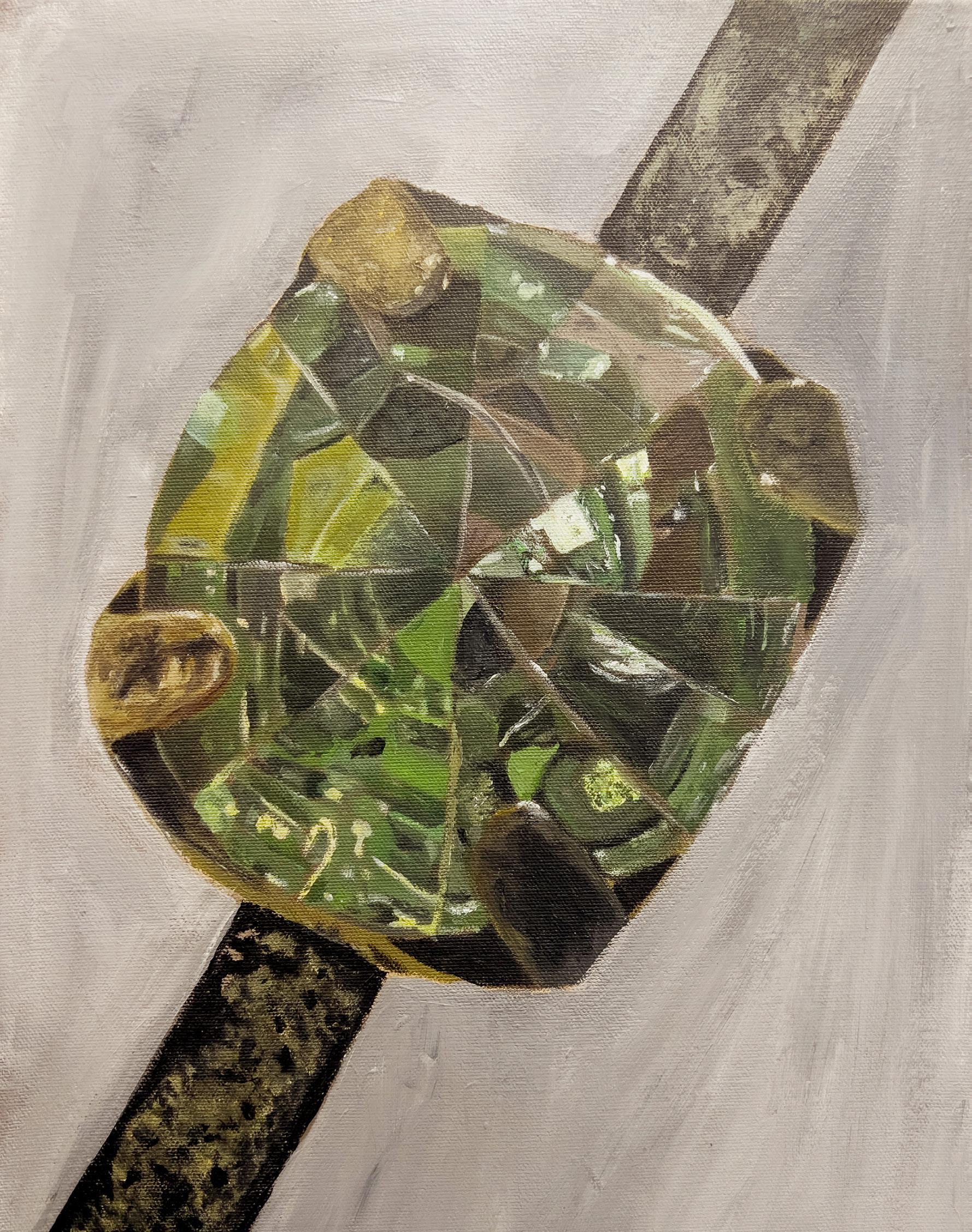
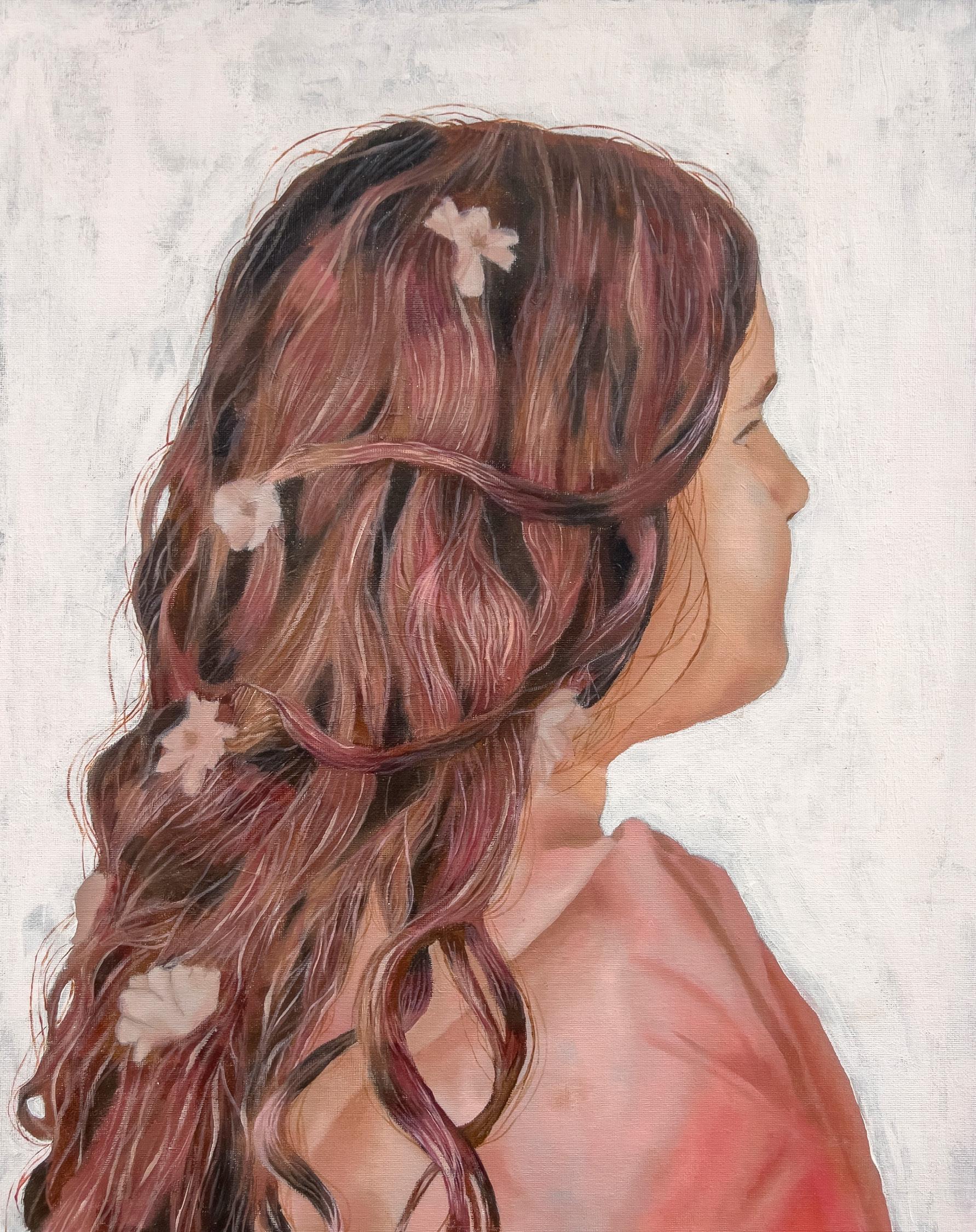
Parents knew that once they had found the right school for their child they would take off.

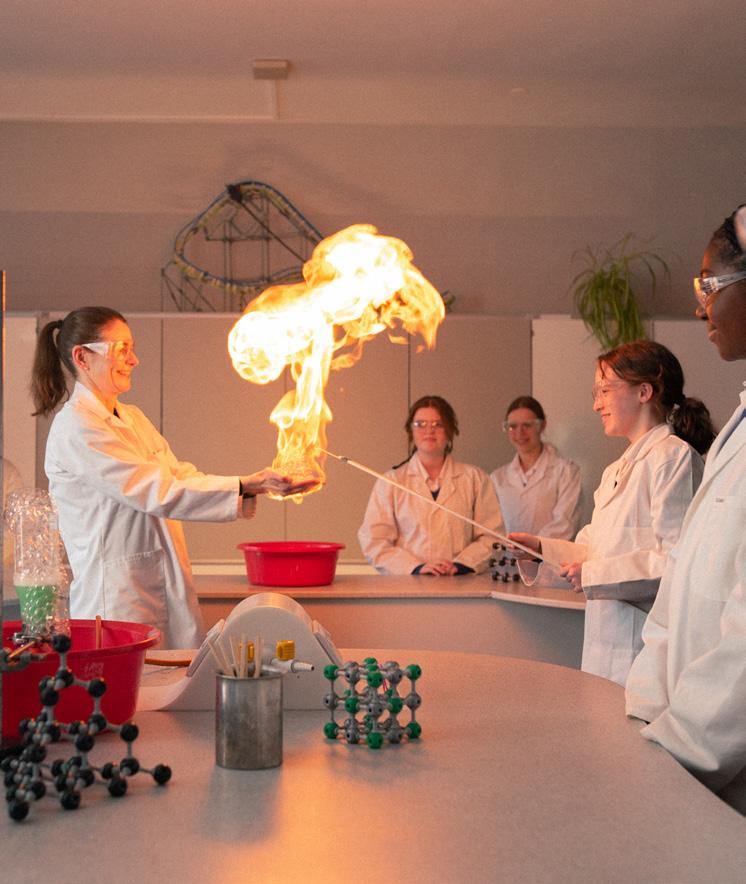
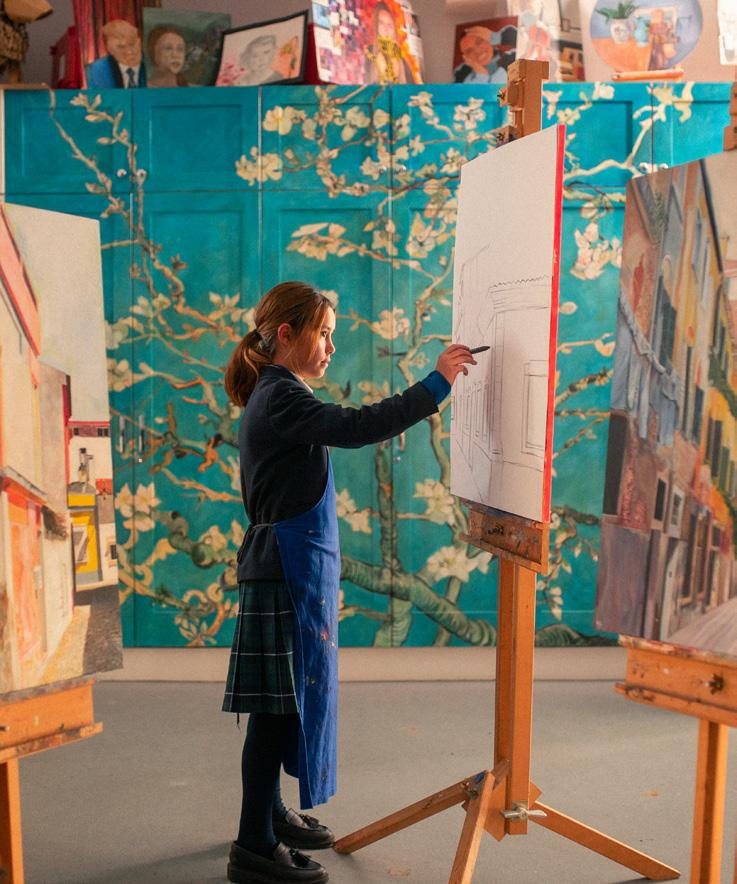
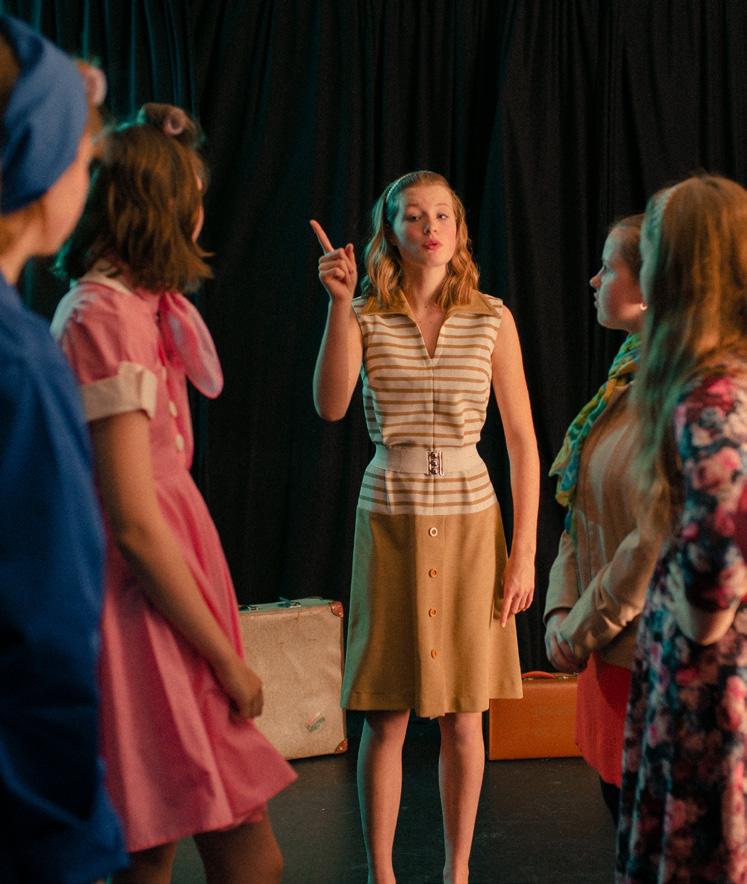
In 2022, we embarked on an exciting journey to put into words and pictures what it is that makes Kingsley so very special. For those of us who are familiar with the school – including our students and their families, staff, governors and our many successful alumni – the benefits of a Kingsley education are evident. As the newest member of the Warwick Schools Foundation, we were keen to develop our external communications to reflect Kingsley’s exceptional and truly unique offering.
Established in 1884, Kingsley is steeped in 140 years of history. Rose Kingsley – the school’s founder, and author and daughter of the famous novelist Charles Kingsley – believed passionately that girls and boys should have access to the same educational opportunities. Rose’s views on education were bold and progressive, and her new school, originally named ‘Leamington High School’, attracted much attention, with student numbers increasing rapidly. The school became so popular, in fact, that it quickly went from occupying one property on Leamington’s Parade to expanding into a second, nearby property. In 1922, the school purchased Beauchamp Hall where the Senior School is still located.
If you read the many accounts of school life in our archives, or talk to our alumni (including those whose own children or grandchildren attend Kingsley), they will tell you that the school’s core values and passion for providing a first-class, holistic education have remained the same throughout its history. Keen to tap into the experiences of these individuals, as well as those of others in our community, we held focus groups to identify common threads and key messages that could be woven into a truly authentic Kingsley narrative. An overwhelming sentiment came across in the feedback we received from parents – that they knew that once they had found the right school for their child they would take off. It’s something we see all the time at Kingsley – children find their wings here. This powerful message formed the basis of our new school film, ‘Learn. To fly’.
Filming took place just before Christmas 2022 and the crew arrived with so much kit that transporting it around the school required five large trolleys and many pairs of hands, creating quite a buzz! During the busy week of filming, our students were outstanding Kingsley ambassadors, fully embracing the opportunity to work with a professional film company, and listening to and following their instructions. We finished for Christmas on a real high, excited to see the finished film.
At the start of March 2023, we shared our school film with our close-knit community for the first time. Staff attended a special briefing, and students featured in the film were invited to a VIP preview (with popcorn, of course!). A link was then shared with parents and alumni so that they could enjoy watching it at home. Shortly afterwards, we hosted our Whole School Open Morning, welcoming prospective students and their families into Prep, Senior School and Sixth Form. During the event, we revealed our new film to members of the public (who we very much hoped would be joining the Kingsley family) for the first time – a proud moment which left us feeling quite emotional.
As the school approaches its 140th birthday it has never been a more exciting time, with strong links and collaborations being formed with the other Warwick Foundation schools, ambitious investment plans, the expansion of co-education, and a powerful brand that reflects the incredible school that Kingsley is today. Here’s to the next 140 years!

You’ll be given the runway, but where you fly is up to you.

An A-level Photography investigation by Georgina B
Georgina’s images have a powerful narrative, highlighting the profound impact of societal pressures on mental health and identity.

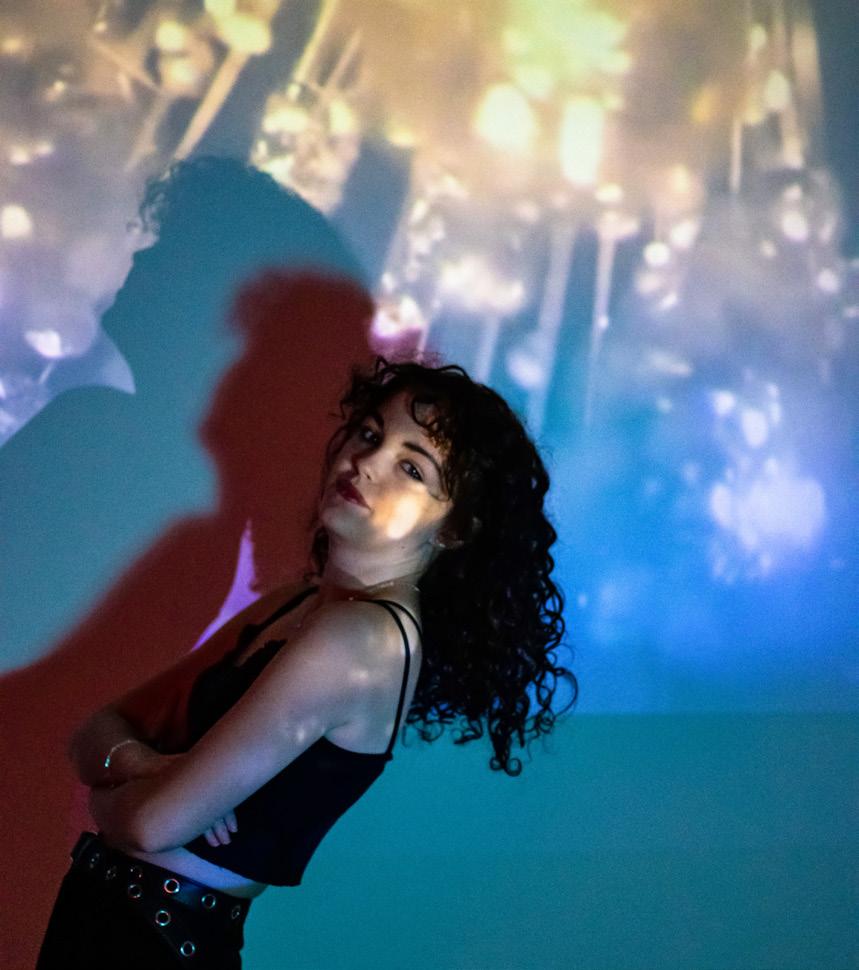
A-level photographer Georgina was keen to explore how society projects expectations on us, coercing us to look, act and think in a certain way. She experimented with distortion techniques to portray how we distort reality by altering ourselves to fit prescribed norms.
Georgina studied American artist Davis Ayer, who has gained recognition for his use of alternative photographic processes. She was particularly interested in his use of multiple-exposures to capture images that are impossible to create in the real world. Georgina used double-exposures in her own work to capture movement and give a sense of chaos, or emotional turbulence. She produced black and white images to show loss of identity, and played with colour to express different emotions.
Georgina also drew inspiration from British-born portrait and fashion photographer Jennifer Jukes, and New York-based photographer Gunner Strietzel. Both are known for projecting images onto subjects to achieve ethereal photographs that evoke a range of emotions. In the image above, Georgina used a similar projection technique and a confident pose to create a more optimistic image. The projected image evokes feelings of empowerment, and the model’s pose symbolises her rebellion against societal expectations. Georgina introduced colour to portray the model’s newfound freedom and her authentic personality shining through. Georgina was awarded an ‘A’ grade for her project, and an ‘A’ grade overall at A-level. She is now studying Digital Film Production at university.
Sagan, dans ce roman, explore le conflit entre valeurs libérales et valeurs traditionnelles. Jusqu’à quel point êtes-vous d’accord avec ce jugement?
‘Bonjour Tristesse’, roman écrit par Françoise Sagan dans les années cinquante explore la vie de Cécile, la jeune héroïne de l’œuvre qui mène une vie très insouciante et hédoniste et son évolution suite aux évènements de l’intrigue. Ce roman créa un scandale à sa sortie car il aborde des thèmes que peu d’écrivains avaient évoqués auparavant. En effet, l’ambiance frivole de l’œuvre allait à l’encontre des mœurs rigides de l’époque. Il convient d’analyser comment Sagan examine le conflit entre les valeurs libérales de certains personnages et les valeurs traditionnelles d’une France conservatrice.
Prenons comme point de départ les valeurs libérales de Cécile et Raymond. Ce qui frappe dès le début du roman est que Raymond est un père libéral qui considère sa fille plus en tant qu’une copine qu’une fille. D’ailleurs, Cécile dit qu’elle n’imaginait pas de ‘meilleur ami’. La relation entre Cécile et son père est hors normes et il semble qu’il ne soit pas un bon modèle pour la jeune héroïne vu qu’il a de nombreuses relations amoureuses et qu’ ‘il refusait systématiquement les notions de fidélité’. Par exemple, la façon dont Raymond abandonne Elsa illustre très bien son attitude envers l’amour. Raymond encourage la vie de bohème de l’adolescente dans laquelle elle boit et parle librement de sa sexualité et rejette les valeurs bourgeoises et traditionnelles. Cela est évident dans son comportement immature et égoïste, étant donné que Cécile manipule et utilise Cyril à son propre avantage, et le laisse tomber très vite malgré sa rencontre charnelle avec lui. Sagan présente la relation entre Cyril et Cécile de cette façon afin de transmettre l’idée que l’amour traditionnel est obsolète, étant donné qu’en fin de compte leur relation ne dure pas et Cyril est vite oublié. A ce point du récit, les valeurs libérales semblent triompher sur les valeurs traditionnelles. L’écrivain utilise Cécile comme archétype de la façon dont les jeunes agissent et voient le monde mais Sagan l’utilise aussi pour symboliser les valeurs libérales qui se développaient et l’émancipation des femmes qui se produisait à cette époque. Je dirais que ces deux personnages, Cécile et Raymond, représentent les valeurs libérales qui émergeaient dans la France des années cinquante et Sagan démontre qu’ils manquent d’orientation morale en raison de leur attitude à l’égard de l’amour et de la famille. Le lecteur peut voir que cela contribue à l’émergence d’une famille dysfonctionnelle. Ce conflit entre valeurs suggère
que la France n’était pas prête à accepter les modes de vie superficiels et frivoles après la guerre à cause du fait que c’était un pays catholique et conservateur qui possédait des idées très traditionnelles en ce qui concerne le rôle des femmes et des adolescents. L’auteur aborde ces thèmes ouvertement, par le biais de Cécile et Raymond et il est évident que le roman révèle une France qui est en train de changer. Cécile et Raymond sont l’incarnation de ce changement mais ils sont scandaleux pour cette époque à cause de leurs attitudes dévergondées.
Tournons-nous maintenant vers la façon dont ces valeurs libérales sont critiquées par Anne, créant un conflit entre les personnages et leurs idées. Bien qu’Anne soit divorcée, défiant les attentes de la société de la période en question, elle a des opinions très conventionnelles et traditionnelles. Anne possède des valeurs morales qui se juxtaposent aux valeurs libérales de Cécile et Raymond. Par exemple, l’amour d’Anne envers Raymond est mesuré et sincère et elle tente d’éveiller Cécile à cette conception, elle lui informe que dans une relation ‘il y a la tendresse constante, le manque.’ Anne se caractérise par son respect des conventions et traditions bourgeoises. Et elle est guidée par la raison, et non par la passion, contrairement à Cécile et Raymond. Les valeurs d’Anne commençaient à être critiquées, après la guerre, en faveur d’idées plus libérales par la nouvelle génération. Je dirais que le fait qu’Anne force ses opinions sur Cécile, malgré la résistance de la jeune fille, constitue une critique des adolescents et de leurs pensées. Par exemple, Anne rejette le mode de vie de Cécile et Raymond à cause de leurs ‘mondanités’. Anne prône l’engagement et l’amour durable alors que les deux autres protagonistes ne recherchent que les plaisirs faciles. En tuant le personnage, Sagan dénonce l’attitude d’Anne et on pourrait même dire que l’auteur condamne les valeurs traditionnelles et maintenant démodées car celles-ci ont mené au décès d’Anne.
Pour conclure, il est clair que les valeurs libérales et hédonistes triomphent sur les valeurs conservatrices en raison de la mort d’Anne. Sagan vise à dévoiler une France en mutation après la guerre et aussi à avertir de la menace qui plane quand des valeurs opposées se font face et entrent en conflit.
In this novel, Sagan explores the conflict between liberal and traditional values. To what extent do you agree with this?
‘Hello Sadness’, a novel written by Françoise Sagan in the 1950s, explores the life of Cécile, the young heroine of the book who leads a carefree and hedonistic life, and her development following different events and situations. After its release, the novel was judged scandalous as it tackles themes that only a few writers had touched on before. Indeed, the frivolous atmosphere depicted in the book went against the strict customs of the time. It is important to analyse how Sagan examines the conflict between the liberal values of some characters and the traditional values of a conservative country.
Let’s take as a starting point the liberal values of Cécile and Raymond. What is striking from the beginning is that Raymond is a very liberal father who considers his daughter more like a friend than his own child. For that matter, Cécile says she could not imagine a ‘better friend’ than him. The relationship between Cécile and her father is unusual and it seems like he is not a good role model for the young heroine –given his numerous short-term relationships – and that he ‘refused categorically all notions of fidelity and serious commitment’. For example, the way Raymond abandons Elsa illustrates very well his attitude towards love. Raymond encourages the teenager’s bohemian life where she drinks alcohol, speaks freely about her sexuality and rejects the traditional and middle-class values. This is obvious in her selfish and immature behaviour towards Cyril, whom she manipulates, uses and abandons despite their sexual encounter. Sagan introduces the relationship between Cécile and Cyril in this way to convey the idea that traditional love is obsolete, given that their relationship does not last and Cyril is quickly forgotten. At this stage of the story, liberal values seem to triumph over traditional values. The author uses Cécile as an archetype of the way young people behaved and saw the world but Sagan also uses her to symbolise the liberal values, which were developing in the 1950s, as well as the beginning of women’s emancipation. I would say that these two characters represent the liberal values that were emerging in France and Sagan suggests that they lack moral guidance in their attitude to love and family life. The reader can see that this contributes to the development of a dysfunctional family. This conflict between values exposes the fact that France was not ready to accept superficial and frivolous lifestyles
after the war, because of France’s Catholicism and conservatism and its traditional views on women and teenagers. The writer examines these themes openly, through Cécile and Raymond, and it is clear that the book unveils a France that is evolving. Cécile and Raymond are the embodiment of this change but they are scandalous at this time because of their debauched behaviour.
Let’s now focus our attention on the way these values are criticised by Anne, creating a conflict between characters and their ideas. Although Anne is divorced, challenging the expectations of society at the time, her opinions are very conventional and traditional. Anne possesses moral values, which are opposed to Raymond and Cécile’s liberal views. For instance, the love Anne has for Raymond is measured and genuine and she attempts to awaken Cécile to this notion and informs her that in a relationship “there are such things as lasting affection, sweetness, a sense of loss…” Anne is characterised by her respect for conventions and middle-class traditions. She is guided by reason rather than passion, contrary to Raymond and Cécile. Anne’s values were starting to be questioned after the war, in favour of more liberal ideas, by the new generation. I would say that the fact that Anne forces her views on Cécile, despite the girl’s reluctance, constitutes a criticism of young people and their ideas. For example, Anne rejects Cécile and Raymond’s way of life because of their ‘love of diversion and frivolity’. Anne advocates commitment and long-lasting love whereas the other two protagonists only seek sensual pleasure. By killing the character, Sagan denounces Anne’s attitude and we could even state that the writer condemns traditional values, perceived as out of date, because they lead to Anne’s death.
To conclude, it is evident that liberal and hedonistic values triumph over conservative values because of Anne’s death. Sagan aims to reveal a country undergoing societal changes post war and also to warn us of the lingering threat that opposite values could create conflict and divisions.
A recent addition to our A-level offering, the subject is a popular choice among current and prospective Sixth Formers

“Studying sociology allows us to understand how our culture, values and beliefs shape our lives and influence our decisions.”
Maya C & Ella J, Year 12
“Sociology is a good subject to choose for A-level because it explains what’s happening in the world and how we got to where we are in society today.”
Abi H & Ella W, Year 12
Sociology is the scientific study of the development, structure and functioning of human society. In lessons we study life chances and consider what could be done to make society more equitable. We investigate how an individual’s gender, identity, ethnicity, sexuality and social class can impact on their experiences. While biologists focus on the body and psychologists on the mind, sociologists look at how society shapes and influences people’s behaviour, their experiences and their interpretations of the world around them.
In class we explore important questions such as: How does the way you see yourself determine the way people identify you? Why are some people rich and others living in poverty? Are men or women more likely to commit a crime? Is the criminal justice system institutionally racist? Studying sociology advances our understanding of issues around culture, identity, religion, crime, poverty, social power and the media. We study the following topics: sociological perspectives; education; work, poverty and welfare; theory and methods; crime and deviance; and the media.
When looking at education, we examine whether educational policies have raised standards in schools, the factors affecting achievement (such as teacher stereotyping, or ‘labelling’, and setting), the development of school subcultures, and differences in attainment according to gender, ethnicity and social class. We always consider both positive and negative impacts of policies, theories and concepts. For example, while some sociologists argue that marketisation policies (e.g. school league tables) have raised standards and increased parental choice, creating a parentocracy, others evaluate that this is a myth because parental power is not equally distributed. Some sociologists argue that private companies competing can provide cheap educational services of a high standard, whilst others believe the privatisation of education would lead to it becoming a profit-orientated commodity rather than a human right. Through critical exploration, students develop their own opinions on a wide range of topical issues.
Let’s look at ‘labelling’ in more detail. Many sociologists have studied this area, with some believing that the labels attached to students in the early years follow them through their academic careers and impact their progress. In other words, they are a self-fulfilling prophecy. In his 1971 study, Becker found that teachers had a tendency to evaluate and label students based on their image of an ‘ideal pupil’. This often included factors such as the way a student dressed, or how neat their work was, which had nothing to do with their intelligence or academic abilities.
Waterhouse (2004) studied primary and secondary schools and found that labelling impacted teacher-pupil interactions; pupils were treated according to their labels, and these judgements became part of their core identity. Those labelled ‘bright’ were likely to perform in line with teachers’ expectations, whereas those labelled ‘less able’ or ‘lazy’ may have felt there was little point in trying. Interestingly, though, Fuller’s study of black girls in a London comprehensive in 1984 found that this ethnic group refused to accept negative labels, working hard to overcome them and achieve academic excellence.
So where could the subject take you? Sociology is a highly regarded A-level qualification as it develops skills that are valued in higher education and by employers. These include being able to use evidence to make reasoned arguments, investigating facts and using deduction, critical thinking, and forming opinions and new ideas on societal issues. Sociology provides a springboard to a wide range of careers, including social work, policing, marketing, journalism, law, teaching, human resources, nursing and medicine.
Above all, studying sociology is about developing a critical understanding of society that can help overcome deviance, inequality and social unrest. It allows us to challenge the way things are currently and consider how they might be fixed. If more people studied sociology, the world would undoubtedly be a better place!
Interested in finding out more? Have a chat with Miss Mahé or Miss Nelson.
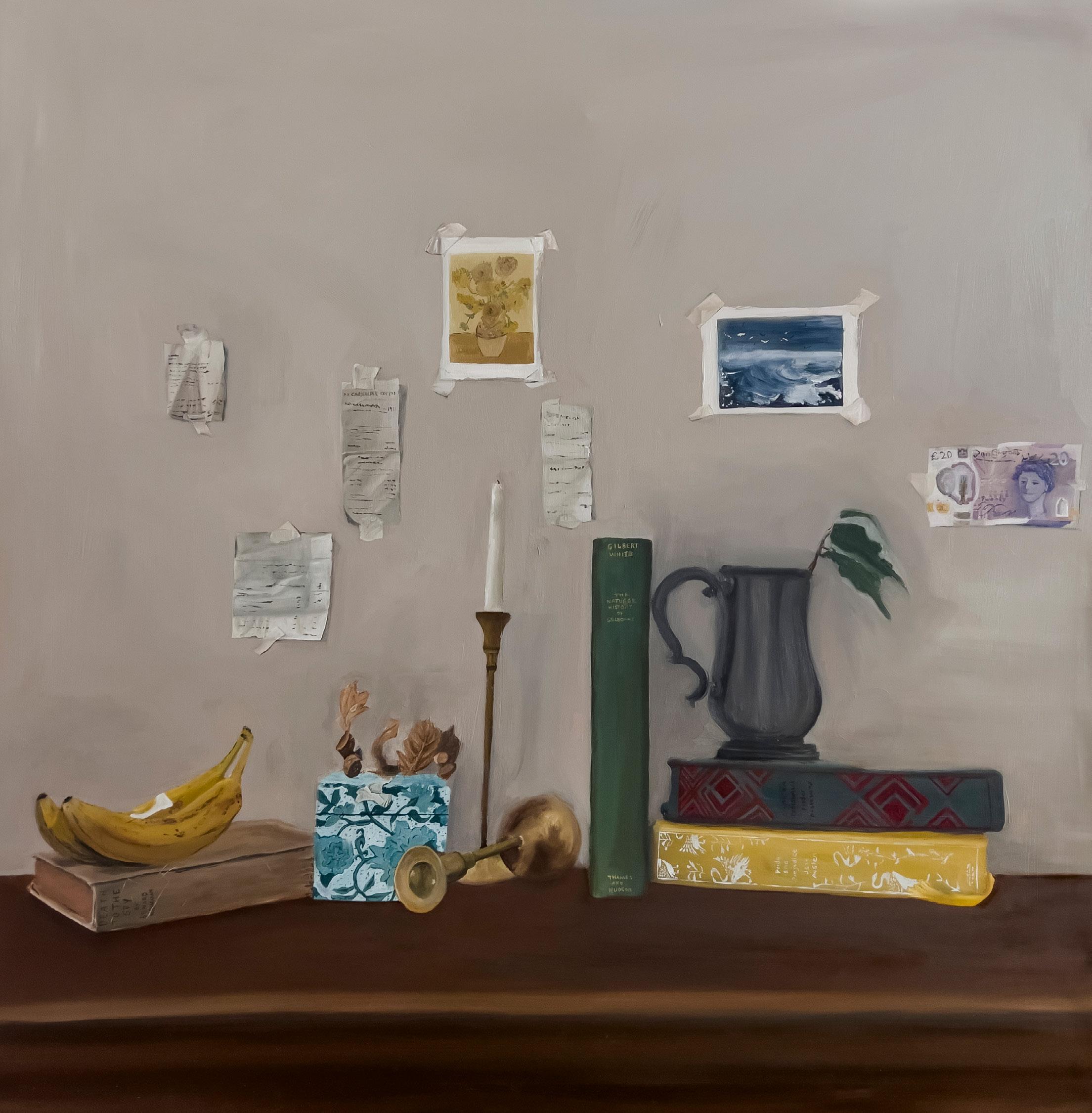
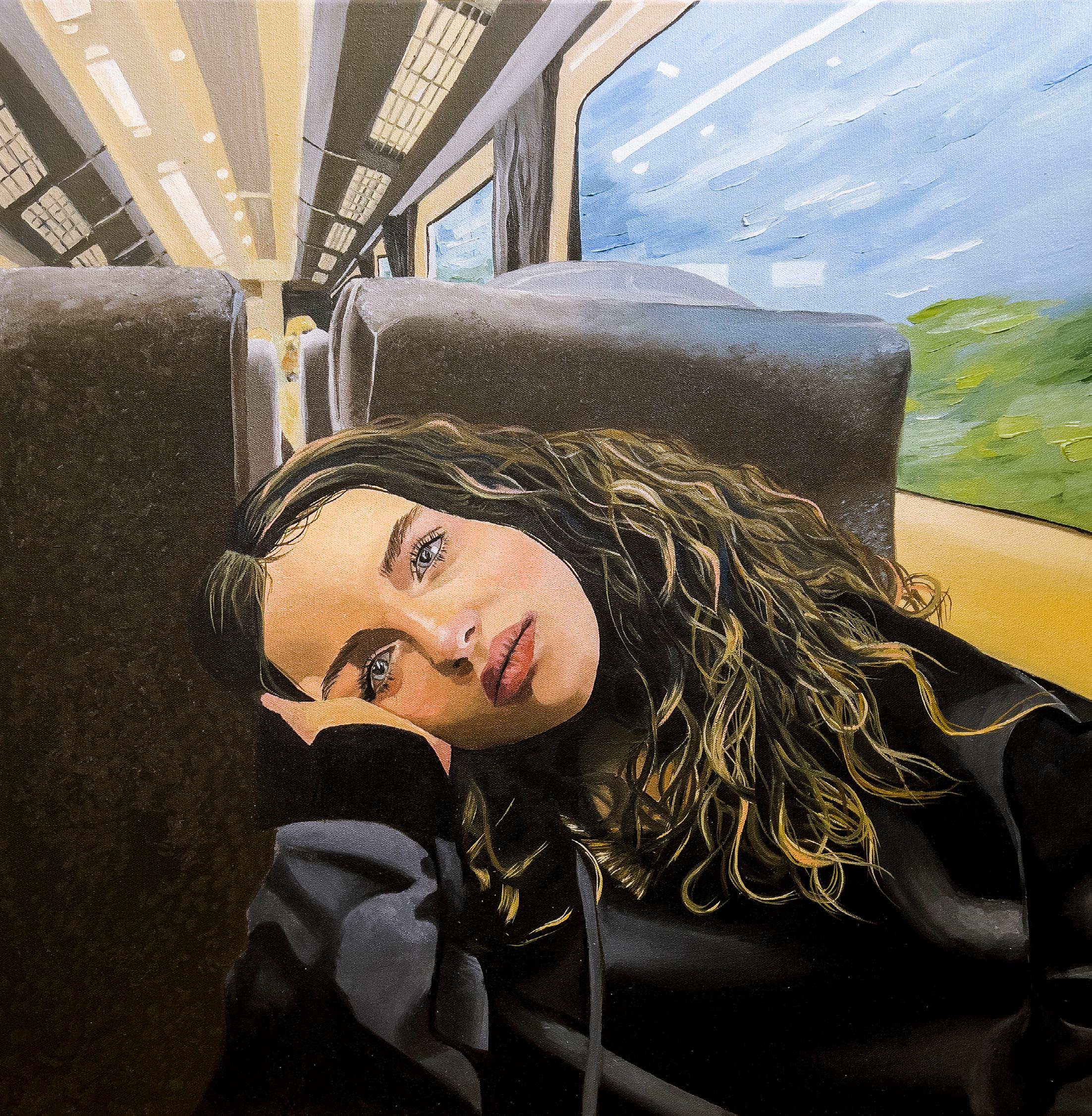

Our outgoing Sixth Form Leadership Team reflects on a busy year
Maisie D and Jasmine S, Heads of School
Having been at Kingsley for a combined total of 18 years, it’s been a privilege to finish our time here as Heads of School. We’ve enjoyed countless experiences, but the standout one for both of us was attending Wellington College’s annual Heads of School Conference. We spent the day networking with likeminded students, sharing leadership experiences, public speaking tips and event ideas. As a bridge between students and staff, our weekly meetings with Dr Howling have allowed us to discuss ideas and upcoming events. We have delivered speeches and led activities on open days. Introducing the next generation to the community that has done so much for us is hugely rewarding. We are very proud of the legacy we leave behind and our extraordinary team, who share their highlights below.
Ikeira D and Lucy L, Deputy Heads of School
We have enjoyed running Student Voice, meeting with Senior School students each week to discuss a range of topics, from charity fundraising to Kingsley’s co-ed transition. These conversations have enabled students to voice their opinions and make positive changes. We were also tasked with a micro-financing project, which involves loaning money to an entrepreneur to help them grow their business; when they start to turn a profit, they pay the money back so it can be reinvested in another business. After organising a student vote, we decided to invest in ‘Mpherere 6’, a group of female farmers in Malawi who will use our loan to cultivate maize and soya beans. Once they have repaid the loan, the next Deputy Heads will choose a new entrepreneur to invest in.
Georgia R, Performing Arts and Pastoral Prefect
I have been delighted to help with the organisation and running of various concerts. I have gained a number of leadership skills through working with the Music and Drama Departments. As well as this, I have developed my public speaking skills during assemblies. In my role as Pastoral Prefect, I have worked with staff and the rest of the Sixth Form Leadership Team to improve student wellbeing. I supported Mental Health Week and encouraged students to take time to look after themselves.
Ella W, Eco Prefect
My role was brand new last year! I have enjoyed raising awareness of topics I’m passionate about. In particular, I wanted to educate the Kingsley community about ‘fast fashion’, which is devastating for the environment. Micro-trends are mostly to blame, leading to mass consumption and a ‘wear once and never again’ attitude. To help combat this, I decided to organise a second-hand clothes sale. I spoke in assembly and collected unwanted clothing during form time. We sold the clothes at Kingsley’s annual Christmas Fayre, giving the proceeds, along with any leftover items, to Oxfam.
Eve W, Senior School Prefect
I have been a prevalent face for students to talk to, working with Jasmine (Prep Prefect) to bring all three parts of the school together whilst keeping what makes each of them unique. I have also worked with Georgia (Pastoral Prefect) to bridge the gap between Senior School and Sixth Form life. One way I have successfully done this is through organising form time activities (ranging from quizzes to mindfulness activities) for Sixth Formers to run with Senior School students. These have been lots of fun and provided more opportunities for students and Sixth Formers to interact, furthering that sense of the Kingsley family.
Jasmine H, Prep School Prefect
I have worked alongside Eve to strengthen relationships between older and younger pupils. I have arranged for Sixth Formers to read with Year 1 and 2 pupils during their study periods – something both sides have enjoyed immensely. I have attended morning assemblies and built good relationships with Prep pupils. Alongside Eve, I have helped plan and run two successful open days. I have supported the transition from Prep to Senior by making the Senior School as accessible as possible, whilst maintaining the excitement of the move to ‘big school’!
Mimi M, Events Prefect
I have enjoyed collaborating with different team members to plan and deliver a number of events this year. I especially loved organising the annual Rose Ball – a hotly anticipated event for students in Years 11 to 13, which raises funds for the Heads of School charity. The ball was held in November and was extremely successful, raising £1,300, with all proceeds going to Leukaemia UK. I have also contributed to the running of taster and open days. We also organised a fun treasure hunt around the Sixth Form to help Year 11s get to know the building.
Kitty B, Sports Prefect
I enjoyed helping the PE Department with Sports Day, which is a firm Kingsley favourite – a chance for everyone to indulge their competitive streak and support their Houses! There’s always a lovely atmosphere; students paint their faces and decorate their House sections with posters and banners, and Sixth Formers wore fancy dress this year. Every fortnight, I share all of the amazing sporting achievements in whole school assembly. We celebrate achievements both in and out of school, ensuring that all pupils are recognised for their fantastic results and hard work. The role has developed my public speaking skills and I have grown in confidence as a sports person.
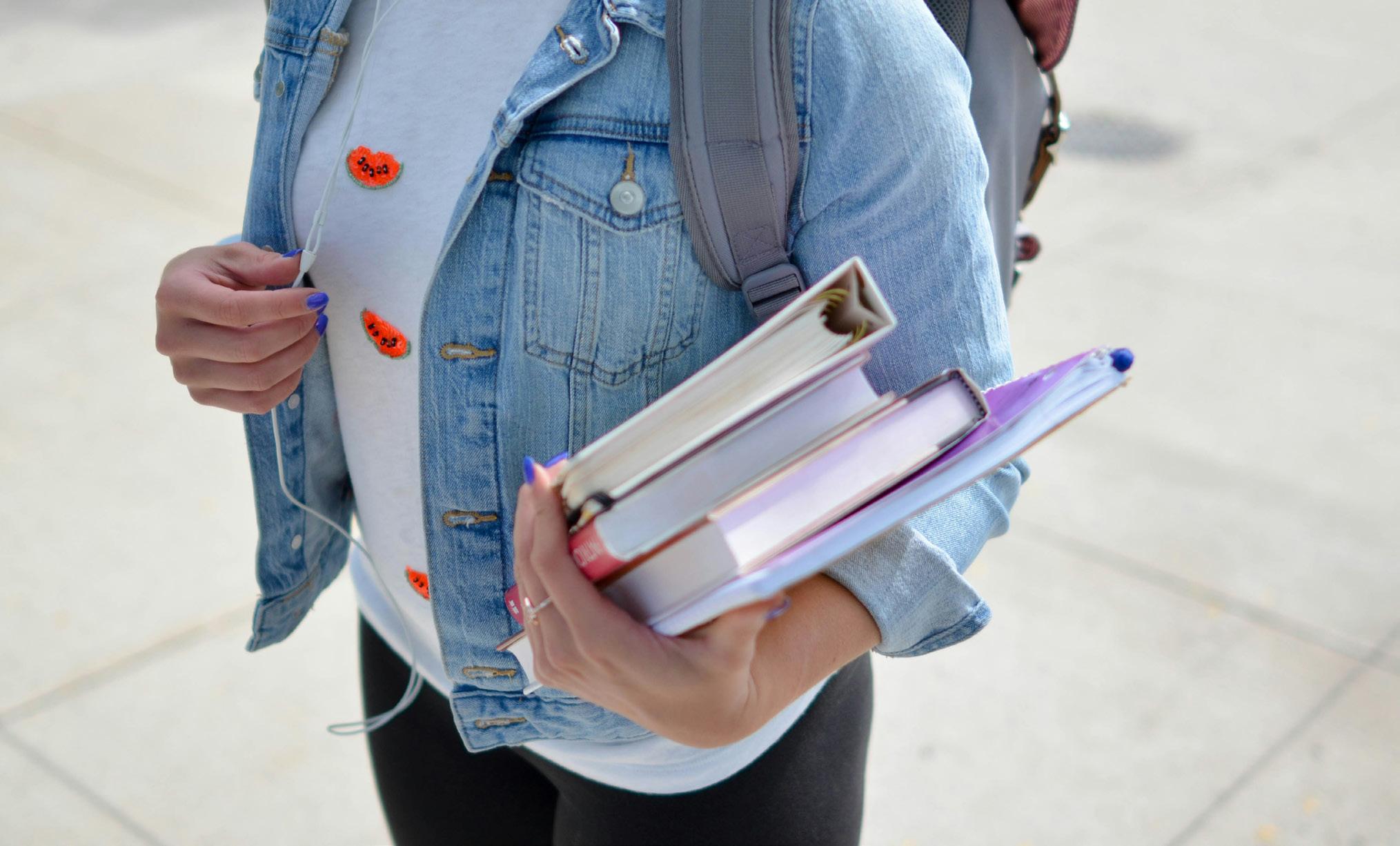
Our International Universities Counsellor, Dr James Mills, explains why more and more young people are considering post-18 options abroad
The Warwick Schools Foundation Global Universities Programme assists students and their families with non-UK, non-UCAS higher education information, applications and funding opportunities. As Foundation International Universities Counsellor, I work with students across the Warwick and Leamington campuses to explore individualised global pathways to success.
There are many reasons why a student should think globally as they contemplate their post-A-level studies, and with current trends in UK higher education, these paths are becoming more and more enticing to our students. Some of the reasons to consider a non-UCAS option include:
• A wider range of degree options, combinations of subjects and multi-disciplinary studies.
• Different learning methodologies, including experiential education, paid internships, modular examinations and small-group teaching.
• An alternative pathway to professional studies, such as law, dentistry and medicine.
• Diverse social, cultural and, depending on your choices, linguistic experiences.
• Enhanced opportunities for developing sporting, dramatic, musical and artistic excellence.
• Doing something different that can set you apart from the crowd!
The Programme takes a ‘counselling’ approach. I encourage students to explore their unique interests and abilities holistically, both in and outside of the traditional academic sphere, and then research and develop a list of potential countries, institutions and programmes that reflect these, searching for the ‘best fit’ for their next steps. I support students with planning visits (real and/or virtual) to universities, and arranging meetings with admissions staff, current students and alumni. After that, I provide targeted guidance through their applications in addition to or instead of the UCAS process.
I am currently in the Sixth Form building at Kingsley every Tuesday morning to meet with interested students. Meetings can be arranged at other times, particularly to provide students and their parents with advice on the financial aspects of the process, including international need-based financial awards and athletic scholarships where appropriate. The newly created Foundation Global Universities Programme website, www.globaluniversities.co.uk, contains information on relevant events, online tools and universities to help families explore and navigate through these exciting opportunities.
The rough timeline for global university planning is as follows:
Year 11
• Presentations at scheduled Sixth Form Open Evenings to introduce the Global Universities Programme alongside UCAS information.
• One-to-one Sixth Form interviews with interested students to discuss A-level options and global pathways.
Year 12
• Presentations and college fairs. Virtual and in-person visits by selected universities.
• Breakout presentation and Q&A sessions with students and parents to outline application procedures, financial aid and timelines.
• Sessions at UCAS days. Detailed information on application timelines, testing, financial aid, sports scholarships, etc, followed by one-to-one meetings to form ‘best-fit lists’ and explore options in detail. Assistance with essay and supplemental essays/portfolio drafting as needed.
Year 13
• (Autumn) Ongoing application support as needed, especially for ‘early’ deadline institutions.
• (Spring) Application support for spring deadlines. One-to-one meetings to discuss options as acceptances/offers/wait lists rejections arrive.
• (Summer) One-to-one meetings with accepted students to support financial aid and immigration requirements.
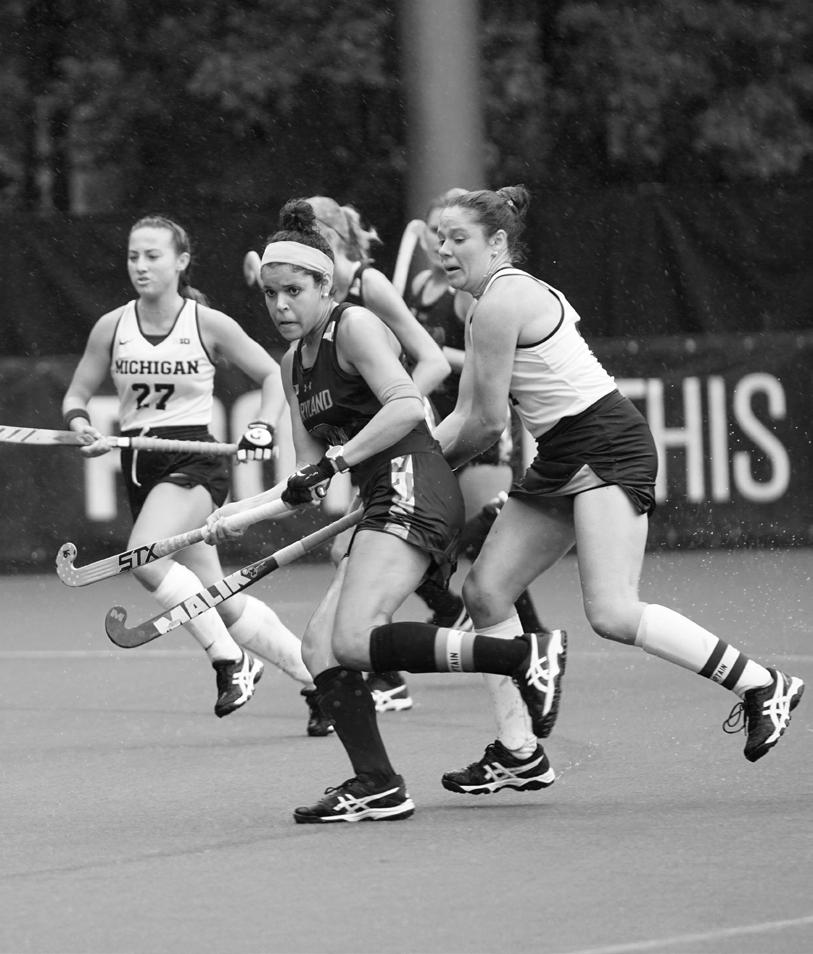
A few destinations to consider…
The USA
Varying in size from a few hundred students to over 60,000, US universities offer a diverse range of options, reflecting the American desire to build ‘learning-living communities’. Academic, social, athletic, etc, life is an integral part of each university’s culture. Smaller liberal arts colleges allow you to study a range of subjects for up to two years before ‘majoring’, or in some cases shaping a degree that’s unique to you.
The Netherlands offers an outstanding education for all in long-established research and technical universities, and universities of applied sciences, where hands-on learning is emphasised. There are also university colleges attached to research universities, but with smaller, residential colleges based on the US liberal arts model. Hundreds of courses are wholly in English, although possible future reforms may require students to learn some Dutch. Costs are similar to the UK for UK citizens, but significantly cheaper if you have an EU passport.
With a disproportionate number of QS Top 40 World Universities, Australia and New Zealand have some amazing study options. Often seen as a halfway house between the more open curriculum of the US and the UK’s narrow degree programmes, Aussie and Kiwi universities present breadth and greater freedom within general disciplines. Double and triple bachelor programmes lead to two or three degrees after four years of study. Fees are reasonable compared to the UK, and especially to the US, and funding is often available. All of this is set in spectacular scenery in two sports-mad countries with strong UK ties.
Ireland
With outstanding degree programmes in English and a shorter journey time home to Warwickshire than some British universities, Ireland is something of a hidden gem for undergraduate studies. Dublin has three major research universities (Trinity College, University College and TU Dublin), with more outstanding campuses of the National University system just a short train or bus ride away, often in historic city centres. Ireland is also one of the most – if not the most – affordable non-UK options.
Non-UK options can offer enhanced opportunities for developing sporting, dramatic, musical and artistic excellence.

Equestrianism at Kingsley is thriving, with established riders being joined by (even)
In 2023, our Prep School Enrichment Programme was extended to give pupils the opportunity to take weekly riding lessons. The beginner group made quick progress, graduating from leading rein to independent trotting and confidently manoeuvring through obstacles. Our more experienced riders have enjoyed refining their trotting, cantering and horsemanship skills. Several of our new recruits have caught the ‘riding bug’ and are now supplementing their weekly lessons with additional weekend lessons and pony camps. The future looks bright for the Kingsley Riding Squad!
The Kingsley Riding Squad now has 11 members, most of whom are already competing for Kingsley. Regular training sessions are held in dressage, show jumping and arena eventing with trainers Beccy Bates, Stephanie Faulkner and Katy Green – all Kingsley alumnae, who know the school well and really understand what we’re about. It’s great to win, but it’s even more important to have fun (and come back safely!).
Training and competing require a great deal of effort and commitment from our riders and their incredibly supportive parents. We are immensely proud of the achievements of all our squad members. Georgia R (Year 13), Amelia M (Year 9), Francesca B (Year 8), Martha W (Year 8), Abi B (Year 7), Isla B (Year 7) and Belle H (Year 5) have all competed successfully in various combinations and as individuals at, among others, Aston le Walls (Bloxham Eventer Challenge), Allen’s Hill, Eland Lodge, Hartpury, Princethorpe College, and the NSEA Championships at Hickstead and Addington.
Highlights include our Riding Captain Georgia’s performance at the two-day event at Princethorpe, where she came 10th in her section and 3rd overall in a joint team with other riders. Belle won both the prelim and novice individual classes at the NSEA dressage event at King’s Bromyard. She is now County Champion and has qualified for the championships in May. Abi, Amelia and Francesca came 2nd in the NSEA team 90cms show jumping event at Eland Lodge and have also qualified for the championships. Abi also came 1st in the individual placings. A special mention to Martha, too – although she was unplaced in her first arena eventing competition, she did complete the course, when 20 out of the 60 competitors were eliminated!
OPPOSITE PAGE: Year 2 pupil Belle D at one of the Prep School’s weekly riding lessons
RIGHT: Riding Squad Captain Georgia R competing at the NSEA Show Jumping Championships
Outside of school, squad members are busy with Pony Club and many other activities, including mounted games, polocrosse, riding clubs and showing. New squad member Lilly R (Year 7), who had already qualified three ponies for the Royal International Show in the ‘junior small breeds’ class, qualified three more on Easter Sunday. Isla was awarded Best Horse and Rider Combination in the nationwide early season polocrosse camp in March.
Abi, among other achievements, qualified for the Pony Club Spring Festival Championships in 80cm show jumping and 90cm arena eventing. She came 2nd in the show jumping and won the Horsemanship Award for Excellence in Riding. Amelia, Francesca and Georgia also qualified for the Pony Club Spring Festival Championships – Amelia for the 90cm show jumping, where she got just four faults. She is currently working hard with British Show Jumping, aiming for double clears, to qualify for BS second rounds and championships. Francesca came an excellent 5th in the 1m arena eventing out of a massive class of 80. With BS, she has qualified for the Blue-chip Championships at Easter. Georgia R, who has been working hard with her two beautiful horses, came 2nd in both team and individual sections in the Novice dressage.
Ottie M (Year 11) and her horse Dezzie suffered a nasty fall just before Christmas, but they are recovering well and we hope they’ll be able to join us again soon.
Georgia M (Year 9) has recently started training with the squad, as well as taking some fabulous videos and photos for us at an arena eventing session at half-term.
Well done to our entire squad, and thank you to our wonderful trainers and Riding Coordinator, Sue Jessett.

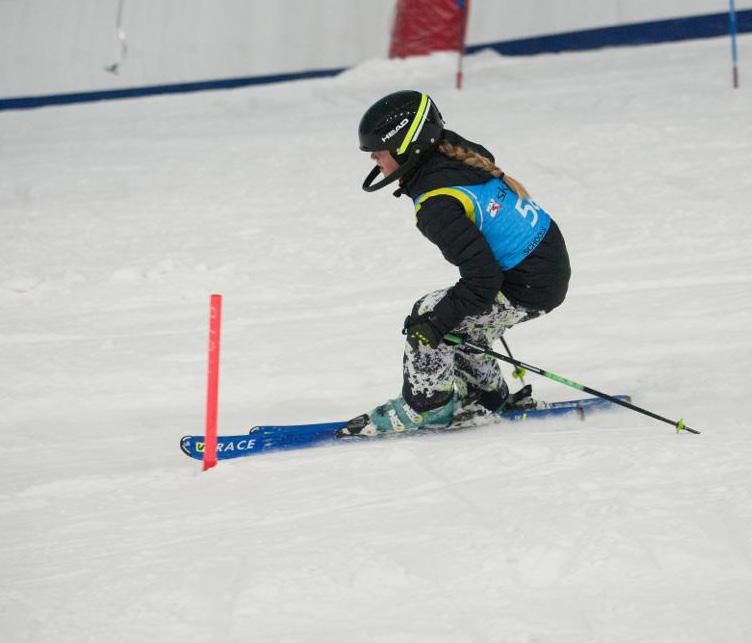
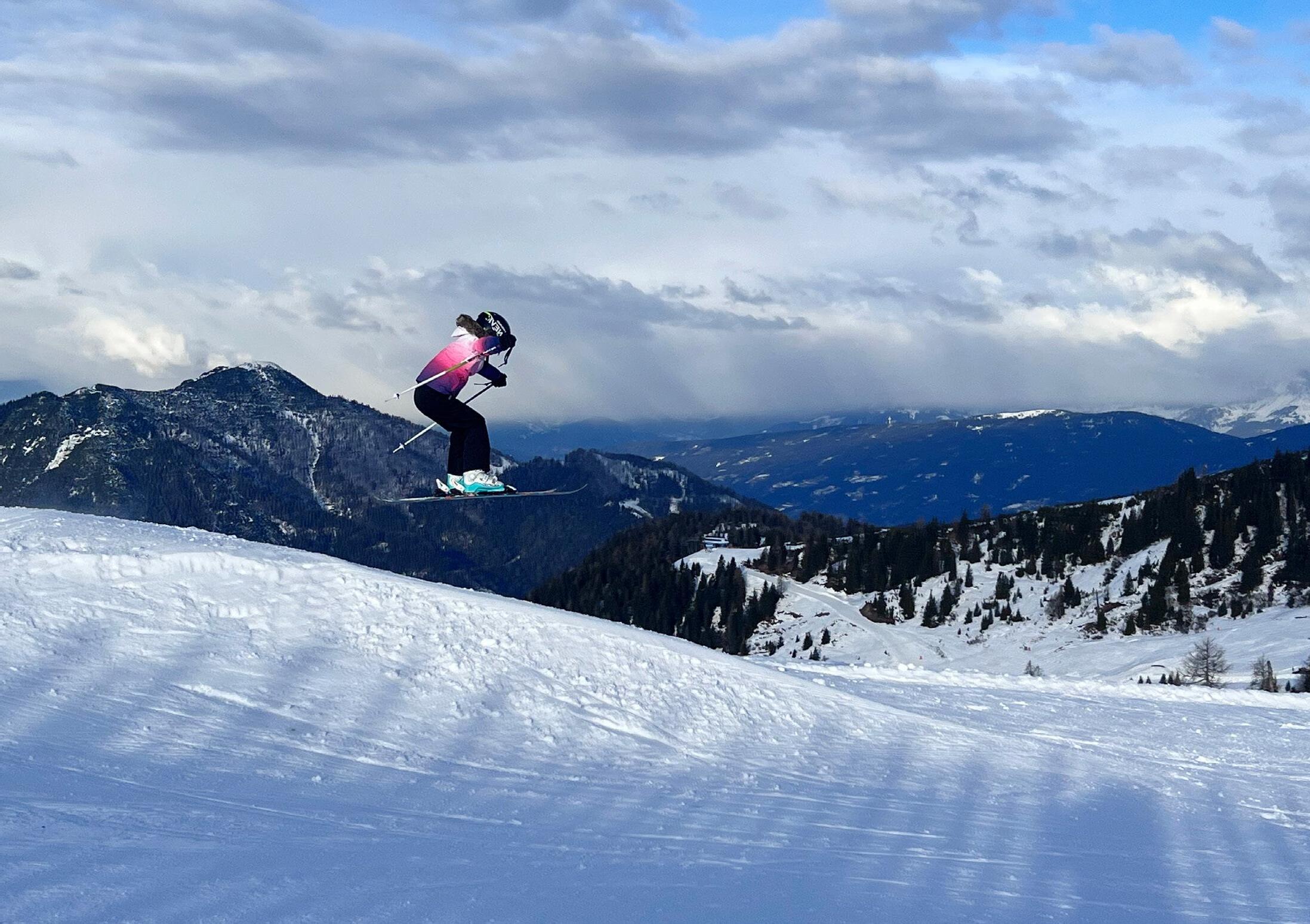
When did you first put on a pair of skis?
Grace: We were two years old and still in nappies! We went on a family skiing holiday to California. It was springtime so it was nice and warm. Our mum stayed behind us and our dad skied in front, but we still fell over a lot!
What is it about skiing that you enjoy?
Isabelle: It’s a really fun form of exercise. It’s all down to how you move your body. There are so many different techniques and things you can do.
Grace: Yes, it’s really good fun, especially when you’re skiing with family and friends. I enjoy going off-piste and into the woods. The terrain parks are great fun and I love obstacles and jumping.
Can you tell us more about your ski racing?
Isabelle: When we arrive at a race we get kitted up, then we do a course inspection with our coach. During the race you have to make your own decisions – there’s nobody to tell you what to do or where to go.
Grace: You do three runs and you have to successfully complete at least two of them, otherwise you’re disqualified. You have to ski to the left of the blue gates and to the right of the red ones. Your best two scores are counted.


What makes a good ski racer?
Isabelle: You have to work extremely hard. It’s not about having fancy kit – it’s about making sacrifices and putting the time in. You also have to be confident. If you doubt yourself then it affects your performance and your race times. The first time I raced I felt a lot of pressure, but I’m used to it now and really enjoy it.
Grace: The key is to practise, practise, practise. Sometimes you have to lower your expectations. If you don’t race as well as you’d hoped, you have to tell yourself it’s OK – there’s always next time! One time when I was racing I messed up the first run. The second run went OK, but then I missed the last gate on the third run. I swallowed my pride and side-stepped back up the slope to go around the gate to avoid being disqualified. My parents said they were so proud of me!
How often do you train?
Isabelle: We ski as a family for about 40 days each season. Our parents and 16-year-old sister ski for pleasure. Our 14-year-old sister competes in races like us. Our favourite place to ski is Austria because it has lots of good courses. We also take part in training camps abroad. Last May we trained in Holland with the National Alpine Squad.
Grace: We’re both on several teams, so we do lots of training with them. We also train with school every other Friday. These sessions are useful for working on our technique with our coach. Every race is an opportunity to practise and develop our skills. We sometimes enter huge competitions – there’s less chance of winning a medal, but it’s good experience. We have recently competed in the Midland Ski Club’s Winter Race League, the Midlands Tri Cup in Telford, and with school at the English Indoor Championships and ISA events.
Isabelle: Grace took my place on one of the teams at last year’s ISA Indoor Ski Championship. Her time was 0.5 milliseconds faster than mine, and the top five skiers made the team – I was 6th. This year I was determined to beat Grace; I came 4th and Grace was 5th!
OPPOSITE PAGE: Isabelle perfecting her jumps during a family ski holiday (2022) and Grace racing in the ISA competition in Hemel Hempstead (2023)
ABOVE: Isabelle and Grace in Slovenia, aged three (2015)
RIGHT: Celebrating 2nd place in the mixed team category at the ISA competition (2022)
“When we were little, the ski lifts were one of the biggest challenges!”
What are your greatest achievements to date?
Grace: Being offered a place on the National Alpine Squad after placing in the top five at the national ISA ski event. It was the first big team I went into. This year, both of us have been selected for the ESSKIA under 12 squad. Just 13 children from across the country were invited to take part in their summer ski camp abroad, and we were two of them. It’s my dream to ski for England one day.
Isabelle: I’ll never forget the day I learned to jump – I was so pleased with myself! I also competed in an event that day and did very well, so it was a good day.
Looking back on your experiences so far, what have been the biggest challenges?
Isabelle: When we were little, the ski lifts were one of the biggest challenges! When I was four, I landed facedown in the snow when I came off a chair lift.
Grace: And I just couldn’t stay on the button lifts. Every time I would say to myself, “Come on, Grace, you can do this!” – and every time I would fall off!
What would your advice be to someone who is thinking of giving skiing a try?
Grace: Don’t worry about having all the gear, as you can hire boots, etc. Take it slow and steady to begin with, and don’t go on any major runs.
Isabelle: Just give it a go! If you’re a Kingsley student, get to grips with the basics and then come along to our Friday training sessions and we can ski together. They’re so much fun!
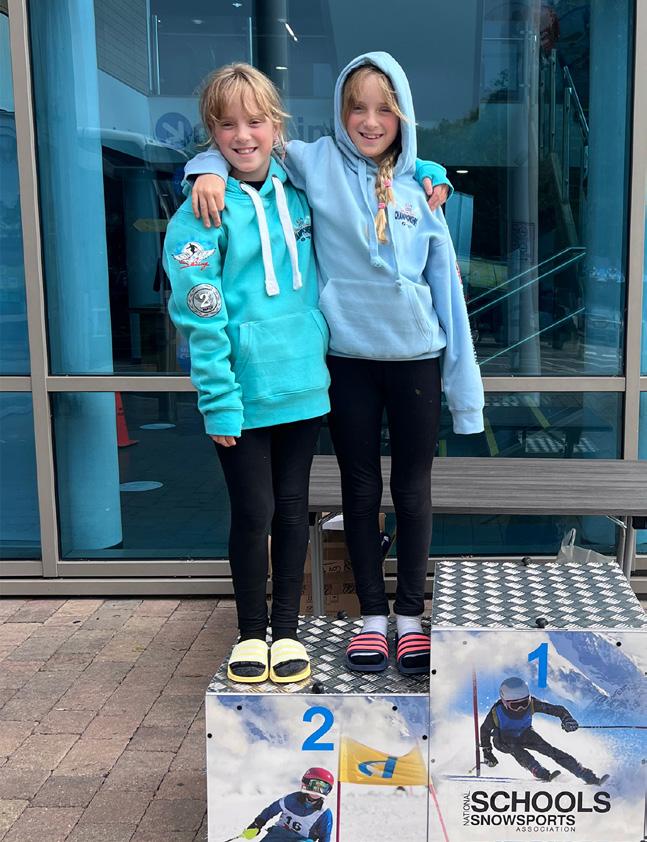
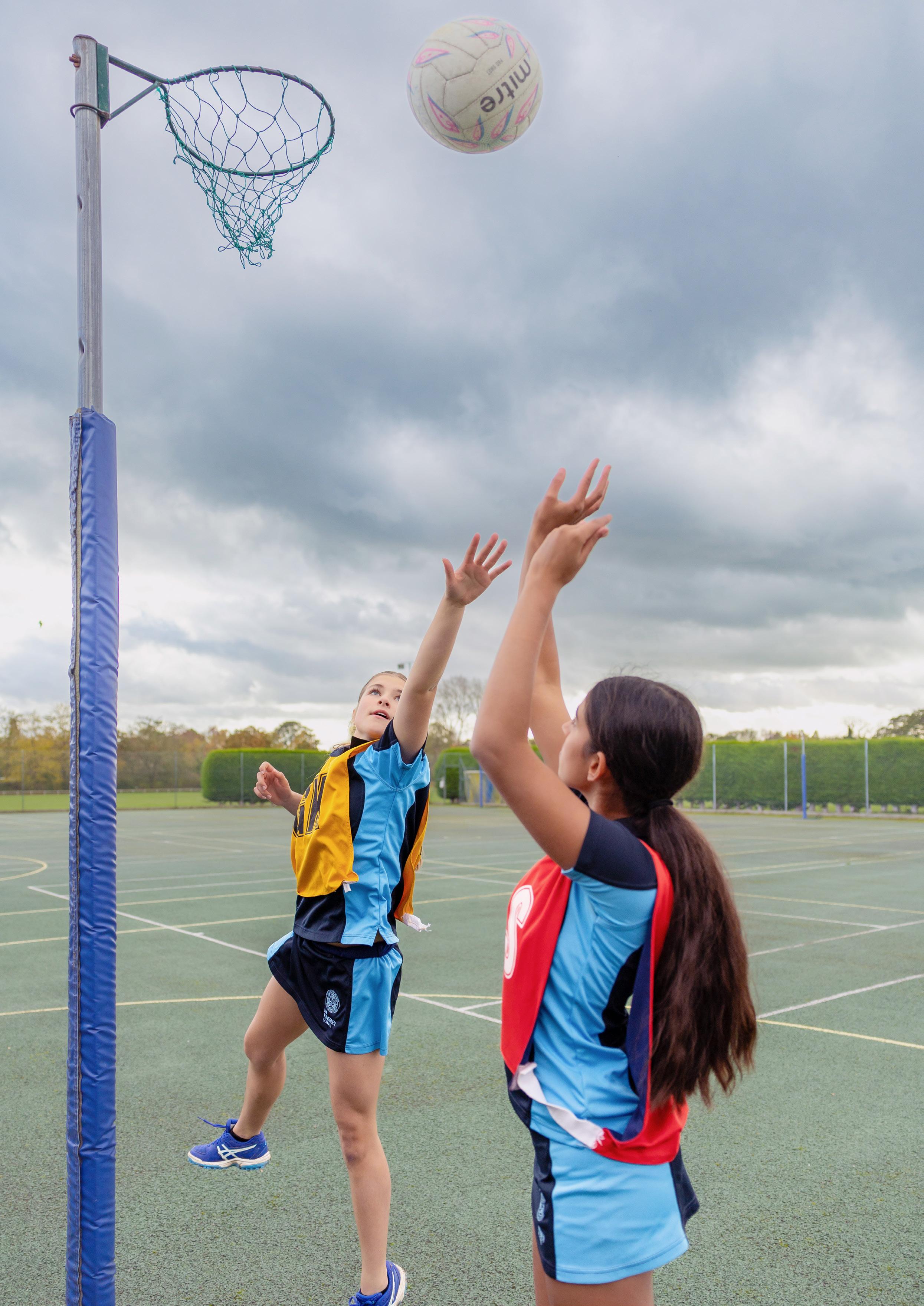
Meet Amy C, Angelina T, Amelia M and Lottie S – all Year 9 students with a keen interest in sport
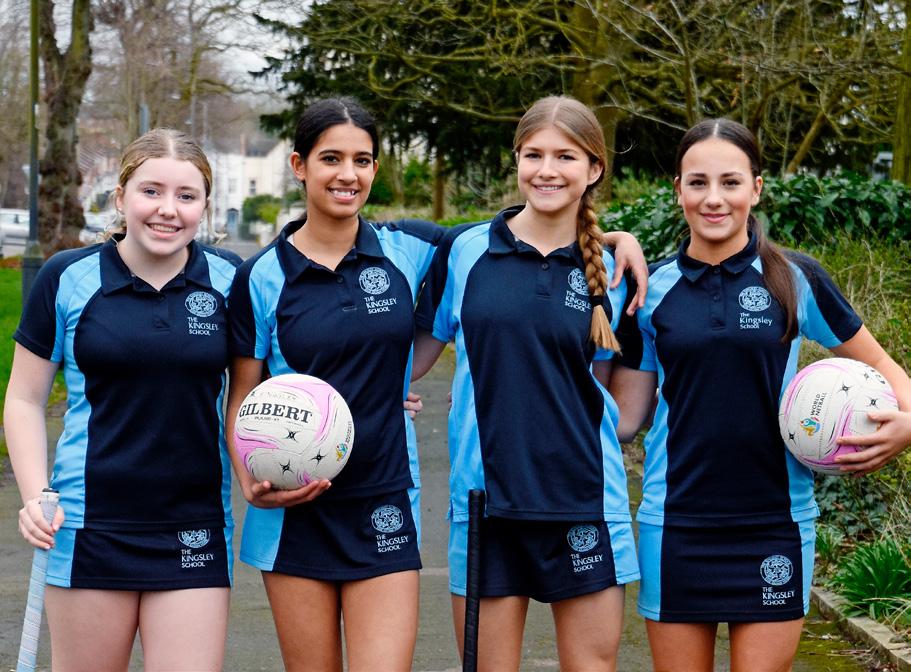
As we sit down to interview them, it’s clear that their passion for sport runs deeper than just scoring goals (although they do, of course, love a good win!). “I have always enjoyed sport,” says Amy. “It doesn’t limit me – it makes me feel free.” Angelina agrees: “Sport is very therapeutic.”
Amy and Angelina were both pupils at the Prep School before moving over to the Senior School in September 2021. They remember some of the first fixtures they played in. “Our class was small, so we all played in netball and hockey fixtures,” Angelina explains. “Everyone had the opportunity to get involved in sport and find out what they were good at. Moving up to the Senior School was exciting because it enabled me to join the netball team and play alongside more people who are as passionate as I am.”
Amelia and Lottie both came to Kingsley from other local primary schools. “I have always been active and enjoyed horse riding,” says Amelia, “but the school I attended previously wasn’t very sporty. We played netball, but we didn’t play in any matches. At Kingsley, my passion for sport has really grown. I’m on the school netball and hockey teams, and I ride with Kingsley’s Riding Squad.” Lottie also says her confidence has grown: “I did lots of swimming when I was younger, but Covid made it difficult to take up sports. Our PE lessons at Kingsley have been so enjoyable and really improved my confidence in hockey and netball.”
Both collectively and individually, the four students have some incredible achievements. Before we explore some of these, we ask them what makes a good sports person. “Practice is the key to any sport,” says Amy. “Across my three sports – netball, hockey and tennis – I
spend three evenings a week training, in addition to my lessons and training sessions in school. I then play in fixtures on Saturdays and Sundays.” Lottie adds: “You also need to enjoy sport. If you have fun, you’re more likely to continue and improve. I can see myself joining an over-18 hockey team when I leave school; I’ll keep playing in the future.”
Angelina and Amy both play county netball, and Amy and Lottie play for their local hockey clubs. Amy’s hockey team have just made it through to the National U14 Cup final, placing them in the top two teams in the country for their age group. In October 2023, Angelina was selected for the Severn Stars Nova Performance Academy. Based at the University of Worcester, the Academy provides talented U17 players with weekly training sessions, strength and conditioning programmes, high-level technical training, sports therapy and off-court support. Members also compete in monthly matches against other Nova Academies. “Playing alongside older players has really improved my game,” says Angelina. “In the future, I would potentially like to do something with coaching.”
Amelia also enjoyed one of her greatest sporting successes last year, qualifying for the National Championships at Hickstead, after placing 1st out of a class of more than 100. This year, she has been working hard with British Show Jumping, as well as training and competing with the Kingsley Squad. “Most schools don’t offer regular training sessions,” says Amelia. “The Kingsley Riding Squad trains every other week, so we get lots of practice in. I really enjoy our sessions.”
We move on to talk about collective successes, and Lottie recalls a particularly memorable netball match: “We played against King’s High in the Warwickshire Netball League final last year. They’re a really good team and we didn’t think we’d win, but we did!” Three of the students have just returned from a PGL residential weekend and they’re still buzzing. “We had so much fun,” says Angelina. “There were around 300 netballers competing and we came 2nd overall. The previous year was the best, though – Amy scored in the last minute of the final match and we came 1st!”
Angelina and Amy (pictured opposite) have recently been invited to join Kingsley’s new Talented Athlete Programme. As they move towards their GCSEs, the programme will support them in balancing the demands of their sports with their academic studies. Turn the page to read more.
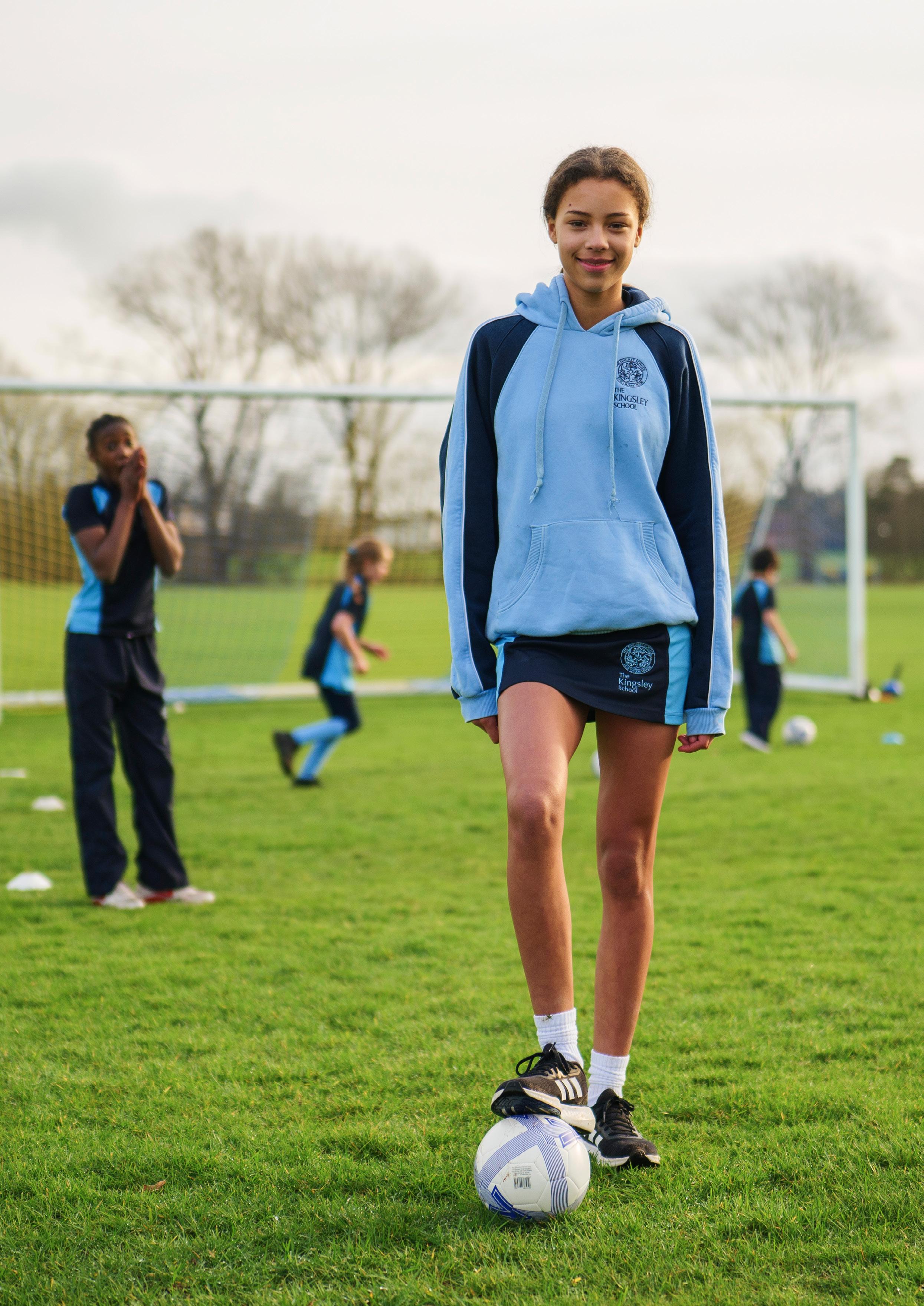
This year sees the launch of our new programme, designed to support our young athletes as they navigate their way to success within their sports
It is widely acknowledged that achieving excellence in any sport, or indeed any pursuit in life, demands unwavering dedication and (as our sports stars always tell us when we interview them for 1884 magazine) LOTS of practice! Balancing these commitments with the academic side of school life can be challenging. The Talented Athlete Programme aims to help our most committed and talented student-athletes fulfil the training and competitive elements of their sports, whilst also reaching their potential in their academic studies.
Embedded within the framework of the Talented Athlete Programme are a range of experiences, resources and support mechanisms. Each student-athlete is assigned a dedicated sports mentor, who they meet with on a halftermly basis (or more frequently if required) to discuss their progress and successes, along with any challenges they are facing, and plan their next steps. Strong student-teacher relationships are hugely important and a real benefit of attending a smaller school like Kingsley. This personalised approach to growth and development is a key element of the programme.
In addition to Q&A sessions with guest speakers, termly workshops hone specific skills and techniques, enabling our athletes to remain at the forefront of their game. The first workshop, held in January, focused on ‘The Power of the Mind’, looking in detail at the importance of mindset in sport, and how athletes can mentally prepare themselves for peak performance. The next workshop, due to take place in May and entitled ‘The Adolescent Athlete’, will look at some of the most common injuries in young athletes, signs and symptoms to be aware of, and preventative measures.
We are extremely fortunate to have joined forces with Prime Clinic in Leamington Spa. Katie and Remi Mobed and their team have a wealth of experience working with elite athletes. Katie is one of the UK’s most sought-after performance psychologists; she has worked with some of the world’s best athletes, including with Team GB for the last decade. Remi is a leading physiotherapist, specialising in both rehabilitation and performance; he has worked with the England Football and England Rugby teams. Our talented athletes will benefit hugely from their expertise and guidance.
Alongside additional academic support, individuals will receive support with scholarship applications and finding pathways to realise their full potential, both on and off the field. They will also be enrolled onto the Ignite Programme – an online programme designed to help them gain a deeper understanding of some of the pressures they could face in the sporting world, how to deal with these and, ultimately, enjoy their sport. Each 20-minute module focuses on a different topic such as ‘The High Performer’s Brain’, ‘Performing Under Pressure’, ‘Confidence’ and ‘Recovering from Setbacks’.
Year 8 student, Maisie C (pictured opposite), is a keen athlete and footballer. When she joined the Senior School in September 2022, her PE teachers quickly recognised how talented she was and nominated her for county trials. She now plays football for Warwickshire and coaches younger pupils in the Prep School. “The experience has developed my understanding of football,” reflects Maisie, “not just as a player but also as a coach and a referee.” Maisie is pleased to have been invited to join the Talented Athlete Programme, saying: “The programme will improve my knowledge of how to keep fit and motivated. It will also help me deal with some of the pressures that come with playing competitive sport.”
As our Talented Athlete Programme becomes firmly embedded, we look forward to witnessing the growth and achievements of each and every participant. For further information about the programme, please speak to our Director of Sport, Mrs Warrillow. For an overview of sport at Kingsley, scan the QR code below to watch a short video.
“The programme will improve my knowledge of how to keep fit and motivated.”

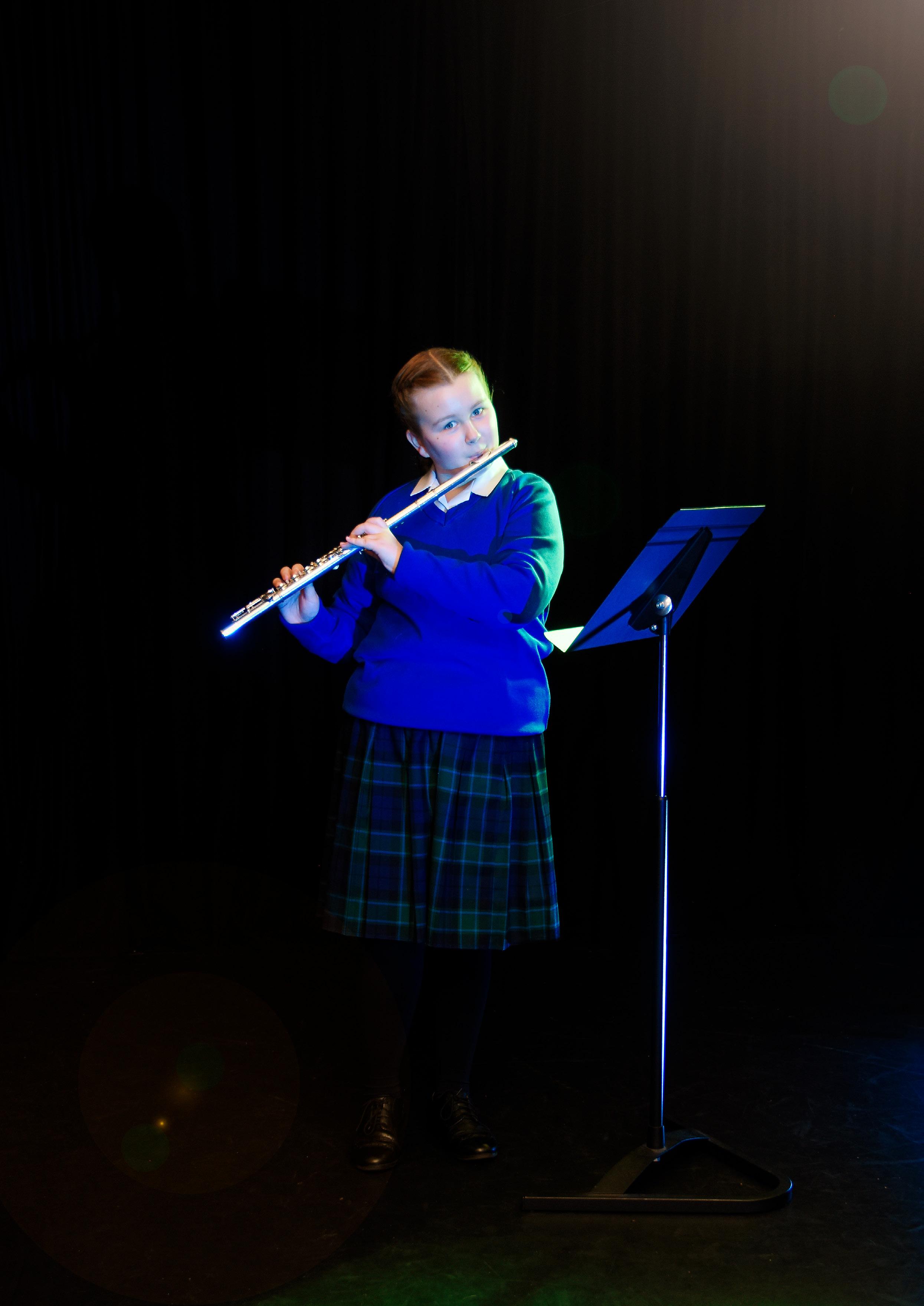
“It’s really rewarding when people hear you perform... it makes all of the hard work worthwhile.”
Emily S, Year 5
Prep musician Emily is currently preparing to take her Grade 1 flute examination. Before taking up the flute, she learned to play the fife – a smaller and lighter instrument with just six finger holes, making it easier for younger players to master the basics of a woodwind instrument. Emily also plays the piano. “The piano is much harder to play than the flute,” she explains, “because you have two lines of music to read and two hands to think about. Your brain gets a really good workout when you have a different tempo going on in each hand!” Emily is getting ready to take her Piano Prep Test, which evaluates basic technique, musical understanding and sightreading abilities in a supportive and non-intimidating environment. After this, she will begin working towards her Grade 1.
Emily’s instrumental lessons all take place in school. Her piano teacher, Mrs Murphy, describes her as “a keen pianist who is always fascinated by chords and how music is put together”. Her flute teacher, Miss Martin, is also full of praise, saying: “Emily is a really creative and enthusiastic musician. She enjoys improvising and composing her own flute pieces and songs, and last year performed one of her compositions in a Prep School concert. Emily’s joy in making music always shines through, and she loves playing in groups and performing.” As with all good musicians, Emily’s dedication to her music extends beyond structured lessons; she practises both before and after school most days, and finds it a brilliant way to relax and unwind.
Emily has recently started playing her flute alongside Prep Strings, gaining invaluable ensemble experience and exposure to a wider range of music. She describes the feel-good factor of playing with other pupils: “We have so much fun together! It’s a small group, so if someone makes a mistake then nobody minds. We’re currently learning to play ‘Mayo Morrins’ – a piece of Irish-like dance music – and ‘Bohemian Folk Song’ for our next concert, which is really exciting.”
Emily also enjoys performing. Having taken up ballet and drama at a young age, she is used to being on stage. When she was four years old, she performed in a West End production of ‘Madagascar’ with the Pauline Quirk Academy. She has since performed in various theatre productions with different companies, most recently with Art Insight at the Loft Theatre. “I don’t really get stage fright,” she says. Emily performs as a soloist in the Prep School’s teatime concerts. She also takes part in whole school concerts, which are generally held at the end of each term. “It’s really rewarding when people hear you perform and say, ‘Wow, that was amazing,’ because it makes all of the hard work worthwhile!”
Emily is looking forward to progressing through her grades and playing in a wider range of ensembles when she moves up to Senior School. Our Year 7 Instrumental scheme gives all Year 7 pupils the opportunity to learn a new musical instrument, enabling experienced musicians like Emily to add another instrument to their repertoire (more on the next page). Emily’s advice to others who are just starting to learn the flute, piano or any instrument is: “Don’t give up! Learning an instrument is hard to begin with, but the more you practise the better you become – and the better you become, the more you enjoy playing.” We’re excited to see where Emily’s musical journey takes her in the future, and wish her all the best with her upcoming exams.
“Emily’s joy in making music always shines through, and she loves playing in groups and performing.” Miss Martin
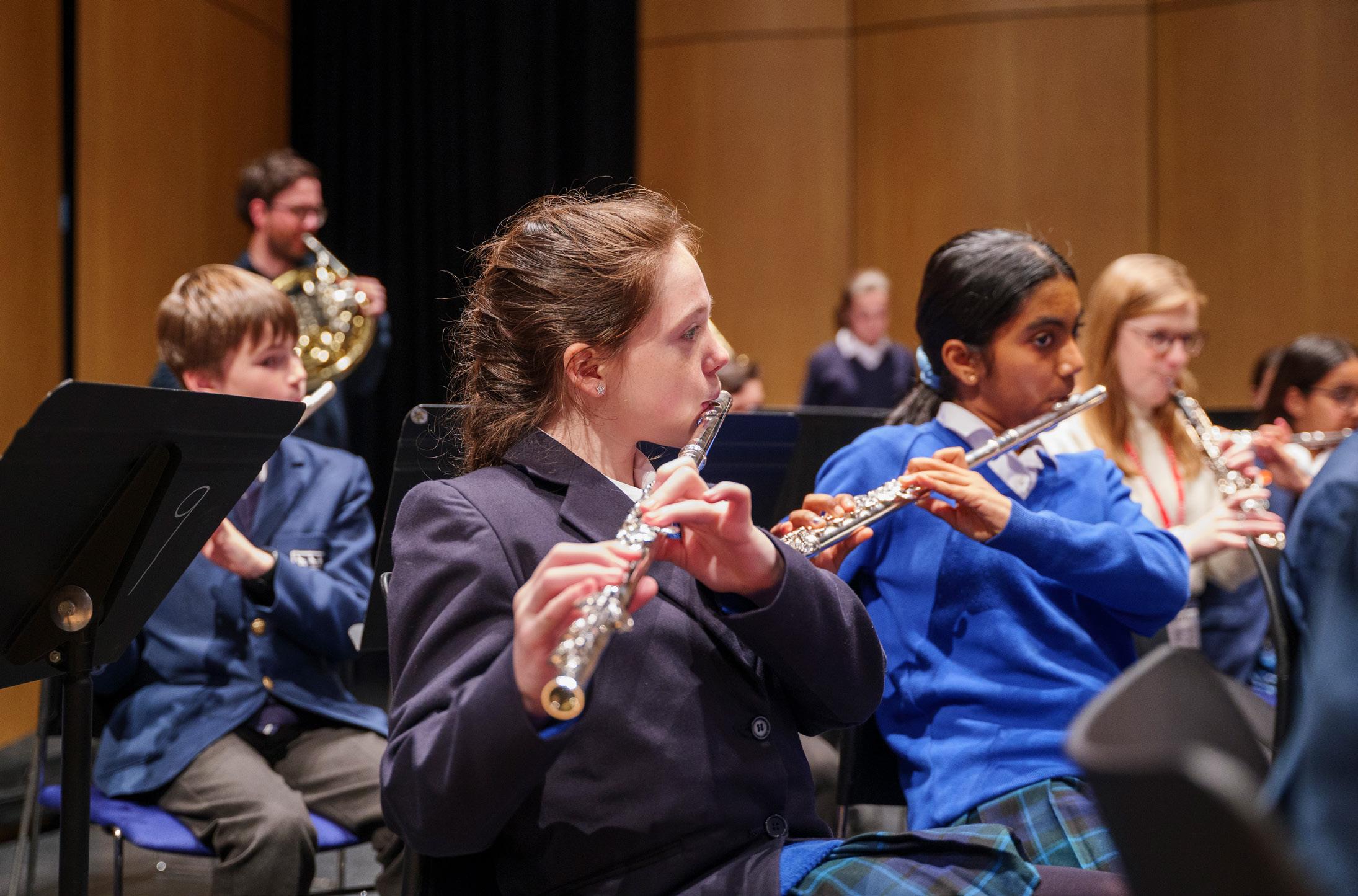
We launched our new Instrumental Scheme at the start of the 2023/24 academic year, giving all Year 7 students the chance to learn a woodwind or brass instrument
The benefits of learning to play a musical instrument are widely recognised. It enhances creativity, discipline and self-confidence, and improves overall wellbeing. A recent study reported that students who play musical instruments do better in science, maths and English than their non-musical peers. Furthermore, playing music in a group setting promotes teamwork, collaboration and social interaction.
Kingsley has always had an outstanding reputation for providing a well-rounded education, giving students many different opportunities to explore their artistic and creative talents alongside their academic studies. The introduction of the Year 7 Instrumental Scheme further strengthens the school’s offering. It has been designed to cater for a wide range of musical abilities, from complete beginners to those with prior experience. Students have always been encouraged to sing in the school choirs and in musical productions; this new scheme will allow for every pupil to access our vibrant instrumental ensembles as well.

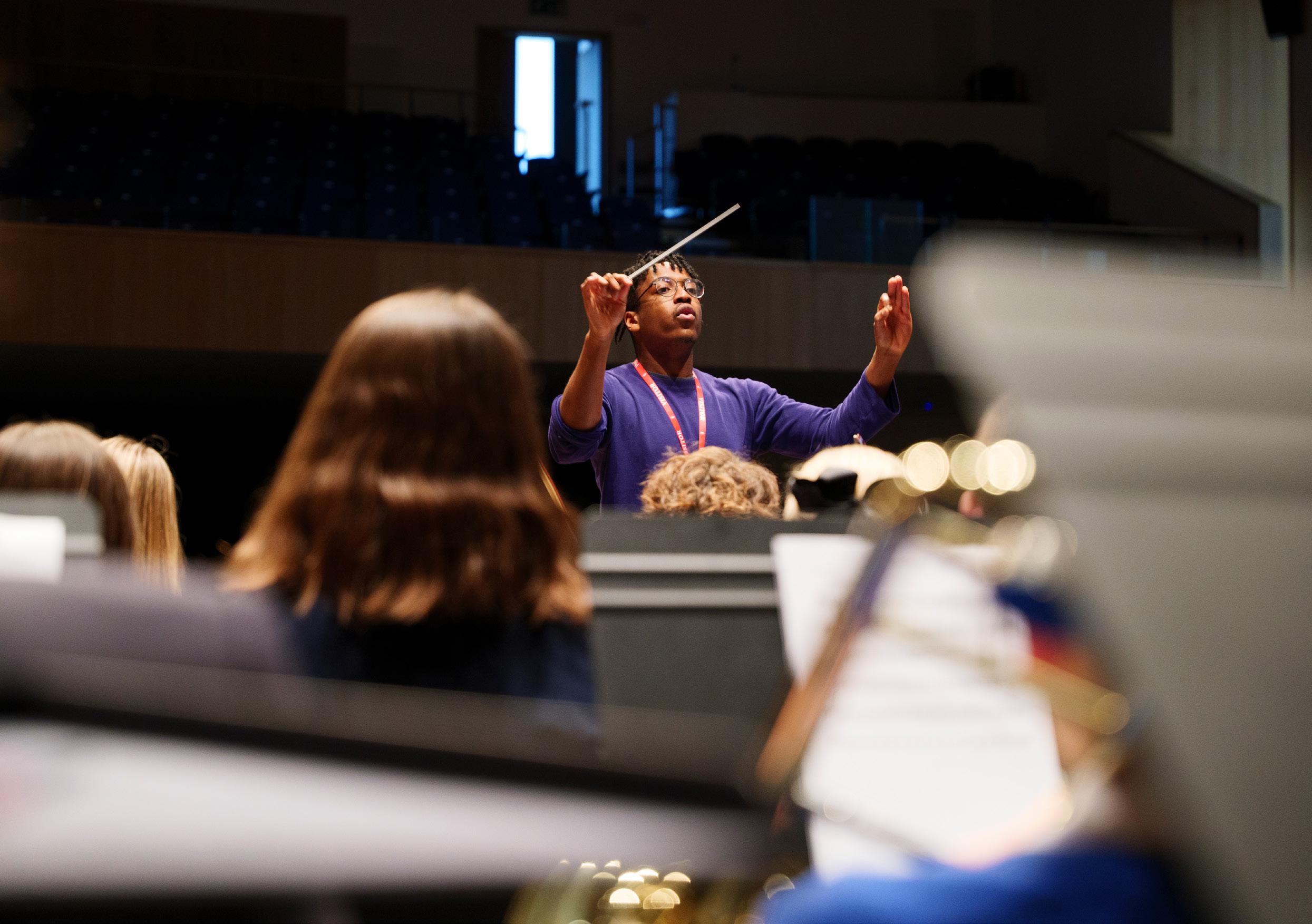
Head of Music Mr Chambers says: “We have invested in a wonderful selection of new instruments, giving every Year 7 student their own musical instrument for the academic year. We also have a strong team of highly skilled and experienced teachers to guide them through their musical journeys.” Mr Chambers – who is also Director of Music at St Hugh’s College, Oxford, and has held Head of Music positions at a number of schools in and around Oxfordshire – has experience of launching and overseeing similar instrumental schemes.
The Year 7 music curriculum is delivered through the new instrumental scheme, with students consolidating their note-reading and listening skills alongside their instrumental tuition. It includes various performance opportunities, allowing parents to hear the fruits of their children’s work. Parents may even be encouraged to dust off their own musical instruments, or follow suit in taking up a new one! Our Year 7 ensemble will perform alongside long-established Kingsley ensembles, such as the Swing Band, Flute Choir and String Orchestra, in addition to our many choral groups.
The scheme brings Kingsley in line with its sibling schools within the Warwick Schools Foundation. More and more of our students are joining Foundation ensembles, with Kingsley pupils already playing in Supertonics, the Foundation Wind Orchestra and the Foundation Symphony Orchestra (more on the next page). Our Year 7s were recently invited to play ‘Trepak’ by Tchaikovsky (from ‘The Nutcracker’) alongside Orchestra of the Swan and students from other Foundation schools.
“I’m learning to play the flute. This is my third instrument. Performing with Orchestra of the Swan was amazing!”
Sofia K-S, Year 7

Not only does FSO rehearse and perform some of the greatest orchestral music ever written, but it does so to a standard on par with any other youth orchestra in the country. FSO has a highly dedicated and reliable membership. Entry is from Year 9 and by invitation only. A minimum of Grade 6 standard is required for most instruments, although, as with entry to national youth ensembles and conservatoires, the required standard is higher for some instruments.
A team of professional orchestral musicians – all dedicated Foundation music staff – tutor the individual sections on a weekly basis. It goes without saying that they have a hugely positive impact on the confidence and cohesion of the orchestra.
Music selection is crucial to the success of any orchestra. Choosing from 500 years of classical music is no easy task! The formula that seems to work for FSO is to keep everyone busy, and to make it challenging yet achievable and engaging for players and audience alike. Unlike most school orchestras, FSO only performs the original versions of pieces. When they play ‘Main Title’ from ‘Star Wars’, you can rest assured it is the original movie version.

FSO benefits enormously from its relationship with Orchestra of the Swan (OOTS), which is enjoying a successful residency at the Foundation. We have hosted a number of side-by-side events, giving students the chance to rehearse and perform with their professional counterparts. Our mentoring scheme enables students to converse with OOTS musicians about music making, the orchestral profession, and the routes that lead there.
Foundation Symphony Orchestra members also benefit from specially organised trips. In 2023, they enjoyed a residential trip to Dunfield House on the Welsh border to kick-start rehearsals for their next performance, which featured a smorgasbord of orchestral treats from Mozart, Beethoven, Sibelius and others. Happily, the residential will become an annual event from now on. There are also plans in the pipeline for a concert tour to New York. Exciting times ahead for all involved!
FSO doesn’t belong to one school more than any other. Instead, it exists as a shared platform, bringing pupils from Warwick School, The Kingsley School and King’s High School together in pursuit of something greater than the sum of its parts. What better analogy could there be for the Foundation as a whole?
Kingsley flautist and music scholar, Amelie H (Year 10), joined FSO in September 2023. She attends practices every Friday and has recently been involved in a week of concerts at Warwick Hall, including an FSO performance of ‘The Thieving Magpie’ by Rossini.
“I really enjoy being part of the orchestra,” says Amelie.
“There are lots of different instruments, and the other musicians are all very nice. Our section leader, Miss Argent, supports us during rehearsals; she gives us advice and helps us with splitting our parts.” Amelie has been a member of the Junior Royal Birmingham Conservatoire since September 2020, where she trains every Saturday. She has recently passed her Grade 8 flute with Distinction, and her Grade 6 piano.
Senior School students Lottie (Year 7) and Buddy (Year 8) were delighted to be accepted onto the cast of ‘Nativity the Musical’, with performances taking place throughout December at the Bridge House Theatre (at the Foundation’s Warwick campus). The dynamic young cast of 69 students – hailed from 39 schools – brought together some of the best talent from across the Midlands. The students performed alongside a professional cast of actors, benefitting immensely from their expertise.
‘Nativity the Musical’ follows a Coventry-based primary school, St Bernadette’s, where teacher Mr Maddens and his assistant, Mr Poppy, mount a musical version of the nativity with the students, promising it will be adapted into a Hollywood movie. The musical features songs from the film including ‘Sparkle and Shine’, ‘Nazareth’, ‘One Night One Moment’ and ‘She’s The Brightest Star’.
The show’s Director, Mike Perry (also Director of Drama at Warwick School), commented: “This musical encapsulates all that is wonderful, resilient and joyful in schools, championing the value of arts education.” Theatre Operations Assistant and Outreach Manager, Imogen Tong, said: “The natural talent of the young company has shone through scene after scene but, more than this, the thing that has made me sing (sometimes literally) is how dedicated to the process they have been. Consummate professionals, every single one.”
Congratulations to Lottie, Buddy and the rest of the cast on a truly outstanding musical production!
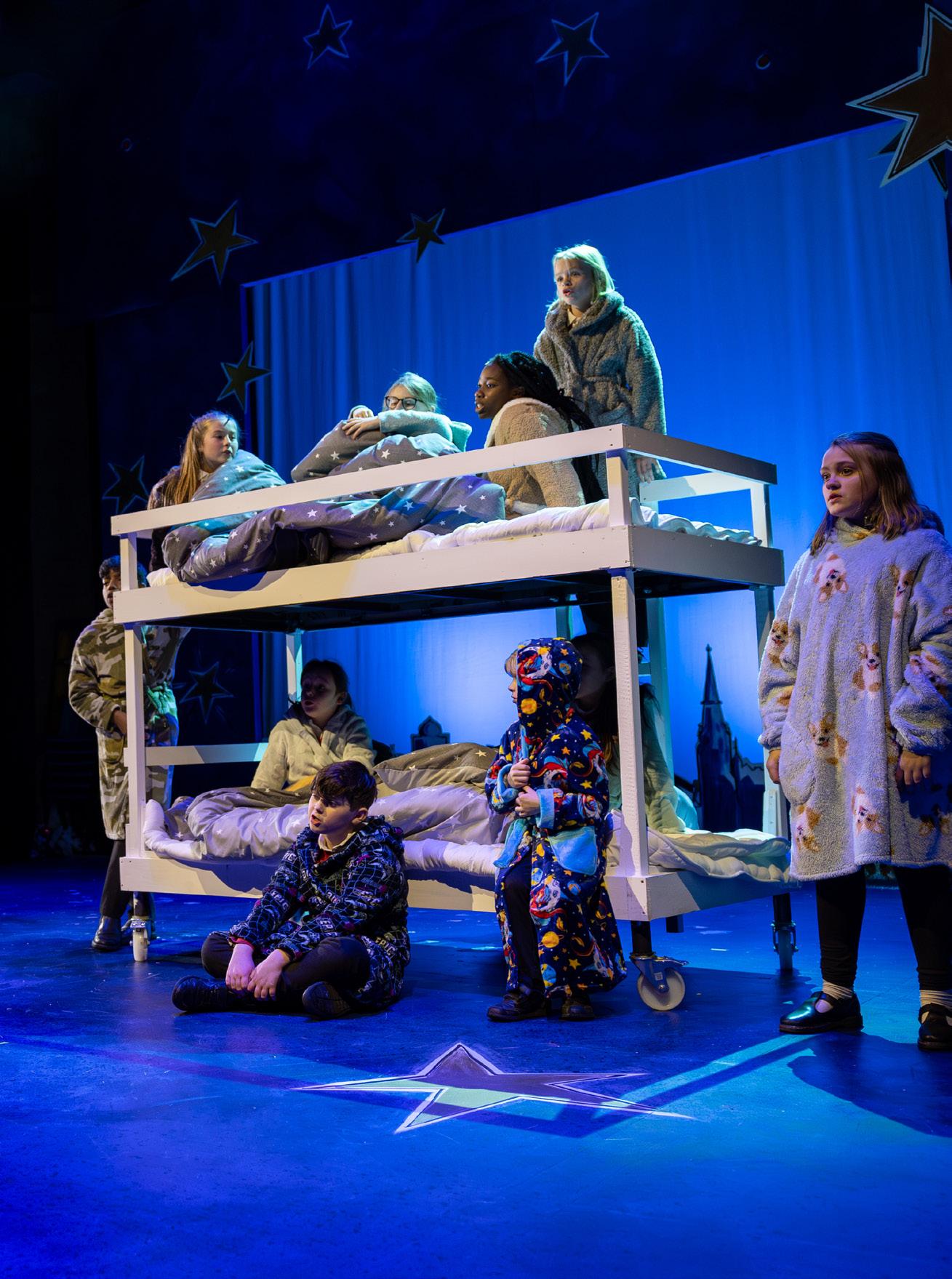
“Working with professional actors was such good experience and I made lots of new friends. I was sad when it was all over!” Lottie H, Year 7
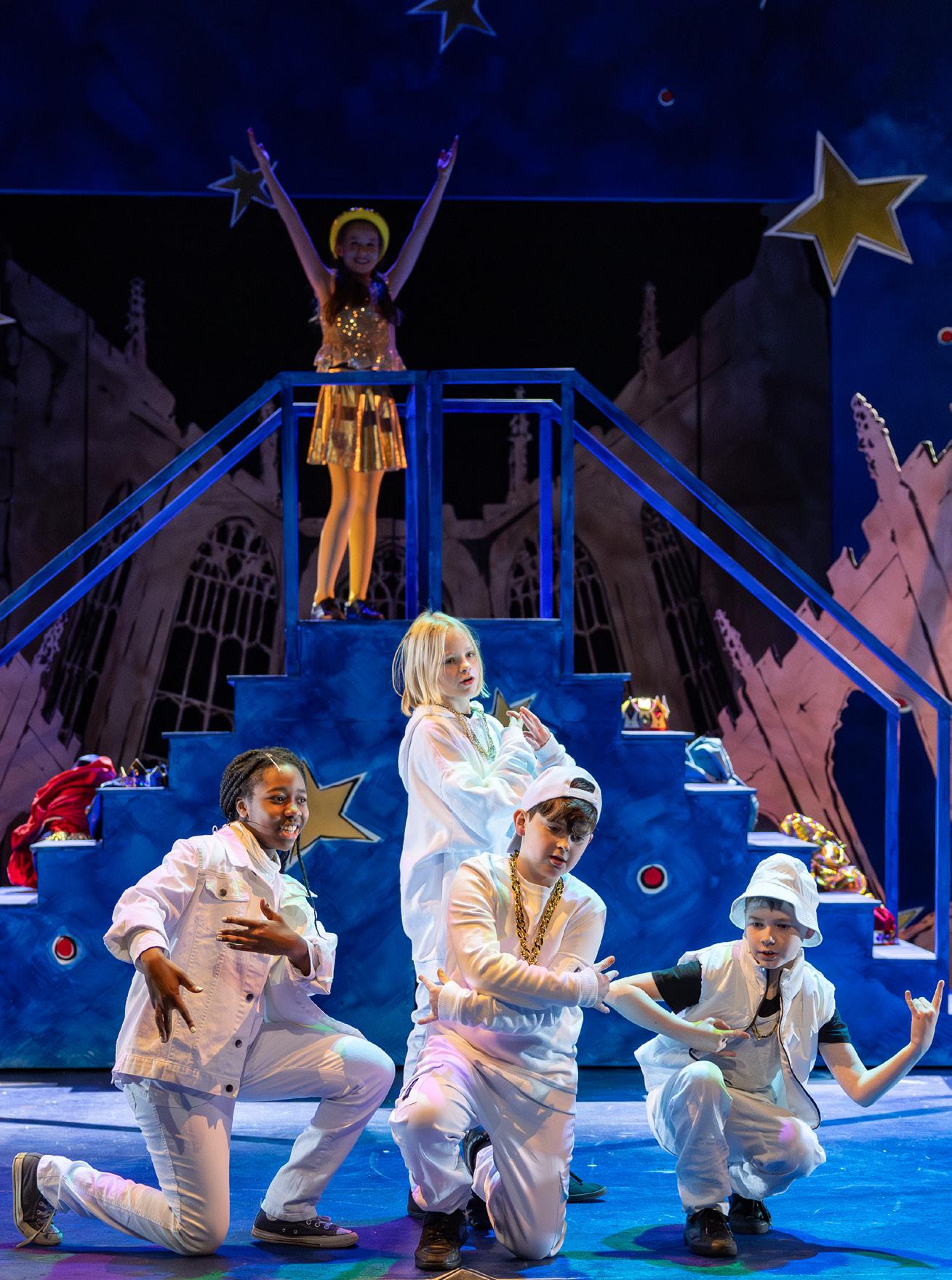
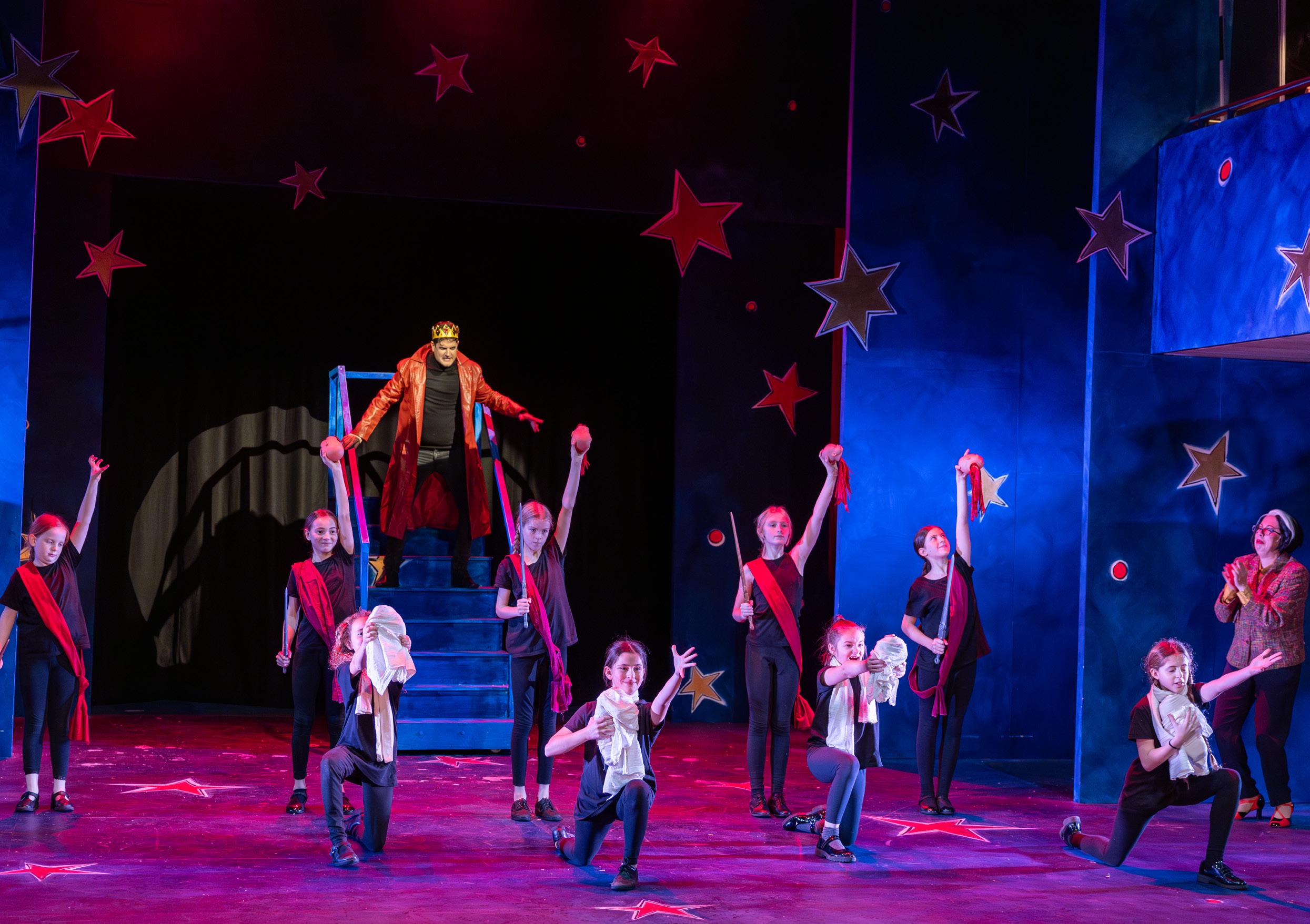
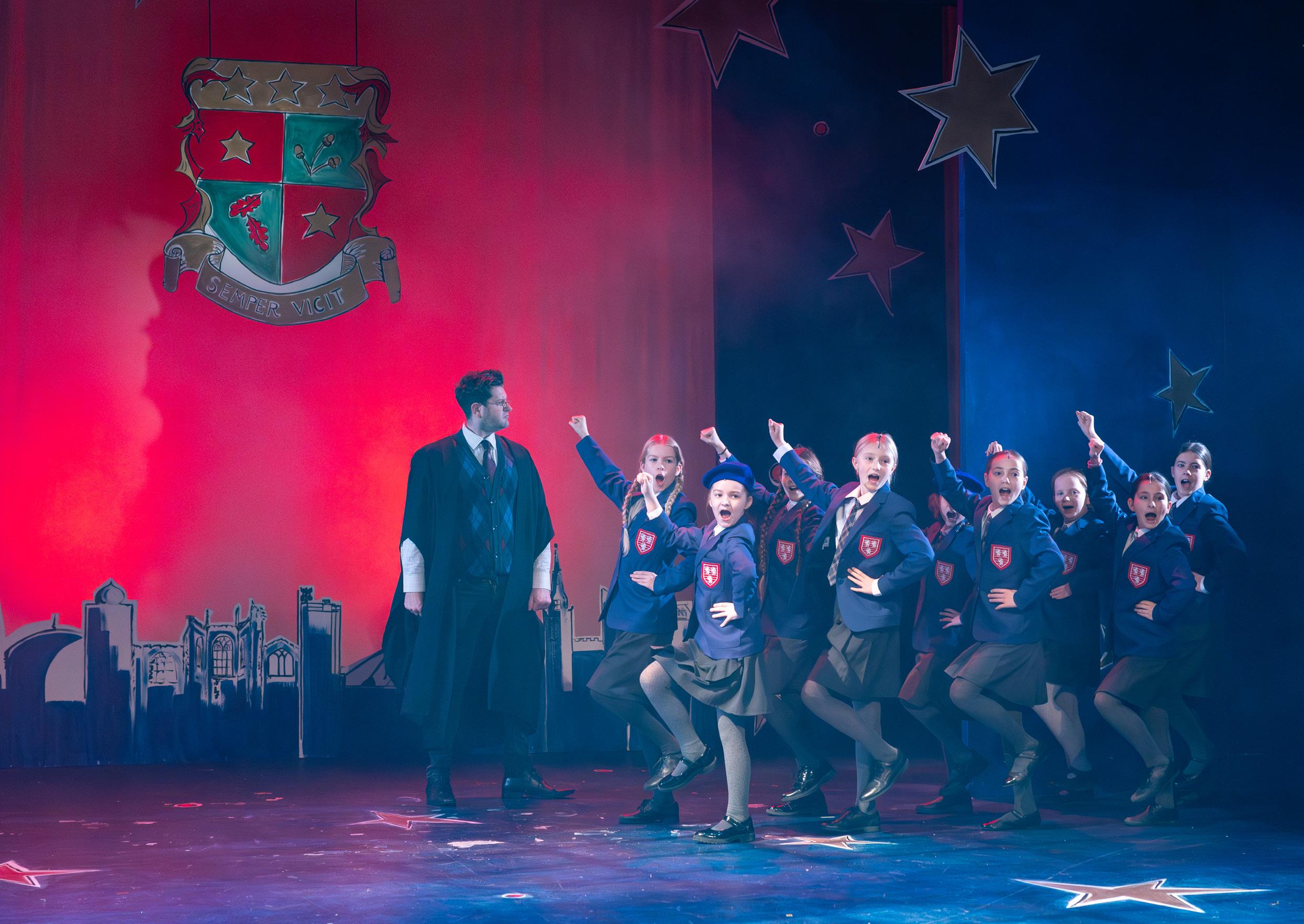
Two talented casts of Senior School students stage an outstanding production of ‘Shrek the Musical’
The hilarious and heartwarming adaptation of the animated film tells the story of Shrek, a green ogre who loves nothing more than the simple swamp life. Things get complicated when the swamp is overrun by fairy tale creatures who have been evicted by the ruler of Duloc, Lord Farquaad. To get his swamp back, Shrek strikes a deal with Farquaad, who wants to marry the beautiful, yet cursed, Princess Fiona in order to rule the Kingdom. Unfortunately, this involves rescuing her from a castle protected by a fearsome fire-breathing dragon.
The two brilliant casts featured students of all ages, with Maddie G (Year 12) and Neave P (Year 11) playing Shrek, Rebecca S (Year 10) and Tilly C (Year 10) playing Fiona, Kitty B (Year 10) and Sophia L (Year 10) playing Donkey, and Ava C (Year 10) and Ffion P (Year 11) playing Farquaad. Performing over three evenings and an afternoon to packed audiences, the students delivered their lines with enthusiasm and wit (our two Shreks with very convincing Scottish accents!), and sang their hearts out. Accompanied by a live band, conducted by Mr Chambers (Head of Music), songs included ‘Big Bright Beautiful World’, ‘Story of My Life’ and ‘I Think I Got You Beat’.
Mrs Smith, who directed the show, commented: “Our cast members have worked tirelessly to learn their lines, lyrics and dance routines, and all of their hard work has paid off. Each and every performance has been outstanding – full of energy and truly uplifting, with so many laugh-out-loud moments! I couldn’t be prouder of them. Well done, and a huge thank you to everyone who has has been busy behind the scenes – it’s been a real team effort.”
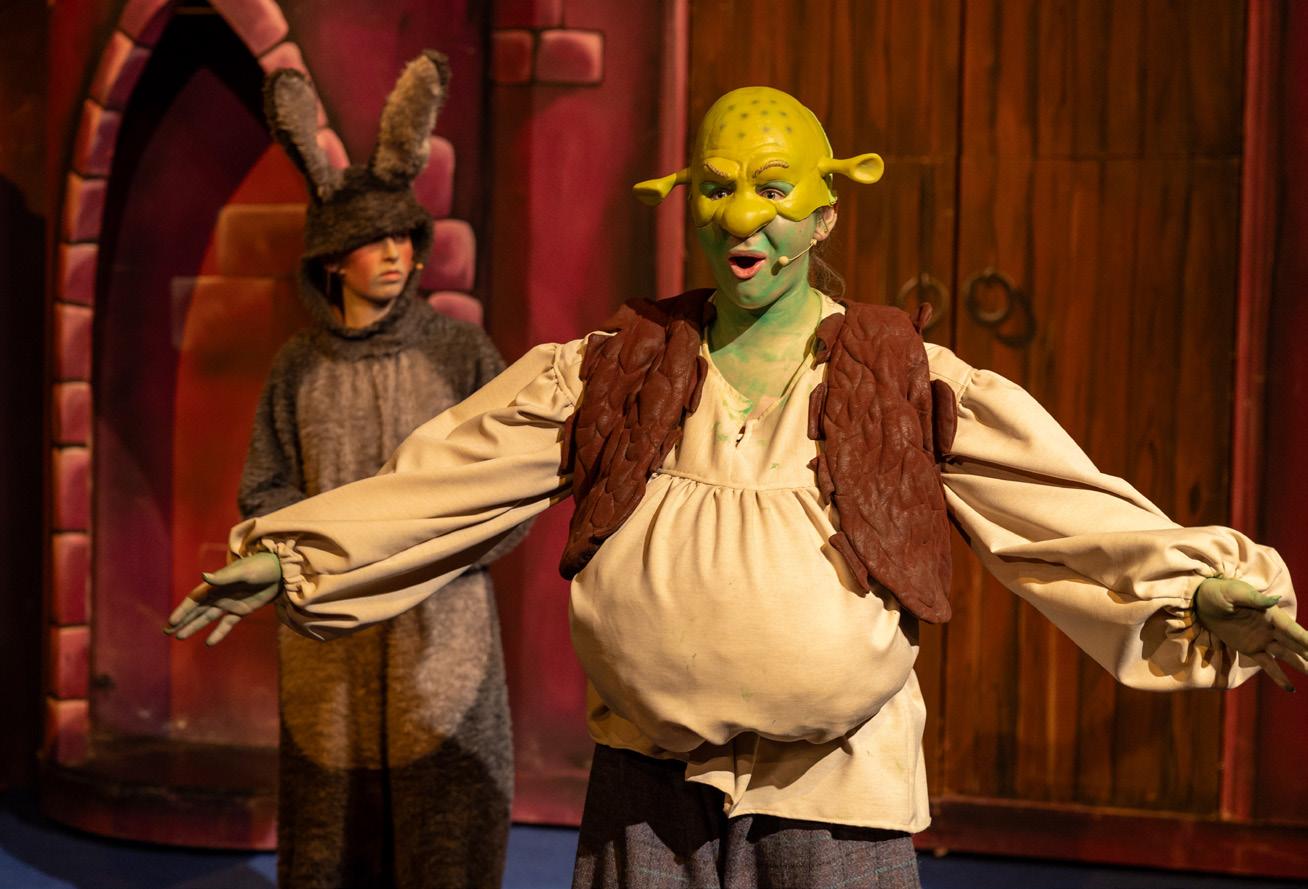

“I have embraced my Scottish heritage and will be stained green, both physically and metaphorically, for many weeks to come!” Maddie G (Shrek)





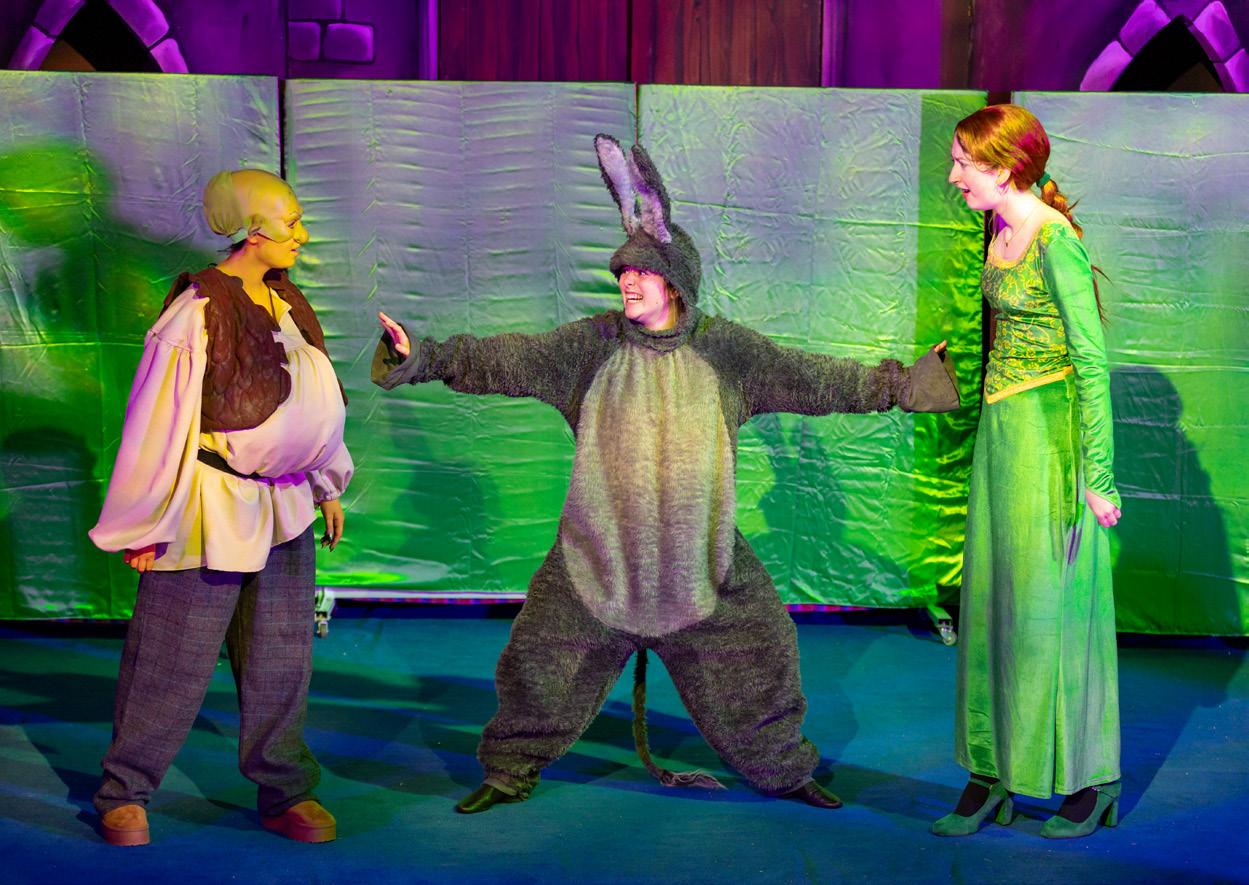

As Kingsley approaches its 140th birthday, staff alumna and archivist Rebecca Dyson reflects on past anniversaries HAPPY BIRTHDAY TO US!
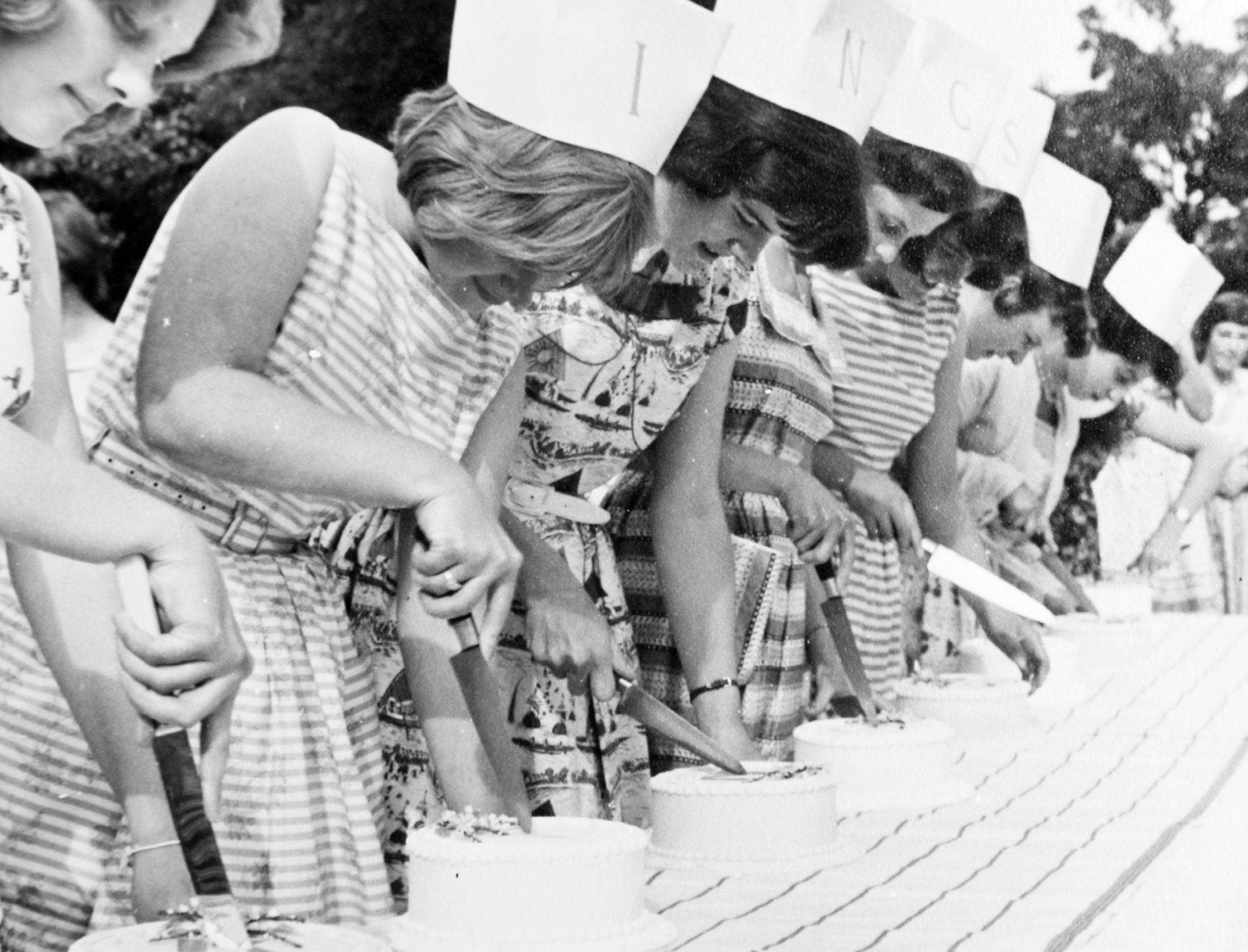
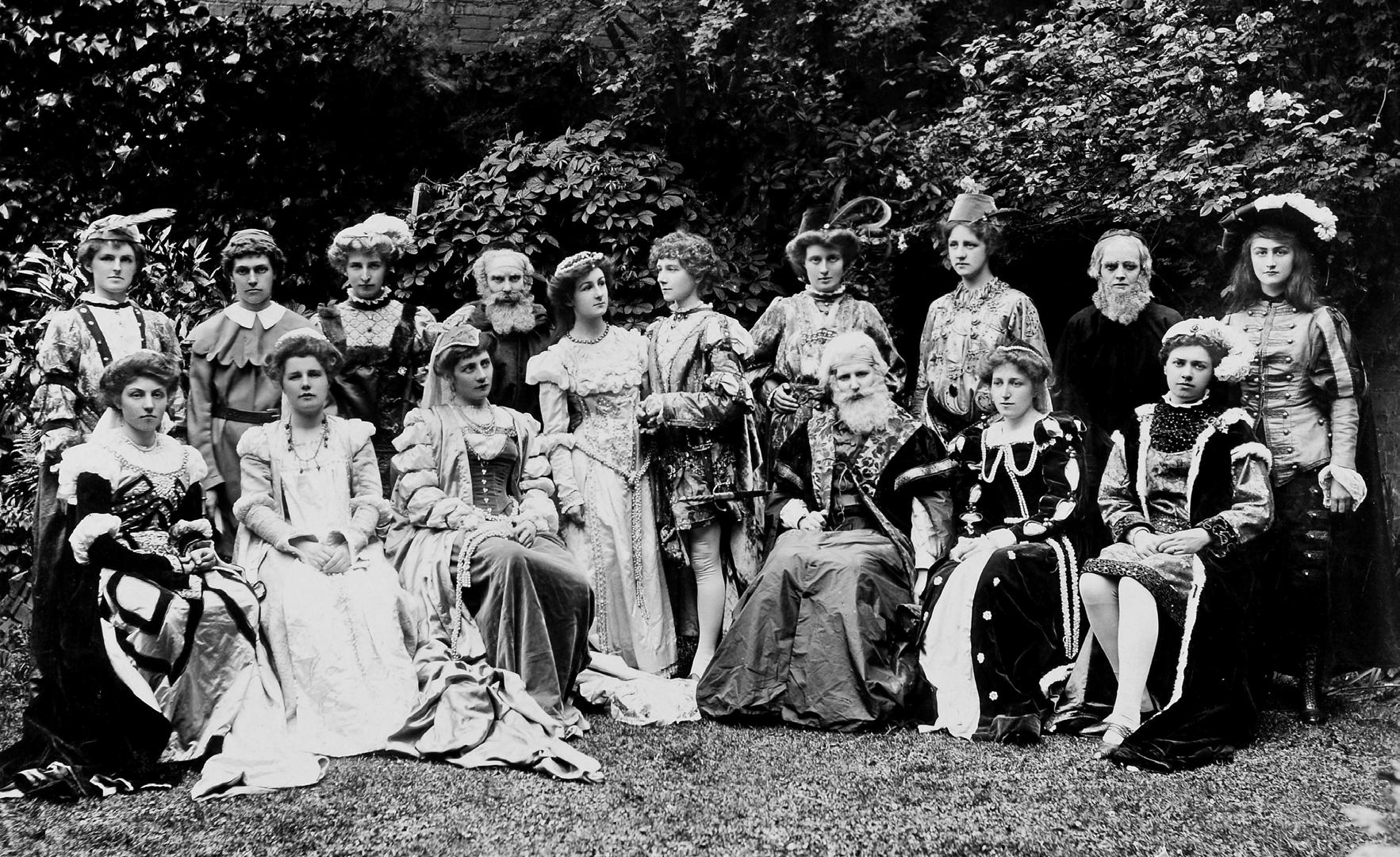
Everyone loves to celebrate an anniversary; it reminds us of our past and excites and propels us forward to the next big step. This September will be Kingsley’s 140th birthday.
The school archives show that past birthdays involved vibrant and lively celebrations with parties, sport, music and drama, but we have to add our imagination to the moments frozen in the photographs. Even more so when we look at the black and white images, where we also have to add some colour.
At the 50th birthday dinner, a former Head of English, Miss Willcocks (who left the school when her first novel was published in 1908), remarked: “Memory is like a sundial that only registers the happy hours.” Fortunately, we have photographs to help recreate those magical moments when current students, alumni and staff came together, just as we do today, to mark the special days.
Our 21st birthday is remembered through the wonderful photograph of one of the plays performed, but there were also lunches and teas and a cricket match. They may look solemn and serious, but there was plenty of laughter and energetic fun.
By the time the school reached its 50th year it had moved to Beauchamp Hall. The garden was the natural hub for a grand production of ‘The Canterbury Tales’ along with afternoon teas and sherry and memories for alumni, including a few of the very first students.
OPPOSITE PAGE: Cutting the cakes on the school’s 75th birthday (1959)
ABOVE: 21st birthday alumni production of ‘Romeo and Juliet’ (1905)
RIGHT: 50th birthday production of ‘The Canterbury Tales’ (1934)
“Memory is like a sundial that only registers the happy hours.” Miss Willcocks, 1934
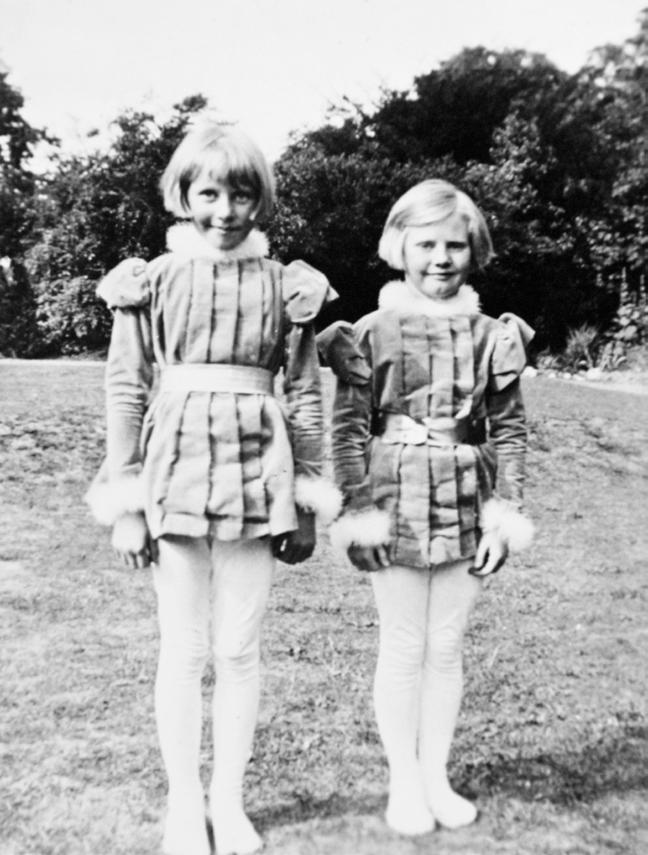
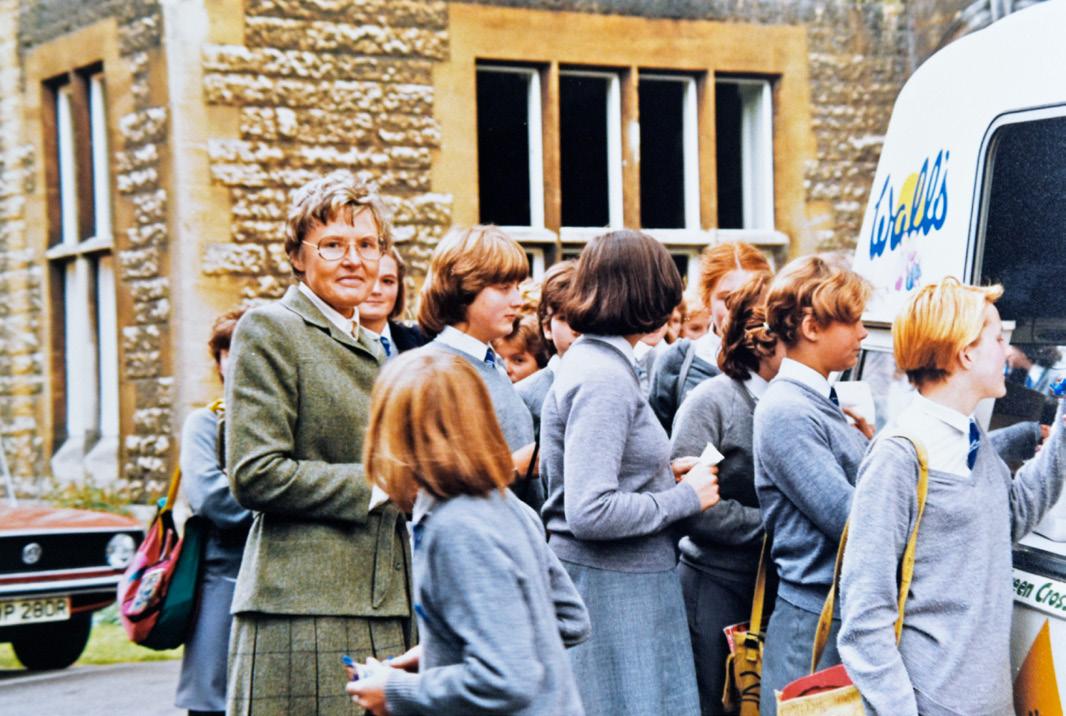
Birthdays have sometimes been a catalyst to launch fundraising campaigns. There were many cakes cut to celebrate 75 years; a building fund was also started to provide new science laboratories and a home economics room. Or in the case of our 125th birthday, the old temporary classrooms were taken away and a new garden area created, with pond and a hidden time capsule.
The centenary was a great landmark to reach and the school marked the occasion in a wide variety of ways. The retiring Head of History wrote a comprehensive history of the school, there was a ball at the Town Hall, two open days, an ice cream van with treats for the whole school, and a huge outing in a convoy of coaches to Woburn Abbey to see the animals and enjoy the funfair rides. Celebrations culminated with a piano concert given by alumnus Denis Matthews and a splendid historical pageant of the whole 100 years of school life.
In 2009, the 125th birthday led us to examine the wider historical context of the times the school had passed through. Students and staff were divided into groups and they each studied a decade. At the end of their research, the groups presented their findings as a display and in an all-singing, all-dancing performance. Sport also played a prominent role in the 125th celebrations, with Aston Villa superstar Dion Dublin and Olympic and Commonwealth Games badminton champion Tracey Hallam running sports masterclasses for Kingsley students.
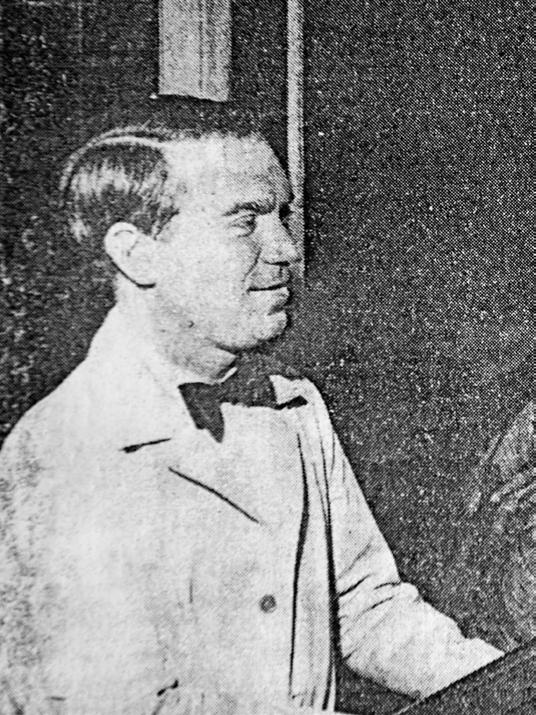
ABOVE: Headteacher, Miss Fairhurst, and students queuing for birthday ice creams (1984), the arrival of the birthday cake (1984), Aston Villa superstar, Dion Dublin, with Kingsley students (2009)
LEFT: A newspaper clipping of alumnus Denis Matthews at the school’s 100th birthday piano concert (1984)
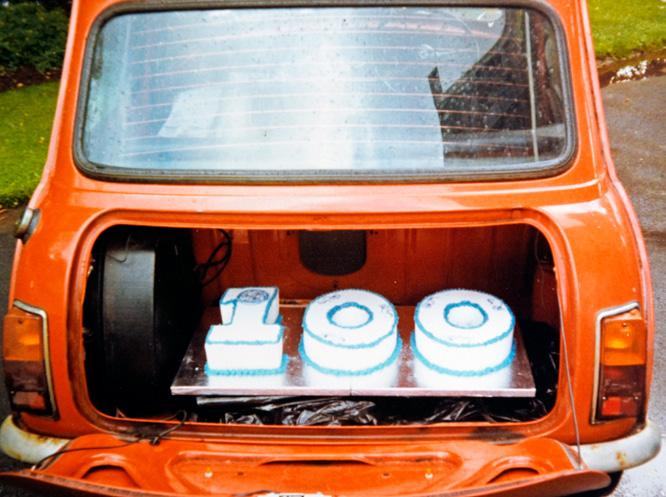

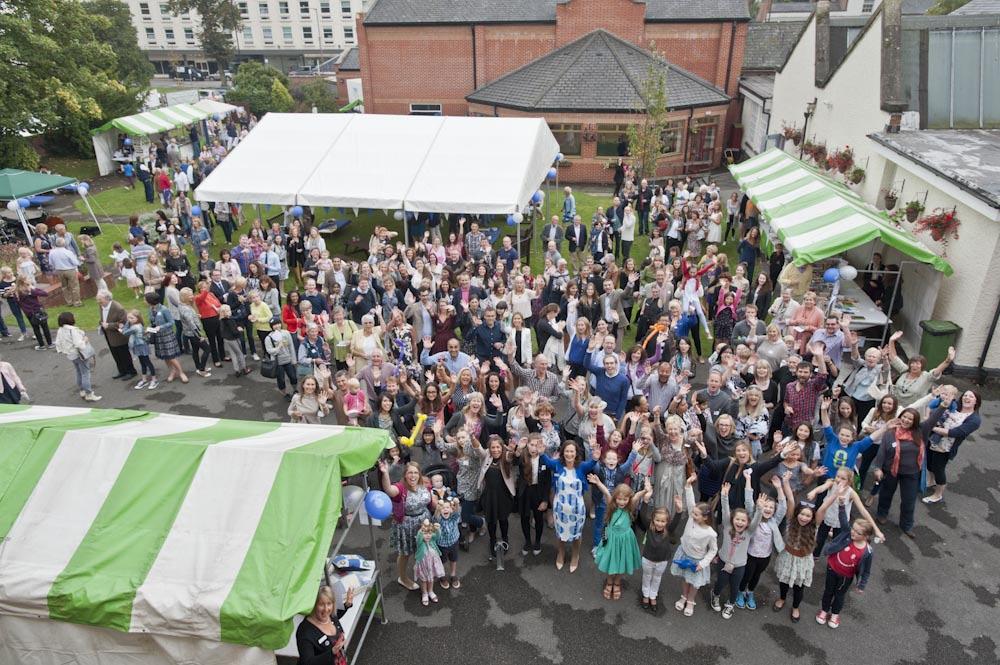
Our birthday celebrations have rarely been larger than the garden party thrown to mark 130 years. The celebrities on this occasion were past and present students and their parents, who turned out in huge numbers. Over 750 people attended the event and filled the school and garden with joy and laughter. How could we top this for fun? By bringing in the big top of a circus to mark our 135th. There was still a garden party and an art exhibition in addition to the spectacle provided by aerialists, acrobats, clowns and magicians! A new book, entitled ‘135’, was also published, containing a wealth of information about the school’s history and photographs from the archives.
In September 2021, the school celebrated its first birthday as part of the Warwick Schools Foundation. To mark this special occasion, and its 137th year, a ‘Big Birthday Bash’ was held at the sports field. There were traditional games, obstacle courses and a whole school pass-the-parcel. In the evening, parents joined us for birthday cake and musical performances from students and alumni, including recording singer/song-writer Bronte Clare.
The students and staff who have passed through the school in the last 140 years may have lived through times we find difficult to imagine: of horse-drawn vehicles, devastating World Wars, economic upheaval and technological revolution. However, they, like us, were all part of this amazing community, and we can now experience the magic of the next landmark birthday. So happy 140th birthday to Kingsley and to all in our community!

LEFT: 130th birthday garden party, attended by more than 750 guests (2014)
BELOW: 135th birthday circus (2019), Kingsley’s ‘Big Birthday Bash’ to mark 137 years and its first birthday since joining the Warwick Schools Foundation (2021)
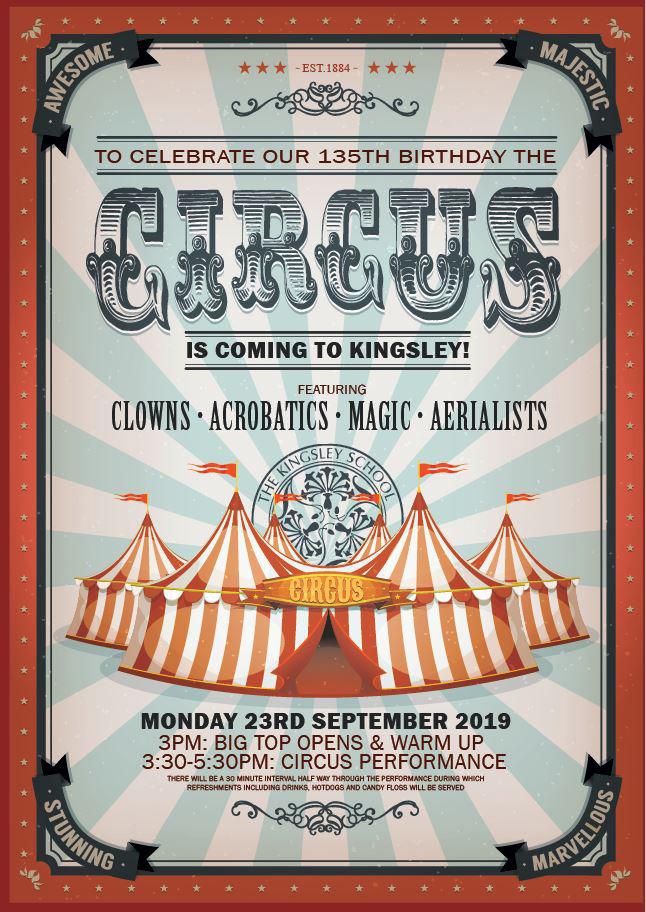


In September 2022, as most of her friends were packing their bags for university, Kingsley alumna Molly Hunt was gearing up for a very different adventure
When we meet with Molly, she has just returned home for Christmas following her initial training at RAF Halton in Buckinghamshire – an intensive 10-week course that all non-commissioned recruits are required to complete, regardless of their point of entry. Before delving into the highs and lows of this experience, we ask Molly to cast her mind back to when she was a student at Kingsley and considering her post-18 options. “I knew I didn’t want to go to university,” Molly recalls. “I like structure, so I think that’s what first attracted me to a career in the forces. When I spoke to an RAF representative, Flight Lieutenant Carrie Moore, at our school careers fair, I had already looked into applying to the RAF as a Medic. Flight Lieutenant Moore said that, based on my AS-level results and Sixth Form leadership experience, I should aim higher. After doing some more research, I decided to apply to train as a Sergeant – the third highest noncommissioned rank.”
In December 2021, Molly was invited to complete the Computer Based Aptitude Test (CBAT) at RAF Cranwell. She travelled to the Lincolnshire base the evening before, spending the night in barracks ready for an early start and the rigorous nine-hour testing session. Molly describes the experience as ‘intense’. “In one of the tests, you’re confronted with an air traffic control screen, a special keyboard and a joystick, and you’re given increasingly complex instructions to follow,” she explains. “At the end of the day, you’re given a printout of your score which determines the roles you can apply for.” Molly excelled in the test, allowing her to pursue the Sergeant role she had set her sights on.
Determined to make it through her Filter Interview, Molly researched and prepared responses to everything she might be asked, producing a 35-page document!
“There were questions about travel,” says Molly. “I spoke about our school visit to India for the Round Square International Conference. I was also asked about teamwork and leadership, and was able to talk about my roles as Head of House and Head Student, supporting the Kingsley community through various initiatives, organising fundraising activities for local and national charities, and speaking at prize giving and other
events. Most 18-year-olds have little to no hands-on leadership skills, so these experiences were invaluable.” In a separate interview, Molly’s knowledge of national and global current affairs was put to the test. “I had a long discussion with the interviewer about Scotland, and I talked about the implications of it being a devolved body – something I had learned about in politics lessons,” Molly recalls. “He told me it was one of the best interviews he’d had in a long time!”
Molly was also required to demonstrate that she could meet the physical demands of the military. In preparation for her medical and her fitness test, she attended training sessions three times per week with former Parachute Regiment and Royal Army Physical Training Corps fitness professional, Ed Hargreaves. Coincidentally, Ed’s mother had worked as a teaching assistant in the Prep School for many years, fondly remembering Molly as ‘the smiley one’! “To qualify for the RAF, you have to complete a 2.4km run, press-ups and sit-ups within a set time,” explains Molly. “Thanks to Ed’s training sessions, I’m in better shape now than I’ve ever been.”
Molly’s next visit to RAF Cranwell was the most challenging part of the process. Only one in five candidates who attend an Officer and Aircrew Selection Centre (OASC) are awarded a place to train as an Officer or Sergeant. Throughout the Selection Centre, Molly was known as ‘D4’. “I was the fourth person in Delta Syndicate,” explains Molly. “I had another interview, this time testing my knowledge of RAF operations and aircraft. I also took part in various group exercises to assess how I interacted with others and presented my opinions. Having worked in small groups in Sixth Form, this felt quite natural to me. In the afternoon, we had to navigate our way across a huge aircraft hangar, following set rules and without touching the ground. We took it in turns to lead the group and were each given a different brief, which kept changing throughout the exercise. It really kept me thinking on my feet!”
Just as Molly was celebrating her Selection Centre success, she suffered a major setback. “I attended my final medical, the last hurdle,” she remembers, “and was found to have a rapid heart rate. It had been fine at my previous medical and the RAF doctor was flummoxed. He spent ages monitoring me in the hope it would settle, but it didn’t, so I was sent home. I was absolutely devastated.” On returning home, Molly began feeling increasingly unwell and discovered she had Covid-19. After waiting several months for an appointment to undergo a 24-hour ECG and echocardiogram, she was finally given the all-clear. “I was at home in my bedroom when I received the call to say I’d been offered a place to train as Sergeant, starting in under a month,” recalls Molly. “I ran downstairs to my mum, crying happy tears! I phoned my dad at work, then my grandparents who cried too!”
In September 2023, nearly two years after she sat the initial CBAT, AR Hunt reported to RAF Halton. When asked how she felt putting on her uniform for the first time, she laughs and says: “Stressed! We went to the stores where we were each given a huge black holdall and, as we walked down the line, our kit was thrown into the bags. The Corporal took us to some tiny cubicles and shouted: ‘You’ve got two minutes to change into the following items…!’ I had around 50 items of kit in my bag and no idea what most of them were, so the pressure was immense.” Molly was expected to familiarise herself with every item of kit and present her locker to regulation layout at all times. “Clothes have to be folded to box A4,” she explains, “and there are frequent inspections. Our beds are inspected too; the sheets have to be freshly ironed and the beds meticulously made every morning.”
During the 10 weeks of intensive training, Molly learned how to march, salute according to rank, strip down and fire a rifle, leopard and monkey crawl, survive biological and chemical attacks, apply a tourniquet and administer other forms of first aid, and polish her regulation leather boots until they resembled two shiny conkers! “At the end of the second module we spent five days in the field,” says Molly. “You were given a roll-up mat and a Bivvy Bag, two flannels (one for your face and one for the rest of your body), basic cooking equipment, boil-in-the-bag meals, a beaker and some tea bags. Our days were spent putting everything we had learned into practice, and we took it in turns to patrol with our rifles at night. The early starts were hard. One morning I was so tired that I misjudged the opening of my beaker as I was drinking my tea and badly scalded my chin. Just afterwards we had to complete a combat exercise, crawling across a field whilst holding 6kg rifles above our heads. I was in so much pain that I nearly passed out. The Corporal didn’t have much empathy; he screamed in my face and dragged me across the field. When we returned to base, I was sent to the medical centre to have the burns assessed – it wasn’t my finest moment!”

When asked if she has any regrets about her decision to join the RAF, Molly doesn’t hesitate in replying: “Absolutely none! It’s been a tough 10 weeks, but there have been so many highlights. I have met some great people and already made memories that will last a lifetime. To mark the end of the training we had a graduation ceremony; my parents and grandparents came along and they were so proud.” Molly’s training report describes her as ‘one of the top recruits’ with ‘strong leadership characteristics’. On account of her leadership abilities, she was appointed Senior to her flight of 50 recruits for eight of the 10 weeks at RAF Halton. Molly will commence her Sergeant training in March and plans to qualify as an Air Traffic or Weapons Controller towards the end of 2024. We wish her the very best of luck and look forward to following her progress.
ABOVE: Molly on her first day at Kingsley Prep, aged four
RIGHT: Trying out her gas mask, in Wales with fellow recruits, burnt chin, graduation ceremony with dad Steve
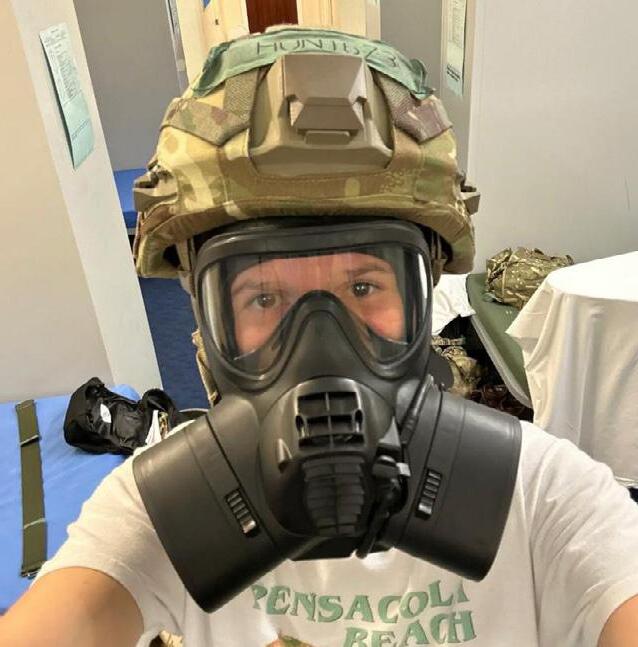

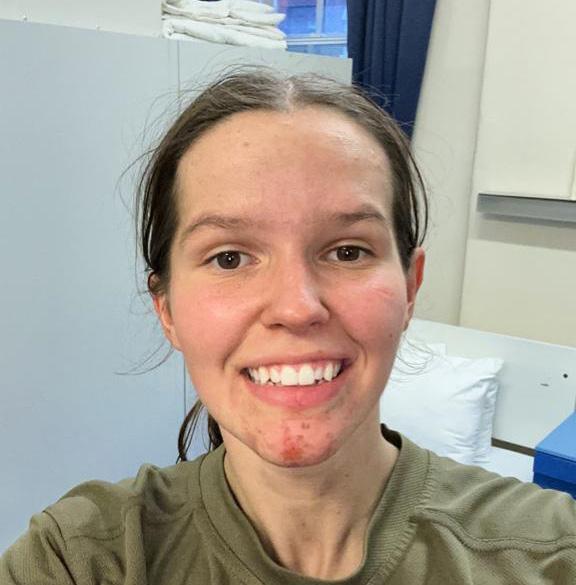

Molly’s training report describes her as ‘one of the top recruits’ with ‘strong leadership characteristics’.
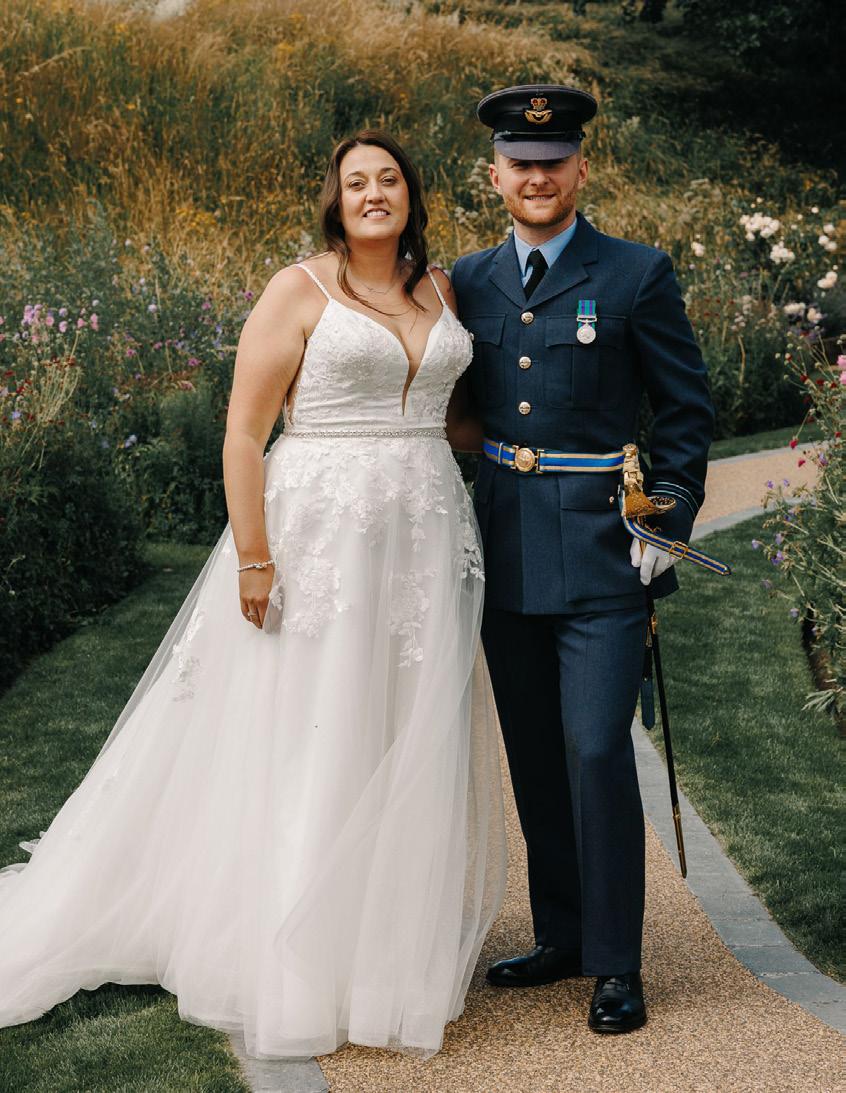
In the April 2019 issue of 1884 magazine we interviewed alumnus Guy Jessett, who joined the RAF to train as an Officer. Guy was a Kingsley Prep pupil from 1996 to 2000 and went on to complete his education at Warwick School.
Following his Officer training at RAF Cranwell and trade training as a Flight Operations Officer at RAF Shawbury, Guy completed a four-year posting at RAF Odiham, home of the iconic Chinook helicopters.
Now a Flight Lieutenant, Guy has recently moved to RAF Coningsby, where he has started working on a fast jet squadron.
The photo shows Guy and his wife Emily (also in the RAF) at their wedding blessing and reception in July 2023. Congratulations to the happy couple!

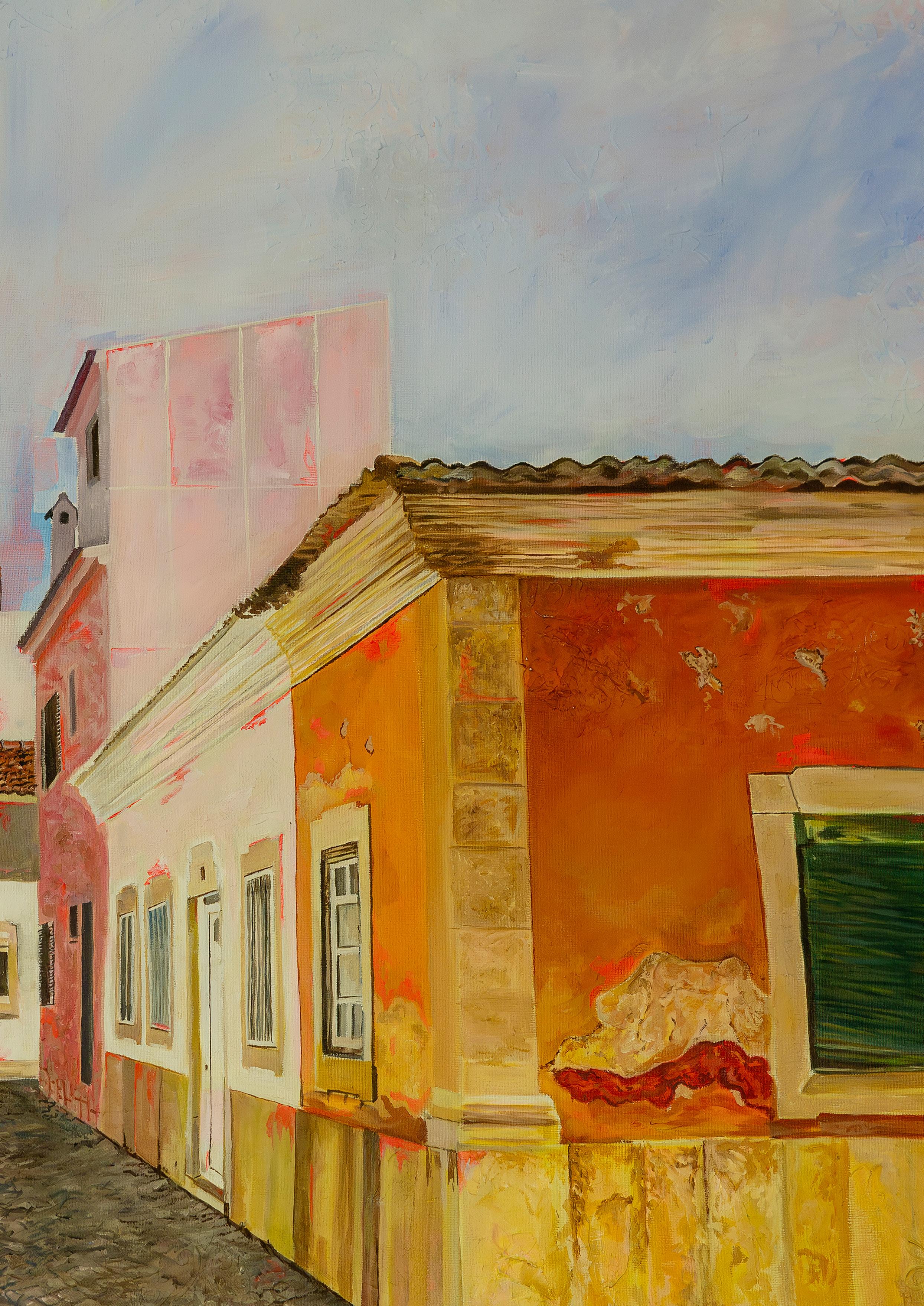
We were delighted to welcome Kingsley alumna Abi Lawson back to school at the start of the year
Abi was a student from 2016 to 2022. She joined in Year 7 and, after completing her GCSEs, studied English, Economics and Fine Art at A-level.
Abi is an accomplished artist. “Art has always been a passion of mine,” she says, “but it definitely grew and evolved during the course of my studies. My other A-level subjects were quite academic, so studying Fine Art forced me to relax and focus on something more creative. I think what I love most about making art is being able to see your progress – it’s so satisfying. Mr Lax was my teacher and mentor and key to my success; he was incredibly supportive, always offering new ideas and ways to improve my work. As an artist, it’s important to be open to and accepting of feedback because it’s how you improve. Equally, though, art is about self-expression and celebrating individuality, so it’s important to develop your own style.”
Abi produced a stunning set of oil paintings for her final A-level project, inspired by her travels and her interest in European architecture. The buildings featured in the paintings are all historic. “My project was about embracing their age and charm,” explains Abi, “and showing how buildings change through time. I used vibrant colours, including flashes of neon, to accentuate their beauty.” Abi admits that she isn’t a fan of modern architecture, commenting that “many new buildings lack character and are often carbon copies of one another”.
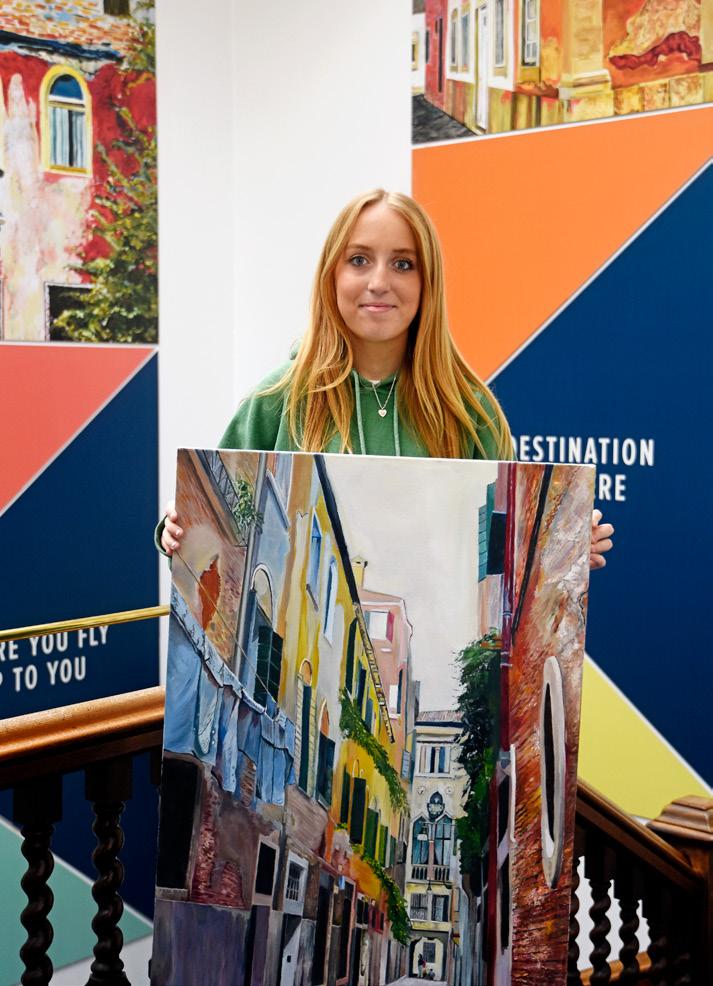
Abi and her paintings can be seen in our school film, ‘Learn. To Fly’ (more on page 42). They are also featured in a recently installed floor-to-ceiling display on the Senior School staircase. When asked how she felt on returning to school and seeing the display, Abi replies: “It’s an absolute privilege. The staircase is so iconic; it’s the first thing you see when you enter Beauchamp Hall, and it’s where everyone has their photo taken on the first day of Senior School. There’s something very fitting about my paintings, which celebrate historical architecture, being displayed in one of the most historic and beautiful parts of the school.”
Abi achieved two ‘A*s’ and an ‘A’ in her A-levels. She is currently studying Law at the University of Exeter and exploring various career paths, including solicitor roles and opportunities in government (in education policy or diplomatic roles). Although she hasn’t pursued art at university, she still enjoys sketching and painting in her free time. She is also making the most of city life and spending time with friends! Continued...
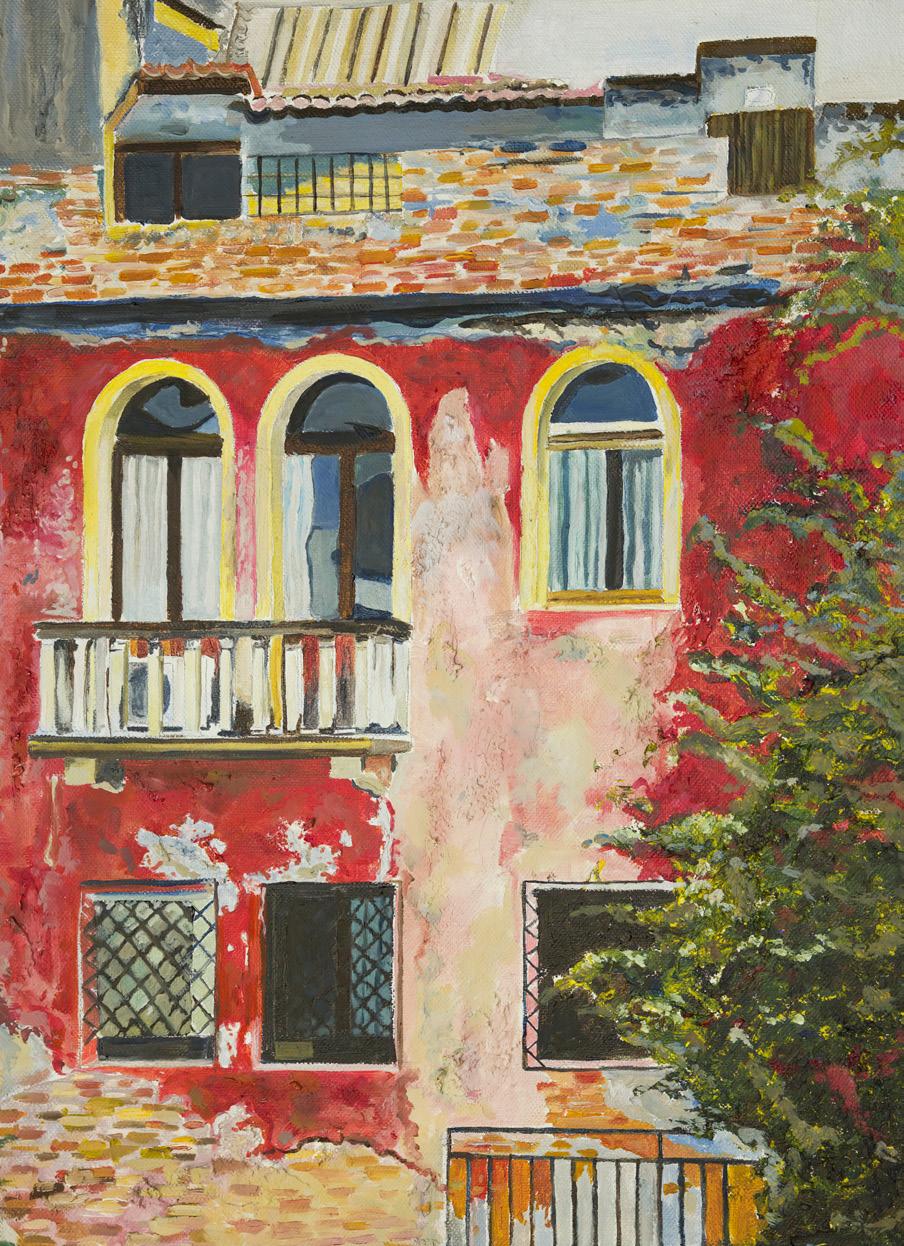
“There’s something very fitting about my paintings, which celebrate historical architecture, being displayed in one of the most historic and beautiful parts of the school.”
Abi Lawson

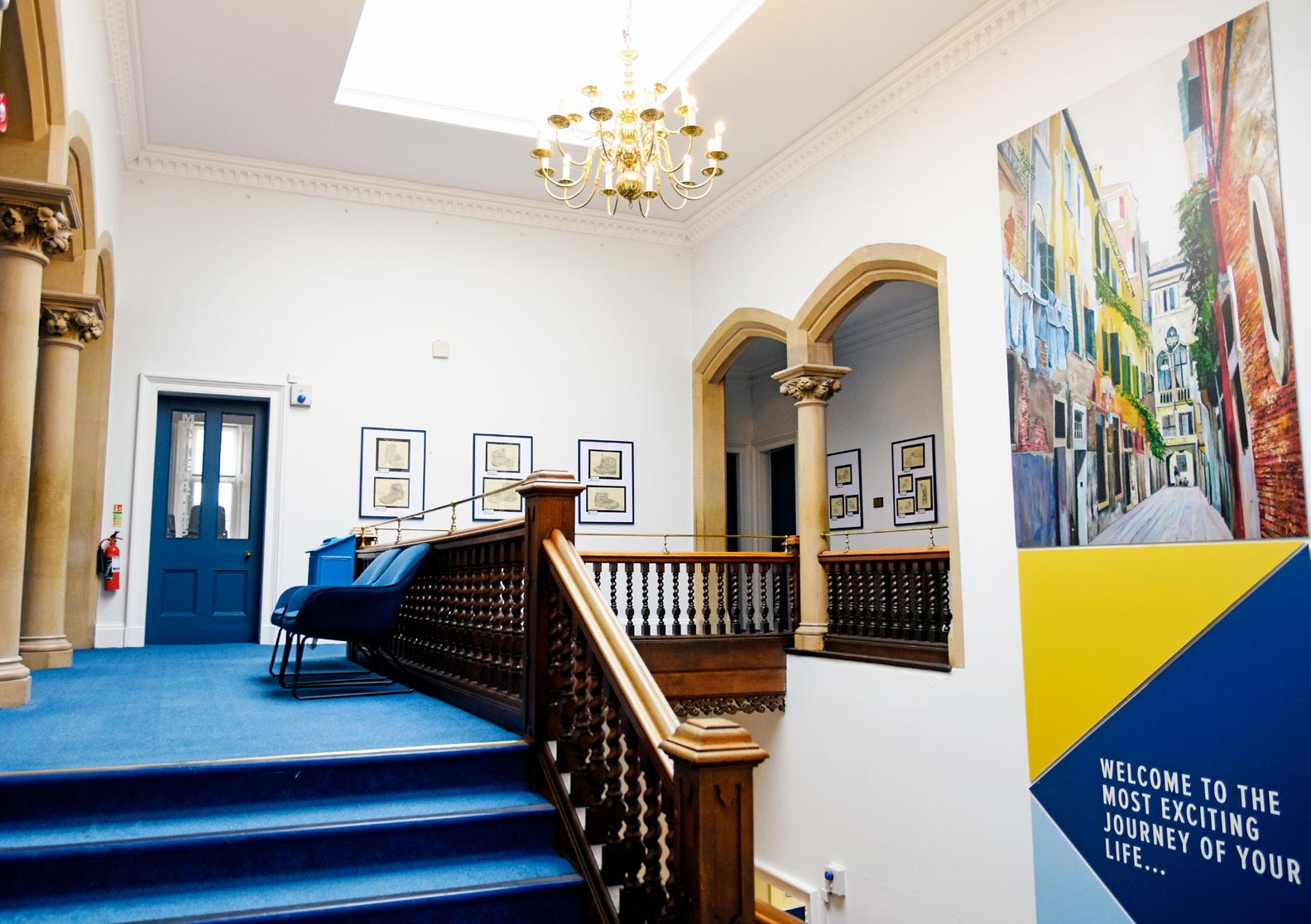

“Kingsley had such a nurturing environment which created a sense of belonging and empowerment. The school allowed us to explore our passions and discover our potential with confidence. My favourite memory is our trip to the west coast of America!”
Nikki Sohal, 2007-2014
Corporate Solicitor Bower Bailey
“I loved every single day of school and I really miss it. I was offered so much support, especially with my riding and competing.”
Keri Bishop née Bates, 2000-2006
Professional Dressage Rider and Trainer
Owner of Ekko Equestrian
“The fantastic friends I made are the most memorable part of my life at Kingsley. I’m very lucky to still see a lot of them, despite having left a couple of years (decades!) ago.”
Anna Morris née Liggins, 2000-2005
Contentious Trusts and Probate Solicitor
Shakespeare Martineau
Alumni share some favourite memories of their school days...
“Kingsley will forever hold a special place in my heart. I met a lot of my best friends there. I’m currently living with one of them in London!”
Amy Weatherall, 2015-2017
International Marketing Executive Fortnum and Mason
“I have many lovely memories from Kingsley. I was very sporty and took part in every sports team I could. My drama teacher, Mrs Walton, introduced me to my love of theatre, and my A-level art teacher, Mrs Davies, believed in me and inspired me to create a career in art. I have seven amazing friends who I met when I was 11. 25 years later, we are closer than ever.”
Philippa Downes, 1999-2006
Prop Modeller and Sculptor
Film and Theatre
“The school is incredibly supportive, but also challenges you to perform at your best.”
Georgie Green, 2014-2021
Politics and International Relations Student Exeter University
“I wouldn’t be where I am today without the adults who supported and taught me, in particular the incredible Mr Smith. One of my favourite Kingsley memories is the choir tour in Italy, performing in beautiful churches and even singing outside the Leaning Tower of Pisa!”
Phoebe Stewart, 2012-2015
Primary School Teacher
London
“I really enjoyed our fish and chip lunches on Fridays! I also loved science lessons with Mrs Bull and being in the school shows. I particularly remember playing the part of a very friendly green octopus!”
Guy Jessett, 1996-2000
Flight Lieutenant
The Royal Air Force
“My favourite memory of Kingsley is from a ski trip we went on. We walked from our hotel to a neighbouring hotel to use the swimming pool and, during the walk back, my hair froze solid!”
Jody Fletcher, 1989-1994
Founder
Chilli Promotional Products
“We were provided with so many extra-curricular opportunities, which gave us the skills to become well-rounded adults.”
Gemma Hotchkiss, 2014-2021
Music Student
Edinburgh University
“I loved my time at Kingsley, and I’m very lucky to still be in touch with many of my friends. My favourite memory is creating the Ski Team with Mr Edwards. It was extremely rewarding watching younger pupils throw themselves into a new sport and go on to achieve amazing things, including becoming National Champions!”
Freya Eaton, 2011-2017
Senior Account Executive
M&C Saatchi Sport and Entertainment
“Being at Kingsley from Reception to Sixth Form and enjoying the journey with my two sisters was amazing.”
Rebecca Inchley, 2004-2016
Brand Manager
Edmiston Yachts
